


























Just days after Kamala Harris soundly lost the presidential election, reports came out that millions of dollars were spent on celebrity endorsements. Oprah, though, has denied receiving $1 million from the Harris campaign, instead admitting that all the cash for the Harris promotional interview went to her media company. Other personalities also denied receiving money for their support of the Democrat candidate.
But regardless of if the money went directly to these actors and personalities or their businesses is semantics. It turns out that in order to garner copious amounts of admiration and adoration, Harris needed to pay these people lots of money.
And for what? Well, the campaign thought that if social media stars and celebrities endorsed Harris, then the American people would vote for Harris come election day. And they were shocked when they went to sleep on November 5 mourning a campaign instead of celebrating a victory.
But why were they so shocked? Don’t they know that people have their own minds and don’t trust everything they read on social media or hear from the celebrities?
Unfortunately, many people see social media as a trustworthy source. They believe much of what they’re told.
Well, consider this: last week, a report by UNESCO, the UN’s educational, scientific, and cultural organization, revealed that two-thirds of content creators fail to check the accuracy of their material, making them and their followers vulnerable to misinformation.
Shocking? It shouldn’t be. Social media influencers are generally not in the business of providing actual facts and news; most of them are there to generate a buzz and create and manage their huge following. More views means more influence; more influence means more money.
According to UNESCO, the most popular source for these creators was “personal experience/encounter” along with talking to people knowledgeable about a subject. It also found that four out of 10 creators cited the “popularity” of an online source – measured by the number of likes and views – as a key indicator of whether it was credible or not. In other words, there’s really no fact checking.
One thing that the election taught us is that some Americans are still using their own minds to make certain decisions. They are not trusting that a singer or actor – people very far from politics – should influence their decision on who their pick for president should be. That’s a heartening thought about the future of America.
But it’s also a wakeup call for many people who find that so much of their lives is spent scrolling through social media. There is a lot out there that is not verified. There are a lot of people out there claiming to be experts on subjects of which they are not authorities. Don’t just take their word for it. Do your own fact checking. Make your own decisions. Don’t allow them to manipulate your beliefs.
Have your own mind.
Wishing you a wonderful week, Shoshana

Yitzy Halpern, PUBLISHER publisher@fivetownsjewishhome.com
Yosef Feinerman, MANAGING EDITOR ads@fivetownsjewishhome.com
Shoshana Soroka, EDITOR editor@fivetownsjewishhome.com
Nate Davis
Editorial Assistant
Nechama Wein
Copy Editor
Rachel Bergida Shana Brecher
Lani White
Design & Production
Gabe Solomon Distribution & Logistics
P.O. BOX 266
Lawrence, NY 11559
Phone | 516-734-0858
Fax | 516-734-0857
Classified Deadline: Monday 5:00PM classifieds@fivetownsjewishhome.com text 443-929-4003
PAYMENT VIA CREDIT CARD MUST BE SUBMITTED ALONG WITH CLASSIFIED ADS
The Jewish Home is an independent weekly magazine. Opinions expressed by writers are not necessarily the opinions of the publisher or editor. The Jewish Home is not responsible for typographical errors, or for the kashrus of any product or business advertised within. The Jewish Home contains words of Torah. Please treat accordingly.













Dear Editor,
Back in my parents’ time, whenever singles wanted to meet, they did exactly that – they went out for coffee, a walk in the park, maybe dinner, or whatever else they deemed appropriate. They rarely contacted references, and there was for sure no such thing as a resume. They just simply went out.
I now watch parents from various walks of life and hashkafos – from Reform all the way to even yeshivish, in some cases – scratch their heads as they ask what on earth a shidduch resume is.
I was recently at a dating event where the husband explained two things that made sense to a lot of people:
1. Most shadchanim do it part-time with a fulltime job and/or family, so it’s overwhelming for them to follow-up with singles.
2. Today’s dating culture within the frum world makes even going out for coffee at a local cafe more complicated than necessary.
These days, unfortunately, people are concerned about a piece of paper that states where the siblings live, who they’re married to, where the parents work, which elementary school they attended 25 years years ago, and even questions about who the brother-in-law’s cousin’s grandparents’ friends are. Every tiny detail of the single you can think of is to be known about, like an FBI investigation. For all I care, the girl’s 50-year-old brother could be in jail for theft, and her 35-year-old sister can pick her nose every 20 minutes. I just care about marrying someone who is nice.
I’m sorry to say this, but I’ve heard too many cases of references lying or giving vague information, and shadchanim not willing to arrange a date with wellmeaning singles who simply wish to meet other nice people and live normal lives.
After getting far within my dating life myself due to this system, I decided
to take matters into my own hands and search for help from resources with some common sense.
One resource I found the other day was a singles WhatsApp group. Although it’s geared for those with connections to this out-of-town community, I figured I’d have nothing to lose, as they weren’t charging me and I can meet singles, not shadchanim.
The main cherry on top? An option to contact the singles directly, if they permit that.
Both the group administrator and I were in full agreement that today’s dating system is just too messed up, and such a revamped system she created was just genius!
Much hatzalacha to her!
Sincerely,
A single looking for common sense in the dating world
Dear Editor,
We all feel the pain of our brothers and sisters in Eretz Yisroel; families are mourning; people are missing; and the emotional trauma of those who were rescued is beyond comprehension. In sum, the physical and psychological wounds have hardly healed. Worse yet, our enemies around the world are using October 7th as a sword and a shield: they support Hamas and make us look like the agitators when we defend ourselves.
Out of the great sorrow of the oneyear plus since the horrific Simchas Torah attacks has come renewed hope: so much good and unity has emerged from our community. People are casting differences aside to work together in helping in whatever way we can. The donations, supplies, volunteerism and davening are truly beyond compare. Additionally, the lawsuits, stories and of course, kiruv that have emerged have
Continued on page 14


Continued from page 12 cast light over the darkness. People are connecting more to their Jewish roots. Let’s help them learn about the people and events of October 7!
In light of the above, why then have not some of the more chassidish and yeshivish communities brought in soldiers, family members of hostages or even some of the rescued hostages themselves to come and speak? Of course, I wish “kol hakavod” for those who have. I understand there are varying opinions about the State of Israel, rallies and protests, but where does it say a rescued hostage can’t speak at your shul or school?
I was privileged and enlightened to attend a number of lectures featuring soldiers, hostage families and rabbonim speaking about October 7: their experiences, the intricate halachos involved, and what they are doing to ensure this never happens again, rachmona latzlon. These voices should be amplified in more neighborhoods. No one township has a monopoly on such events. And those that have hosted, have seen a broad cloth of Jews who were moved and inspired by attending. Why not you? Why not now? None of the events I attended were held close to home: I walked or drove for miles. Each word hit close to home!
While any program would have to accommodate the sensitivities of a particular locale, I’m sure the same individuals who were brave enough to go to the press, shuls and events can come to your community as well. Additionally, separate events can be held for men and women. Despite varying schedules, costs and logistics, there is someone out there who can speak to your group. Perhaps a reservist from your neighborhood is back home from the war. A community member might be related to a hostage. It could very well be that the person next to you brought a lawsuit over post-October 7 antisemitism.
It is important to raise awareness of the current matzav, bring forth hope based on the good work being done on behalf of acheinu kol beis Yisroel, and to raise the scepter of Hashem’s crowning glory through achdus. In this way, the hostages will b’ezras Hashem be rescued soon, their wounds healed, and all of us will be reunited with the coming of Mashiach soon.
Chaim Yehuda Meyer
Dear Editor,
Did you ever think that opening the Gemara can take away your headache? So says the Gemara in Eruvin (54a).
But how do you open it and how does it work? Any first step is nearly impossible. Having the fortitude to start is the greatest challenge in life. But as one
rav said, where does the Torah give an exemption to a person just because they are not in the mood to learn? Once the Gemara is cracked open, you delve into the most sophisticated body of thought that captures the mind with all its faculties. No room is left to feel anything else, no less a headache.
This is how Rav Ovadia Yosef could tell his surgeon to begin cutting without anesthesia, once he saw Rav Ovadia engrossed in the page.
The benefits are not merely an absolution from pain but an accumulation of thousands of mitzvos, as the Chofetz Chaim tallied the math of each word of Torah.
Vayetzei, take a step, go out of your pain, and into the page for incalculable eternity. Steven Genack
Dear Editor,
We have been part of a group of local residents who have been volunteering at the Israel Chesed Center for the past 13+ months. We are writing to express our appreciation to The Jewish Home for your coverage of the Chesed Center and its events.
As long-time residents of the 5T/FR community, we have seen all of the changes in the community over the years, and have benefited from its growth as an Orthodox community and the slew of organizations that have emerged to assist our neighbors and friends. Hatzalah, Achiezer, a myriad of shuls and schools, the Chevra Kadisha and various other entities are all amazing, yet typically they are manned by a small group of volunteers who are skilled in a specific discipline.
The Israel Chesed Center has emerged as a place where everyone – from young children to senior citizens – can engage in myriad acts of chesed that stretch over 6,000 miles, all the way to Eretz Yisrael!
But more than that…. The Chesed Center is for every member of our community, regardless of “hashkafa,” nusach, level of observance or experience in Jewish communal matters. In our years in this wonderful neighborhood, there has never been an organization that has created, fostered and cultivated achdus in our diverse community like the Chesed Center has.
There is something for everyone at the Chesed Center – packing gear, running an event, sending encouragement from afar, all in an effort to support chayalim, widows and orphans, displaced families and any Jew who has been impacted by the War. Join us at the Chesed Center to truly feel that you are part of the War Effort!
Yours truly,
Sheila and Alan Shapiro Aviva and Zev Golombeck



After nearly four years of few developments, the international spotlight is now back on the civil war in Syria, which pits the country’s government against rebel forces.
An unforeseen and speedy advance led the rebels to invade parts of northern and central Syria, taking over most of Aleppo, the northern city which, eight years ago, was strongly defended by President Bashar al-Assad’s army. But over the weekend, the Syrian army was unable to protect the invaded regions, with most soldiers fleeing, allowing the rebels to march forward, taking over Aleppo.
The opposition’s successful advance can be attributed to several factors. Russia, Iran, and Hezbollah – three of the Syrian president’s top allies – have been distracted by their own wars and have been unable to support the Syrian government. Additionally, the rebels, many of whom are backed by Turkey, have regrouped, reorganized, and retrained to strike harder than before.
According to experts, Turkey likely authorized the attack but refrained from directly supervising or helping the cause with planning.
“The principle of the armed operation was expected for one or two months, and the fact that they launched military hostilities is not surprising at all,” said International Crisis Group senior analyst Jerome Devron. “What was less expected is how quickly the regime troops fell.”
Syria Report’s editor, Jihad Yazigi, noted that, over the past few years, Assad’s army, business community, and “loyalist base” have started to gradually fade away as dissatisfaction with the Syrian president rises. Many people have quit their government jobs to
work in Syria’s Kurdish and oppositioncontrolled regions.
“It doesn’t mean I was expecting any type of revolt in regime areas,” Yazigi said.
“Fundamentally, there is a conviction in Syria, among Syrian society, that there is a decision by the international community to keep Bashar in power [partly because of fear of his alternative].”
At times, the United States and Persian Gulf states have also sided with some of the rebel groups.
“Keep in mind that for many years, the Syrian government has been engaged in a civil war backed by three main players: Iran, Russia and Hezbollah. All three of those players have been distracted and weakened by conflicts elsewhere,” explained Jake Sullivan, the U.S.’s national security adviser. “So it’s no surprise that you see actors in Syria, including the rebels, try to take advantage of that. And that’s exactly what they’ve done over the last several days.”
Iran is a close ally of Syria. Still, Iran’s next moves are unclear. Syria is strategically important to Tehran, but losing Aleppo might not be the end of the world in Iran’s eyes.
“Is his [Assad’s] regime going to collapse tomorrow? Probably not. And Aleppo is not really key to Iran’s core interests in Syria,” noted Mohammad Ali Shabani, editor of Amwaj.media, a news website about Iran, Iraq, and countries in the Arabian Peninsula. “Aleppo is important, but can Iran afford to say it’s going to sit this one out for a little bit, let Assad sweat before he comes back to them and begs? Can it afford that? I think yes.”

Sunday marked protesters’ fourth consecutive night demonstrating in Tbilisi, the capital of Georgia.
The country, currently ruled by the Georgian Dream party, saw protests in response to the government’s decision to pause talks for four years regarding joining the European Union. Critics of the ruling party have claimed that its policies are anti-Western and proRussian, though Georgian Dream says it is only working to preserve the country’s



sovereignty under the assumption that the former Soviet state’s joining of NATO or the E.U. would provoke Russia.
In response to the protests, police fired tear gas and water at the thousands of pro-EU demonstrators who, on Sunday night, blocked an access road in Georgia’s main commercial port in Poti, a Black Sea city. Protests hit eight or more cities and towns, according to the media.
Dmitry Medvedev, a former Russian president who now serves as a Kremlin security official, said the protests were troubling, adding that Georgia was “moving rapidly along the Ukrainian path, into the dark abyss. Usually this sort of thing ends very badly,” he warned.
In response to Georgia’s treatment of protesters, the Biden administration on Saturday paused the U.S.’s strategic partnership with Georgia, a move Kobakhidze calls “temporary.” He added that Georgia would speak with Presidentelect Donald Trump’s incoming U.S. administration.
Irakli Kobakhidze, the prime minister of Georgia, brushed off the United States’ condemnation of Georgian police’s use of “excessive force” against protesters.
“Despite the heaviest systematic violence applied yesterday by the violent groups and their foreign instructors, the police acted at a higher standard than the American and European ones and successfully protected the state from another attempt to violate the constitutional order,” declared Kobakhidze.
Georgian President Salome Zourabichvili, an outspoken opponent of Georgian Dream, said she would insist on remaining in power at the end of December, even though her term is ending. She called the elections in October, which saw her voted out, rigged and illegitimate.
Kobakhidze said that while he understood the president’s “emotional state,” she will on December 29 still “have to leave her residence and surrender this building to a legitimately elected president.
Last week, China freed three American prisoners and the United States released four individuals to China.
China, in its statement on Thursday, said that three of the Chinese citizens released by the U.S. had been imprisoned for “political purposes.” The fourth individual, Beijing added, was a U.S.
resident wanted by China for crimes. Those released from the U.S. were not named, while the prisoners freed by China were identified as Mark Swidan, Kai Li, and John Leung.
Swidan, Li, and Leung were, according to the U.S., wrongfully detained, with Li and Leung facing espionage charges and Swidan facing a death sentence for allegations of drug use. The three returned to the United States late Wednesday night, having been brought by plane to a military base in San Antonio, Texas.
Just two months ago, China also released Californian pastor David Lin, whom Beijing imprisoned for twenty years for contract fraud.

On Thursday, President Joe Biden said he talked with the three men and was “really happy they are home.” Their release was also praised by lawmakers on both sides of the political spectrum, including by Republican Texas Sen. Ted Cruz, whose state is home to Swidan’s mother. Cruz attributed their release to senior Biden administration official’s efforts.
Chuck Schumer, the Democratic Senate Majority Leader, was particularly invested in freeing Li, a Chinese immigrant and businessman living in New York who was arrested in September 2016 during a trip to Shanghai. China accused Li of giving state secrets to the FBI and sentenced him to ten years in prison, a decision that his family called politically motivated.
Last year, China accused Leung of spying after arresting him in 2021. His arrest prompted the United States to put into effect a level three travel warning against U.S. citizens traveling to China due to the “risk of wrongful detention.” On the day of the three men’s release, the U.S. lowered the travel warning to level two, declaring that Americans should still “exercise increased caution” in China because the government “arbitrarily enforces local laws, including exit bans on U.S. citizens and citizens of other countries, without fair and transparent process under the law.”
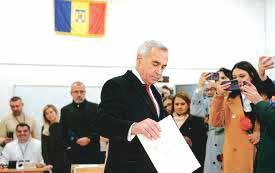
Romania held its parliamentary election on Sunday, right in the middle of the first and second rounds of the country’s presidential election. The presidential election’s first round was mired in controversy, hitting Romania with allegations of Russian interference and electoral violence.
Sunday’s vote determined the prime minister, the new government, and the 466-seat legislature’s formulation. A week before, the country held its first round of presidential elections, which saw 62-year-old Calin Georgescu, a controversial far-right candidate, win a few points more than Save Romania Union’s Elena Lasconi, a reformist. On December 8, Georgescu and Lasconi will have a rematch.
Many credit Georgescu’s sudden rise in fame to his popularity on TikTok. Critics of the presidential candidate, who perceive Georgescu as a threat to democracy, have accused him of commending Romanian fascists and Russian President Vladimir Putin.
Moreover, the results of the first round suggest that the Romanian public is moving more towards anti-establishment parties that believe in populism, as the country battles rising inflation and the cost of living and its economy suffers.
Bucharest-based think tank Expert Forum alleged that, prior to the first round, Georgescu’s TikTok account saw a “sudden and artificial” rise in popularity, “similar to his polling results.” Georgescu declared zero campaign spending.
Last Thursday, the top defense body in Romania said that TikTok gifted “a presidential candidate benefited from massive exposure due to preferential treatment,” in reference to Georgescu, adding that Romania, a member of NATO and the European Union, has become “a priority target for hostile actions” by Russia. Moscow claims it didn’t interfere with the election.
Romania conducted a recount of all 9.4 million votes, which was approved by the Constitutional Court after a presidential candidate who garnered 1%
of the vote claimed that Lasconi’s party violated campaign laws.
“The impact of the surprise in last Sunday’s presidential election will be significant, and we are going to wake up in a new political reality,” declared Bucharest-based political consultant Cristian Andrei. “Georgescu voters will speak again and will reshape how we look at the political Romanian spectrum from now on and probably forever… The most probable scenario will be a difficultto-build majority in the parliament to support and endorse a new government.”
The president of Romania can make decisions related to foreign policy and national security. The prime minister, on the other hand, leads the government.
“I voted for peace, not for war, for respect, for total political responsibility, dedicated totally to Romanian people,” said Georgescu after the vote. “I voted for Romania, along with Romania, forever for Romania.”

The United Kingdom’s parliament engaged in an emotional debate on the legalization of assisted dying, leading lawmakers to vote on the issue last Friday.
In the end, the parliament voted 330 to 275 to allow doctors, under certain conditions, to assist terminally ill patients with prematurely dying. Before the legislation is put into law, it must first be approved by parliamentary committees and could potentially be amended.
Nevertheless, the move is a big one. According to some, it’s similar in magnitude to the U.K.’s decision to legalize abortion in 1967 and end capital punishment in 1969. If approved, the law would be put into effect in England and Wales but not in Scotland, which might enact its own legislation on the issue.
Several conditions must be met for assisted dying to be legal in the UK. The patient must be older than eighteen, and they must be terminally ill and have six or fewer months to live. Additionally, each case must be approved by two doctors and a judge, and the patient must be the


one to administer the fatal drugs.
In Canada, New Zealand, ten states in the U.S., Washington, D.C., and several European countries assisted dying is legal.
Although the bill was proposed by Kim Leadbeater, a member of the Labour Party, members of parliament voted according to their conscience, not their party. Those in favor of the bill believe that assisted dying is a merciful way of sparing terminally ill patients from
suffering and painful deaths.
“This is not some slippery slope,” said Peter Prinsley, a Labour lawmaker and surgeon. “We are shortening death, not life, for our patients. This is not life or death; this is death or death.”
Those against the bill believe that the legalization of assisted dying could unfairly pressure some people into prematurely ending their lives.
“People often recognize coercion only after years have passed, yet within
Service. He added that due to the unavailability of care, some patients might feel that assisted dying is their only choice.
According to polls, 65% of British citizens believe that assisted dying should be legal with strings attached, while 13% are against its legalization. Many religious leaders have voiced their opposition to the bill.
Prime Minister Keir Starmer voted in favor of the bill, as he did in 2015 when parliament voted against the legalization of assisted living in a 330 to 118 vote. Currently, those who help a terminally ill individual prematurely end their life can be questioned by police and may be prosecuted.

President Yoon Suk Yeol of South Korea declared emergency martial law Tuesday night, then reversed himself hours later as thousands of protesters flooded the streets, capping an extraordinary night of tumult in the deeply divided country.
The threat of military rule had brought political chaos to one of America’s closest allies in Asia and carried echoes of South Korea’s postwar years of military rule and political violence.
But Yoon’s gambit appeared to quickly backfire, leaving his political future uncertain and the opposition baying for his impeachment.
a month someone could be dead,” said Labour lawmaker Rachel Maskell, a former senior physiotherapist. “Malign coercion cases may be few, but as a clinician working at the fringes of life, I heard my patients frequently say, ‘I don’t want to be a burden,’ or ‘I’d rather the money went to the grandchildren than on my care.’”
Health Secretary Wes Streeting claimed that assisted living would be costly to the U.K.’s National Health
His announcement imposing martial law, at 10:30 p.m. Tuesday, had immediately raised questions over whether the president could commandeer such a highly developed industrialized democracy.
Before dawn Wednesday, those questions appeared to be answered.
The National Assembly quickly passed a resolution demanding an end to martial law, and Yoon backed down, saying he would lift his emergency declaration just 5½ hours after he had issued it.
Martial law was formally lifted at a Cabinet meeting early Wednesday. Yoon did not immediately comment



on his political future, only reiterating his demand that the opposition stop using its parliamentary majority to “paralyze” his government.
But opposition lawmakers demanded that he step down, calling his martial law “unconstitutional” and a “failed coup.”
The National Assembly can impeach the president if more than two-thirds of the Assembly vote for it. Yoon’s party controls just 108 seats in the 300-member legislature. Thousands of people have held weekend rallies in downtown Seoul in recent months, calling for Yoon’s impeachment, accusing him of incompetence, corruption and abuse of power.
The martial law declaration Tuesday night had sent thousands of protesters into the frigid night, gathering at the National Assembly building and chanting for the president’s arrest and removal. Chaotic scenes captured on video showed military vehicles thronged by protesters and South Korean troops climbing through windows to enter the National Assembly where opposition politicians were gathering.
The lawmakers, in a swift rebuke of the president’s order, then adopted a resolution demanding that martial law be lifted. The South Korean act on martial law states that if the assembly demands an end to it, the president must lift it “without delay.” (© The New York Times)

Cyclone Fengal killed at least 20 people in India and Sri Lanka and caused extreme flooding in Tamil Nadu state and the Puducherry region after crossing India’s southern coast from the Bay of Bengal on Saturday.
Puducherry had been hit by the heaviest 24-hour rainfall in 30 years, India’s weather office said on social media on Sunday.
The cyclone left parts of the southern city of Chennai inundated. Flights from the city were temporarily suspended on Saturday but had resumed as of early Sunday morning.
In Sri Lanka, 16 people were killed, with heavy rains affecting a total of
138,944 families, the latest data from the Disaster Management Centre in Colombo showed.
A cyclone is a tropical storm with winds blowing in a large spiral around a relatively calm center known as “eye.”
The eye can extend up to 50 km, and the hurricane winds and rain may extend outward by hundreds of kilometers.

This week, China said it would begin banning the export of some rare minerals to the United States. The move is an escalation of the tech war between the world’s two biggest powers and comes a day after the Biden administration tightened Chinese access to advanced American technology.
Sales of gallium, germanium, antimony and other materials to the United States would be halted immediately on national security grounds, China’s Ministry of Commerce said, citing the minerals’ use for military purposes. The export of graphite would also be subject to stricter review.
China produces almost all the world’s supply of critical minerals needed to make advanced technologies such as semiconductors. Beijing has been tightening its grip on the materials, in retaliation for U.S. export controls.
In October, China began requiring its exporters to disclose, step by step, how the minerals would be used in Western supply chains.
On Monday, the Biden administration expanded its curbs on technology to China by prohibiting the sale of certain types of chips and machinery and adding more than 100 Chinese companies to a restricted-trade list. The move was the third significant action in the past three years in the Biden administration’s bid to prevent China from catching up to the United States in cutting-edge technologies.
China criticized the latest move by the United States, calling it “illegal.”
“Such practices seriously undermine the international economic and trade
order, disrupt the stability of global production and the supply chain, and harms the interests of all countries,” said Lin Jian, a spokesman for China’s Ministry of Foreign Affairs.
Chinese industry groups urged Chinese companies to purchase more chips within China or from countries other than the United States.
“American chip products are no longer safe and reliable, and related Chinese industries will have to be cautious in purchasing American chips,” the China Semiconductor Industry Association said.

Prime Minister Michel Barnier of France faces a no-confidence vote this week after he pushed through a budget bill without a final parliamentary vote Monday, making a government collapse increasingly likely.
The move angered opposition parties, and lawmakers from both a left-wing alliance and Marine Le Pen’s far-right National Rally party swiftly filed motions for no-confidence votes. They are expected as early as Wednesday.
That prospect of the government’s falling — and worries that France might not pass a budget by year’s end — have rattled financial markets, sharply increased the country’s borrowing costs and further deepened the turmoil that has gripped the country since snap elections last summer yielded no clear parliamentary majority.
Barnier, a veteran center-right politician, used a constitutional provision to push the bill through without a vote because, despite a series of concessions, he could not win approval from Le Pen, who has played the role of kingmaker since the snap elections last summer. His own coalition of centrists and conservatives did not have enough votes to pass the budget bill.
Barnier and his Cabinet, both appointed by President Emmanuel Macron just three months ago, are now on borrowed time. If they fall this week — as many expect — they will become
the most short-lived government in the history of France’s Fifth Republic, which was founded in 1958, and the first to fall to a no-confidence vote since 1962.
Macron will remain as president, but he will need to appoint a new prime minister mere weeks before a constitutionally mandated deadline of Dec. 21 to finalize next year’s budget. That would throw the country into uncharted political, legal and economic territory.
The legislation that was to be considered Monday is a social security bill, one of three different budget bills that are currently making their way through Parliament.
Barnier made some concessions to Le Pen. He announced that he was scrapping an increase in electricity taxes and reducing health care coverage for people in the country without legal permission. On Monday, just hours before a potential vote, Barnier made another gesture to Le Pen by promising that the government would not reduce medication reimbursements.
But it was not enough.
“Mr. Barnier didn’t want to respond to our 11 million voters,” Le Pen told reporters at the lower house, where she is a lawmaker. “So everyone must shoulder their responsibilities.” (© The New York Times)
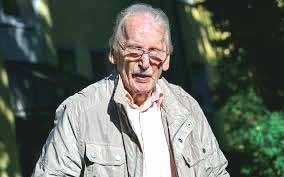
Gregor Formanek, 100, is being accused of aiding and abetting the murder of 3,300 people while working as a guard at the Sachsenhausen concentration camp, near Berlin, during World War II. Now, Formanek will be facing justice. Earlier this year, a German regional court suspended the proceedings against the Nazi guard due to a “permanent inability to stand trial.” This week, a higher court overruled the ruling, which opens the door to a trial in the near future.
Formanek is suspected of playing a role in the “cruel and insidious” murder of thousands of prisoners at Sachsenhausen between July 1943 and February 1945. A later document drawn up by the



East German Stasi secret police notes that Formanek, who was a teenager at the time of the alleged offenses, “continually killed prisoners.”
Formanek was charged in August 2023 when he was 98 years old.
Since 2011, Germany has been prosecuting ex-Nazis for crimes they committed decades ago, with prosecutors racing against time to secure convictions before the defendants die of old age.
Sachsenhausen was used by the Nazis to imprison political prisoners, Jews, Soviet soldiers, gypsies and Roma people. Tens of thousands of people were murdered by the SS, either by execution, forced labor, starvation or medical experiments.
It would not be the first time a centenarian former Nazi is put on trial in Germany. In 2022, Josef Schütz, then 101, was found guilty of complicity in mass murder at Sachsenhausen. Though he was given a five-year prison sentence, he appealed against the verdict and died in April 2023 without spending time behind bars.
Oskar Gröning, the so-called bookkeeper of Auschwitz, also escaped jail time as he filed a series of appeals and then died in 2018 while they were still being processed by the courts.

Real estate tycoon Truong My Lan was convicted in Vietnam in April of embezzlement and bribery amounting to $12.5 billion, equivalent to 3% of the country’s GDP. She had been the chairperson of the Van Thinh Phat real estate firm and illegally controlled Saigon Joint Stock Commercial Bank between 2012 and 2022, allowing 2,500 loans that cost the bank $27 billion in losses. Lan was sentenced to death for her crimes.
This week, a court upheld the death sentence but said it could be commuted to life in jail if she reimburses around $11 billion, or three-fourths of what she defrauded in the country’s biggest financial crime.
Lan’s lawyers argued that she had

repaid the money but the court disagreed since there were legal issues with some of the seized properties and prosecuting agencies couldn’t assess their value.
Lan’s lawyers also noted several mitigating circumstances — she had admitted guilt, showed remorse and had paid back part of the amount.
“I feel pained due to the waste of national resources,” she said last week, according to state media.
But the court noted that Lan’s actions were not just personal. The fraud had negatively impacted banking, caused public disorder and eroded people’s trust.
Lan’s arrest was among the most high-profile in an anti-corruption drive in Vietnam that intensified after 2022. The so-called Blazing Furnace campaign touched the highest echelons of Vietnamese politics.
Lan, 67, and her family had set up the Van Thing Phat company in 1992. The company grew into one of Vietnam’s richest real estate firms, with luxury residential buildings, offices, hotels and shopping centers. This made her a key player in the country’s financial industry.
The scale of Lan’s crime meant the case was split into two trials, and Lan was sentenced to another life sentence in October. At that trial, she was accused of raising $1.2 billion from nearly 36,000 investors by issuing bonds illegally through four companies, state media reported. She was also found guilty of siphoning off $18 billion obtained through fraud and for using companies controlled by her to illegally transfer more than $4.5 billion in and out of Vietnam between 2012 and 2022.
Middle East priorities include ending the wars and expanding the Abraham Accords, an agreement that normalized relations between Israel and the United Arab Emirates, Bahrain, and Morocco.

Boulos played a major role in boosting Trump’s appeal among Arab and Muslim Americans, thus helping the presidentelect win Michigan, a state that voted for President Joe Biden in 2020.
Boulos has also been a channel between Trump and Mahmoud Abbas, the president of the Palestinian Authority. Boulos transmitted a letter from Abbas to Trump, in which the Palestinian leader condemned the assassination attempt against Trump in Butler, Pennsylvania. In September, Boulos met with Abbas in person on the sidelines of the U.N. General Assembly. And in November, he organized a phone call between Abbas and Trump – their first call in seven years.
Boulos is a “highly respected leader in the business world, with extensive experience on the international scene,” declared Trump on Truth Social.
“He has been a longtime proponent of Republican and Conservative values, an asset to my Campaign, and was instrumental in building tremendous new coalitions with the Arab American Community,” Trump added. “Massad is a dealmaker and an unwavering supporter of PEACE in the Middle East.”
Donald Trump, the former and nowincoming president, selected his senior advisor on Arab and Middle Eastern affairs on Sunday. His choice was the father-in-law of Trump’s daughter Tiffany, Massad Boulos.
In Trump’s future administration, Boulos is expected to work closely with Arab countries, while Trump’s special envoy for the Middle East, Steve Witkoff, will likely focus on Israeli affairs. Trump’s
Boulos was born in Lebanon and has ties both to allies and enemies of Hezbollah. As a teenager, he immigrated to the United States, where he attended the University of Houston. He became a lawyer and, eventually, a billionaire with major business dealings in Nigeria.
Recently, Trump picked another one of his children’s in-laws to serve in his administration. The president-elect selected Charles Kushner, the father of Jared Kushner, Trump’s son-in-law, to be the U.S. ambassador to France.
On Monday, the Israel Defense Forces confirmed the death of Cpt. Omer Maxim Neutra, a soldier who was among the 251





people kidnapped during the October 7 massacre. Until now, authorities believed that Neutra was alive in Gaza. Neutra, 21, was the tank platoon commander in the 7th Armored Brigade’s 77th Battalion. When Hamas stormed southern Israel, he was stationed near Kibbutz Nahal Oz in a tank on the border. After getting attacked by terrorists with explosives and RPG fire, he, along with Sgt. Shaked Dahan, the driver, Sgt. Nimrod Cohen, the gunner, and Sgt. Oz
Daniel, the loader, was kidnapped.
In November 2023, Israel confirmed Dahan’s death. Daniel’s death was confirmed in February. And now, the Military Rabbinate has declared Neutra’s death based on findings and new intelligence information. It is unclear whether Cohen is still alive. However, Cohen’s father said on Monday, “We have received indications that Nimrod is alive. I am sure my son is alive, and I am fighting.”
working non-stop doing anything and everything possible to bring Omer home alive. It was an unimaginable nightmare to be acting based on the hope that he was alive, despite having little information or signs of life since he was seen on video being taken on October 7.”

Omer’s parents, Orna and Ronen, said their beloved son was a natural leader “who made others around him better with his warmth and ability to engage and encourage others to be their best.”
They added, “The grief is heavy. Sadly, time has run out to bring Omer home alive and words alone have no power to comfort.”
Leadership will only be revealed in actions and results going forward, the Neutras wrote.
“We call upon the Israeli government to work with President Biden and President-elect Trump, to use all of their leverage and resources to return all 101 hostages — living and the deceased — to their families as soon as possible.”
Prime Minister Benjamin Netanyahu sent his condolences to Neutra’s family, promising to recover his remains for burial in Israel.
“Omer was a man of values, blessed with talents and a Zionist in every sense of the word,” said the premier. “He immigrated to Israel to enlist in the IDF, chose a combat path and was chosen to command and lead.
“[Israel] will not rest or be silent until we return him home for a Jewish burial, and we will continue to act resolutely and tirelessly until we return all of our hostages,” Netanyahu added.
A sports fanatic who headed his high school’s basketball, volleyball, and soccer teams, Neutra grew up in Long Island, New York. Though he initially planned to attend Binghamton University, he decided to spend a gap year in Israel in 2020, after which he elected to join the IDF. His parents last spoke to him on October 6, 2023.
On Monday afternoon, Omer’s family released a statement: “Over the past 423 days – nearly 14 months – we have been
Omer’s parents, Orna and Ronen, spoke about their son at the Republican National Convention a few months ago, urging the U.S. and Israel to work tirelessly for the safe release of their son and the other hostages.
In a statement responding to the news, President Joe Biden said he was “devastated and outraged.”
“A Long Island native, Omer planned to return to the United States for college. He dreamed of dedicating himself to building peace,” the president said.
He recalled meeting Omer’s parents last month at the White House where they again shared their story. “They told me



how Omer’s grandparents were Holocaust survivors and how their family’s strength and resilience has been carried through the generations,” Biden said.
“To all the families of those still held hostage: We see you. We are with you. And I will not stop working to bring your loved ones back home where they belong,” Biden pledged.
On October 7, 2023, 251 people were kidnapped by Hamas and brought into Gaza. Now, 97 remain in Gaza, 35 of whom are believed to have died in captivity. There are three Americans who are still being held hostage who are believed to be alive: Edan Alexander, Sagui Dekel-Chen and Keith Siegel. The bodies of four other Americans — Omer, Judith Weinstein, Gadi Haggai and Itay Chen — are still being held in Gaza.

On Friday, a Hamas terrorist shot at a civilian bus in Gitai Avisar Junction, which is near Ariel, a village in Judea and Samaria, injuring eight or more people.
Three people sustained serious injuries, including Hassan Elsachen, the bus driver. One was moderately wounded. Four people sustained light injuries after being hit by broken glass, according to the Magen David Adom ambulance service. Of those injured, four were soldiers.
The attack was claimed by Hamas’ military wing, the Al-Qassam Brigades, who identified the terrorist as Samir Muhammad Ahmad Hussein, a 46-yearold Einabus resident who was one of the Brigades’ members. Security forces shot Hussein dead at the scene of the crime.
The Israel Defense Forces suspect that a third party provided the terrorist with the M-16 assault rifle and car that he used. However, the IDF does not believe that there was a second terrorist involved since no one was found after the military scanned the area.
Initial investigations into the attack indicate that Hussein arrived from Nablus, driving through Tapuah Junction to Gitai Avisar, where there are no internal checkpoints. Around 150 meters
away from a bus stop, Hussein parked his vehicle. As he walked towards the bus, he began shooting with his assault rifle. He was quickly eliminated by nearby IDF troops.
Since the October 7 massacre, when Hamas invaded southern Israel, murdering 1,200 Israelis and kidnapping 251 others, Judea and Samaria has seen a significant rise in violence.

This week, President-elect Donald Trump threatened those holding hostages in the Middle East with unprecedented American firepower if they are not released by the time he enters office on January 20.
“Everybody is talking about the hostages who are being held so violently, inhumanely, and against the will of the entire World, in the Middle East – But it’s all talk and no action!”
Trump wrote on Truth Social.
He added, “Please let this TRUTH serve to represent that if the hostages are not released prior to January 20, 2025, the date that I proudly assume Office as President of the United States, there will be ALL [HECK] TO PAY in the Middle East, and for those in charge who perpetrated these atrocities against Humanity,” he continued.
“Those responsible will be hit harder than anybody has been hit in the long and storied History of the United States of America. RELEASE THE HOSTAGES NOW!” Trump added.
The post was made just two days after Hamas released a propaganda video showing American-Israeli Edan Alexander pleading to be released. It was also made just hours after the IDF announced that American-Israeli Omer Neutra – who had been believed to have been alive and had been held hostage for over a year – had died on October 7, 2023. His body is being held by terrorists in Gaza.
Prime Minister Benjamin
Netanyahu’s wife Sara said she raised the plight of the hostages during her dinner on Sunday night with Trump at the president-elect’s golf resort in Florida.
Supposedly, the Biden administration is still working to secure a deal before January 20. U.S. President Joe Biden met with the families of the remaining American hostages last month in the Oval Office.
“I don’t care if Trump gets all the credit as long as they come back home,” Biden told the families during the meeting, according to one of the family members in the room.
After securing a ceasefire between Israel and Hezbollah last week, Biden said he would launch another effort to secure a similar deal in Gaza, by leaning on Turkey, Qatar, and Egypt, which all have ties with Hamas, in order to lean on the terror group to agree to a deal.
National Security Advisor John Kirby said during a Monday press briefing that Hamas remains “the main stumbling block.”
But Arab mediators insist that Netanyahu has been holding up talks.
The family of Omer Neutra, the American-Israeli hostage whose death was announced by Israel on Monday, said words alone would not bring them comfort and called on the leaders of Israel and the United States to act to bring home the remaining hostages.
“In the 423 days since October 7, we expected our leaders to demonstrate the same courage displayed so bravely by Omer and rise to the occasion on behalf of those who were killed and kidnapped, just as our beloved Omer showed until the very end,” Omer’s parents Ronen and Orna and brother Daniel said in a joint statement, expressing their gratitude for the support they have received around the world during their struggle.
“Sadly, time has run out to bring Omer home alive and words alone have no power to comfort. Leadership will only be revealed in actions and results going forward. We call upon the Israeli government to work with President Biden and President-elect Trump, to use all of their leverage and resources to return all 101 hostages — living and the deceased — to their families as soon as possible,” they added.
Edan Alexander, Sagui Dekel-Chen and Keith Siegel are the last remaining American hostages believed to still be alive. The bodies of four other
Americans — Omer, Judith Weinstein, Gadi Haggai and Itay Chen — are still being held in Gaza.

The Israeli military has been expanding its presence in the central Gaza Strip in recent months, fortifying military bases and demolishing Palestinian buildings, according to Israeli officials and satellite images, a move that suggests it may be preparing to exert long-term control over the area.
Since the early months of the war in Gaza, Israeli forces have occupied a 4-mile road, known as the Netzarim corridor, that bisects the enclave, to keep hundreds of thousands of displaced Palestinians in Gaza from returning north. That has slowly grown into an 18-square-mile block of territory controlled by Israeli forces, according to the Israeli military and a New York Times analysis of satellite images and video footage.
Over the past three months, soldiers have demolished more than 600 buildings around the road in an apparent attempt to create a buffer zone. They have also rapidly expanded a network of outposts equipped with communications towers and defensive fortifications.
The buildup suggests a shift for Israel, which had largely avoided holding territory in Gaza, creating a vacuum that has allowed Hamas to reassert control in some parts of Gaza. The military said the expansion was for operational reasons.
Control of the corridor, which cuts across Gaza from the Israeli border to the Mediterranean Sea, has given Israel the ability to regulate travel across the length of the enclave, keeping hundreds of thousands of displaced Palestinians in the south. In recent months, the Israeli military has extended its power over territory on either side of the corridor, roughly 4.3 miles wide and 4.3 miles long, to make it easier for Israeli forces to hold onto the area, Lt.


Col. Nadav Shoshani, an Israeli military spokesperson, said in an interview.
Israel captured and occupied Gaza in the 1967 Arab-Israeli war, maintaining Jewish settlements and military bases there. The country withdrew from the area in 2005.
Some Israeli ministers have said the military control in Gaza should pave the way for renewed Jewish settlement, although Prime Minister Benjamin
Netanyahu of Israel has ruled that out for now. The former Israeli settlement of Netzarim — for which the military corridor is named — lies within the area now fully under Israeli control.
The Times analysis of satellite images over the past three months shows that the Israeli military has at least 19 large bases throughout the area and dozens of small ones. (© The New York Times)
dangerous. Last week, a truck carrying 44,000 pounds of dried chickpeas “burned up” after illegally driving through Death Valley National Park. It was the seventh vehicle fire in the California national park this year. The tractor-trailer’s brakes overheated while it was descending on a road that is closed to commercial truck traffic. The driver was able to pull over on flat terrain and was unharmed.

“When a commercial truck has a wreck or catches on fire, we worry about what it will release into the park,” Superintendent Mike Reynolds said in a news release. “However, there’s very little chance that stray chickpeas not cleaned up will become invasive species in the driest place in North America.”
Vehicle fires have become an increasingly common occurrence at the hottest place on Earth, most of which are caused by the same issue that plagued a truck last month. Brakes can quickly burn up going down steep grades, Abby Wines, a spokesperson for the park, noting that Death Valley has seen more vehicles impacted this year in comparison to previous years. The national park broke all-time temperature records in July; that same month, a truck was completely destroyed in a brake fire as it descended Towne Pass. Another vehicle caught fire at Dantes View a week later. Wines called the fire at Dantes View “an unusual one” because the car was at the top of the mountain and caught fire due to an unknown cause, not overheating brakes.
From August 8 to August 11, temperatures at the park’s Furnace Creek did not fall below the tripledigit mark. A travel trailer burned to the ground on the last day of the heat wave, and four days later, a soft drink truck was engulfed in flames near Mesquite Flat Sand Dunes.
Driving in one of the hottest places on Earth can be quite
It’s not just high temperatures that can cause fires there. The weather on November 21 – the day the truck filled with chickpeas caught fire – was just hovering around 75 degrees.



Canadian Prime Minister Justin Trudeau met with President-elect Donald Trump at Mar-a-Lago on Friday. The Canadian leader requested the meeting, hoping to avoid tariffs on his country that Trump had proposed.
Last week, Trump had threatened to impose major tariffs on products coming from Canada and Mexico if the countries do not help to stem the flow of illegal immigrants and drugs into the U.S. He said on social media last week that he would impose a 25% tax on all products entering the U.S. from Canada and Mexico as one of his first executive orders.
Trudeau had hoped to impress upon Trump that the Canadian border is different from the southern border.
Canadian Public Safety Minister Dominic LeBlanc, whose responsibilities include border security, attended a dinner with Trump and Trudeau.
“The prime minister of course spoke about the importance of protecting the Canadian economy and Canadian workers from tariffs, but we also discussed with our American friends the negative impact that those tariffs could have on their economy, on affordability in the United States as well,” LeBlanc said in Parliament.
Canada is already examining possible retaliatory tariffs on certain items from the U.S. should Trump follow through on the threat.
Trump called his talks with Trudeau “productive” but did not back down from his pledge.
“The idea that we came back empty handed is completely false,” LeBlanc added. “We had a very productive discussion with Mr. Trump and his future Cabinet secretaries. ... The commitment from Mr. Trump to continue to work with us was far from empty handed.”
Joining Trump and Trudeau at dinner were Howard Lutnick, Trump’s nominee for commerce secretary, North Dakota Gov. Doug Burgum, Trump’s pick to lead the Interior Department, and Mike Waltz, Trump’s choice to be his national security adviser.
Canada’s ambassador to the U.S., Kirsten Hillman, said that “the message that our border is so vastly different than the Mexican border was really understood.” Hillman, who sat at an adjacent table to Trudeau and Trump, said Canada is not the problem when it comes to drugs and migrants.
On Monday, Mexico’s president rejected those comments.
“Mexico must be respected, especially by its trading partners,” President Claudia Sheinbaum said. She said Canada had its own problems with fentanyl consumption and “could only wish they had the cultural riches Mexico has.”
Flows of migrants and seizures of drugs at the two countries’ border are vastly different. U.S. customs agents seized 43 pounds of fentanyl at the Canadian border during the last fiscal year, compared with 21,100 pounds at the Mexican border. Most of the fentanyl reaching the U.S. — where it causes about 70,000 overdose deaths annually — is made by Mexican drug cartels using precursor chemicals smuggled from Asia.
On immigration, the U.S. Border Patrol reported 1.53 million encounters with migrants at the southwest border with Mexico between October 2023 and September 2024. That compares to 23,721 encounters at the Canadian border during that time.
Canada is the top export destination for 36 U.S. states. Nearly $3.6 billion Canadian (US$2.7 billion) worth of goods and services cross the border each day. About 60% of U.S. crude oil imports are from Canada, and 85% of U.S. electricity imports as well.
Canada is also the largest foreign supplier of steel, aluminum and uranium to the U.S. and has 34 critical minerals and metals that the Pentagon is eager for and investing for national security.

A Delaware judge Monday affirmed an earlier ruling that rescinded a giant pay package that Tesla had awarded its CEO, Elon Musk.
The pay, in the form of stock options,




was worth more than $50 billion and helped make Musk the richest person in the world. The package is now worth $100 billion after Tesla’s share price jumped in recent weeks.
The judge, Chancellor Kathaleen St. J. McCormick of the Delaware Court of Chancery, struck down the award in January, ruling that shareholders had not been properly informed of its details and that members of Tesla’s board were not sufficiently independent.
But lawyers for Tesla and Musk argued that a second shareholder vote in June in favor of the package cleared the way for effectively reinstating it.
The pay comes from a 2018 award that said Musk would get all the options only if Tesla’s stock price soared and its sales and earnings grew strongly. Few expected Musk to achieve all of those targets because Tesla was still struggling to sell enough electric cars to become profitable. But Tesla’s business took off
compensation plan was deeply flawed.”
To try to get the judge to change her mind, Tesla’s lawyers argued that shareholders were sufficiently informed when they voted again for the package in June. But in her ruling Monday, McCormick wrote that the Tesla lawyers’ arguments had several flaws. Among them was that they could not hope to flip a decision “based on evidence they created after trial.”
She said a “stockholder vote standing alone cannot ratify a conflicted-controller transaction,” referring to a situation in which a major shareholder has influence over a board and its decisions.
Tesla’s board of directors will most likely try to fashion a new pay package that falls under the jurisdiction of Texas, where the company has since moved its corporate registration from Delaware, said Charles Elson, founding director of the Weinberg Center for Corporate Governance at the University of Delaware.
(© The New York Times)

A Queens couple was charged with running a $2 million retail theft ring selling stolen high-end beauty products and clothing from their home and a storefront in the Dominican Republic. The operation included stolen merchandise from retailers like Macy’s, Sephora, and Ulta Beauty, with truck drivers paid to divert specific goods from manufacturer warehouses to the suspects’ locations.
and its stock rocketed higher, allowing Musk to earn all the options. He has to hold them for five years.
The shareholder who brought the suit, Richard J. Tornetta, contended that Tesla’s board had not acted independently of Musk when devising the package and that the company had provided “materially misleading” information to investors. In her January ruling, after a trial in 2022, McCormick said, “The process leading to the approval of Musk’s
The suspects, Cristopher Guzman and Yvelisse Guzman Batista, along with associates, face charges under a new state stolen goods statute, with the operation estimated to have made $2 million in sales over two years.
“These arrests once again prove that consumers should be extremely careful about buying items on social media or from unfamiliar vendors,” said Queens DA Melinda Katz.
“As we approach the holiday season, take great care to know the genesis of the products you are buying.”
The takedown took place just days before the Thanksgiving holiday. The new law criminalizes fostering the sale of stolen

goods, a charge that was used for the first time since the new law went into effect.
“New Yorkers are sick and tired of the retail theft that has been plaguing our businesses and communities,” said New York Gov. Kathy Hochul, who announced the arrests alongside Katz. “Keeping New Yorkers safe is my No. 1 priority, and as we enter the holiday shopping season, we will continue focusing our efforts to ensure people feel safe walking into stores and business owners can focus on serving their customers instead of locking up everyday items like toothpaste and deodorant.”
Guzman, 35, and Batista, 29, were arraigned on charges that included criminal possession of stolen property, grand larceny, conspiracy and fostering the sale of stolen goods. They face up to 25 years in prison if convicted.
The team bought truckloads of stolen goods that had been nabbed from stores up and down the East Coast. Much of the merchandise had been taken before they even got to the retail stores. They would receive nearly $50,000 worth of stolen merchandise per week for which they paid the theft crews approximately 10% to 15% of retail value. The stolen goods were then sold in New York through online ads and in an actual store in the
Dominican Republic.
Undercover agents who made controlled purchases from the website were directed to the basement of a Queens home, where they saw shelves of merchandise with brand names including Fenty, Dior, Yves Saint Laurent, Versace, Valentino, Prada, Ferragamo, and American Eagle.

Over the weekend, President-elect Donald Trump said that he intends to nominate real estate developer Charles Kushner, father of Trump’s son-in-law Jared Kushner, to serve as ambassador to France.
In a Truth Social post, Trump called Charles Kushner “a tremendous business

leader, philanthropist, & dealmaker.”
Kushner is the founder of Kushner Companies, a real estate firm. Jared, his son, is a former White House senior advisor to Trump who is married to Trump’s eldest daughter, Ivanka.
The elder Kushner was pardoned by Trump in December 2020 after pleading guilty years earlier to tax evasion and making illegal campaign donations. He served more than 16 months of a two-year sentence in federal prison and a halfway program before he was released in 2006. Former New Jersey Gov. Chris Christie had served as the lead prosecutor in the federal case against Charles Kushner.
Trump and the elder Kushner knew each other from real estate circles before becoming mechutanim, and their children were married in 2009.

At 12:10 a.m. on Sunday, the Wind Walker, a 50-foot fishing boat, sent a Mayday call out as it was overturning off Point Couverden, southwest of Juneau, Alaska. The Coast Guard attempted to contact the crew, but its calls went unanswered.
On Monday, after searching for a day and covering more than 108 square nautical miles, the Coast Guard called off its search for the five people believed to have been onboard the vessel in the Gulf of Alaska.
“We stand in sorrow and solidarity with the friends and family of the people we were not able to find over the past 24 hours,” Chief Warrant Officer James Koon, a search and rescue mission coordinator at Coast Guard Sector Southeast Alaska, said.
A state ferry, a response boat, and a Coast Guard MH-60 Jayhawk were involved in the search, along with two Coast Guard cutters. A winter storm warning remained in effect as responders faced heavy snow, winds up to 60 mph and 6-foot-high waves. Responders found seven empty cold-water immersion suits and two strobe lights but no other sign of the boat or its crew.
The full-body suits are made of a neoprene-like material that can be donned quickly over clothes and is meant to help people survive in cold water. They also have a floatation device inside them, along with an inflatable pillow so a person in the water can rest their head and remain afloat.
Up to 17 inches of snow fell in Juneau over the weekend, and the water temperature was about 45 degrees Fahrenheit, the National Weather Service in Juneau said.

In 2019, LaRonda Rasmussen, an employee of Disney, sued the company for allegedly paying female workers less money than their male counterparts. According to the three representing law firms, the parties reached a settlement on Monday, in which Disney agreed to pay $43 million and appoint a labor economist who would address pay disparities after spending the next three years analyzing the pay of the company’s full-time, non-union employees in California. The settlement awaits a judge’s approval.
Rasmussen brought the suit after she found out that six of her male coworkers who had the same position had larger salaries than her. One man in particular had the same job title and fewer years of experience but made $20,000 more than her annually. Around 9,000 women, including current and former Disney workers, joined the lawsuit.
Disney did not admit wrongdoing and argued against the allegations.
“We have always been committed to paying our employees fairly and have demonstrated that commitment throughout this case, and we are pleased to have resolved this matter,” said a company spokesperson.
According to the plaintiffs, Disney chose their pay based on their salaries from previous companies, though Disney didn’t keep in mind any gender pay disparities from the employees’ past roles.
In a 2022 review, Disney found that its

50 female workers made 99.4% of what their male counterparts did. The company said that the case shouldn’t be considered class action since salary is decided by the company’s hundreds of managers throughout many divisions.

Although he insisted on several occasions that he wouldn’t, President Joe Biden has fully and unconditionally pardoned his son, Hunter, who was convicted on charges including tax evasion, illegally purchasing guns, and falsifying information on an official government form.
In the president’s statement, he noted the pardon was “for those offenses against the United States which he [Hunter] has committed or may have committed or
taken part in during the period from Jan. 1, 2014, through Dec. 1, 2024.”
“The charges in his cases came about only after several of my political opponents in Congress instigated them to attack me and oppose my election,” the president stated, claimed the charges were politically motivated. “No reasonable person who looks at the facts of Hunter’s cases can reach any other conclusion than Hunter was singled out only because he is my son — and that is wrong.
“There has been an effort to break Hunter — who has been five and a half years sober, even in the face of unrelenting attacks and selective prosecution. In trying to break Hunter, they’ve tried to break me — and there’s no reason to believe it will stop here. Enough is enough.”
For the entirety of his presidency and his fifty-plus years in politics, Biden has disavowed the idea of meddling in the U.S. justice system’s affairs. In fact, his main argument in 2020 and 2024 was that former and now-incoming President Donald Trump interferes in the administration of justice.
But now, Biden, who will be leaving office in under fifty days, has reversed course. Though he insisted in his statement that he still believes in the

legitimacy of the justice system, he added, “I also believe raw politics has infected this process, and it led to a miscarriage of justice — and once I made this decision this weekend, there was no sense in delaying it further.”
“I hope Americans will understand why a father and a president would come to this decision,” the president added.
“I have admitted and taken responsibility for my mistakes during the darkest days of my addiction — mistakes that have been exploited to publicly humiliate and shame me and my family for political sport,” said the younger Biden in a statement. “I will never take the clemency I have been given today for granted and will devote the life I have rebuilt to helping those who are still sick and suffering.”
During the Biden family’s Thanksgiving meal in Nantucket, Mass., last week, the president informed his son about the pardon. The younger Biden pleaded guilty to nine federal tax charges in Los Angeles this past September. He was also found guilty of buying a gun without disclosing his addiction, among other crimes.
Biden and the White House press secretary have repeatedly said he wouldn’t pardon his son. The outgoing president’s move was condemned by several Republicans, including Trump, Iowa Senator Charles Grassley, and others.
Other presidents have pardoned family members. Bill Clinton pardoned his brother Roger on past cocaine charges, while Trump pardoned his son-in-law Jared Kushner’s father Charles on charges including tax evasion. However, in Clinton’s and Trump’s cases, the recipients of the pardons had already served out their sentences, with the pardons being symbolic, unlike in Biden’s case.
“brain rot.” Oxford University Press (OUP) has officially chosen that word (phrase) as its word of the year for 2024.
“Brain rot” took the title in a vote in which more than 37,000 people participated, as well as public commentary and analysis of OUP’s language data.
OUP, which publishes the Oxford English Dictionary, defined “brain rot” as “the supposed deterioration of a person’s mental or intellectual state, especially viewed as the result of overconsumption of material (now particularly online content) considered to be trivial or unchallenging.”
Think brain rot is a new thing? Think again. It was first used by author Henry David Thoreau in his book “Walden” as he criticized society’s tendency to devalue complicated ideas in favor of simple ones.
“While England endeavours [sic] to cure the potato rot,” wrote Thoreau, “will not any endeavour [sic] to cure the brainrot – which prevails so much more widely and fatally?”
For now, brain rot is mostly associated with social media overuse and overconsuming low-quality content online.
Earlier this year, a behavioral healthcare provider in the United States began offering treatment for brain rot, describing it as a condition of “mental fogginess, lethargy, reduced attention span, and cognitive decline.”
“Brain rot” beat out five other shortlisted contenders for the top word title, which included “lore,” “romantasy,” and “slop,” which refers to lowquality content generated by artificial intelligence.
“Demure” was also shortlisted. The word, which means being reserved in appearance or behavior, was named word of the year by Dictionary.com last week.
Spread the word.

Scrolling, scrolling, scrolling…yup, we all get that feeling. It’s the feeling of wasting lots of valuable gray matter, and it’s called

Thirsty? You better be.
Recently, social media star Nick DiGiovanni teamed up with Dunkin’ to break the Guinness World Record for the largest iced latte.

DiGiovanni, a chef and social media influencer with multiple Guinness World Records titles, filled an 11-foothigh Dunkin’ cup with 1,200 pounds of ice, 378 liters of milk and 3,200 shots of espresso to take on the record.
Guinness World Records confirmed the results, cementing the 276-gallon beverage as the world’s largest iced latte. None of the colossal drink went to waste. The massive latte was then portioned out into smaller cups and served to more than 300 employees at Dunkin’s corporate office in Massachusetts. That’s a lot of latte.

Last week, Justin Sun, a cryptocurrency entrepreneur, shelled out $6.2 million for artwork that essentially is just a banana duct-taped to a wall. After spending all that cash, Sun peeled off the duct tape – and the banana’s peel – and ate the fruit in a press conference held in The Peninsula Hong Kong, one of the city’s priciest hotels, in the popular shopping district of Tsim Sha Tsui.
“It tastes much better than other bananas. Indeed, quite good,” he said.
“Comedian,” by Italian artist Maurizio Cattelan, was a phenomenon when it debuted in 2019 at Art Basel Miami Beach. Controversy arose as people tried to discern if it was a joke or a cheeky commentary on questionable standards among art collectors. At one point,
another artist took the banana off the wall and ate it.
The piece attracted so much attention that it had to be withdrawn from view. But three editions sold for between $120,000 and $150,000, according to the gallery handling sales at the time.
Last week, Sun, founder of cryptocurrency platform TRON, made the winning bid at the Sotheby’s auction in New York. Truthfully, in the acution, Sun purchased a certificate of authenticity that gives him the authority to duct-tape a banana to a wall and call it “Comedian.”
At the time, Sun said in a statement that the piece “represents a cultural phenomenon that bridges the worlds of art, memes, and the cryptocurrency community.”
“I will personally eat the banana as part of this unique artistic experience, honoring its place in both art history and popular culture,” he pledged.
The banana he ate on Friday was bought in Hong Kong. Sounds so appealing.
Living in Alaska, in the frozen landscape, residents can’t rely on companies like DoorDash to deliver their dinner. But over the past few years, those living far from civilization still received their turkey for Thanksgiving thanks to the Alaska Turkey Bomb.
Esther Keim, a resident of The Last Frontier, uses a small plane and flies low and slow over rural parts of south-central Alaska. She drops frozen turkeys to those who can’t simply run out to the grocery store.
Alaska is mostly wilderness, with only about 20% of it accessible by road.

In winter, many who live in remote areas rely on small planes or snowmobiles to travel any distance. Frozen rivers often act as makeshift roads.

Keim grew up in rural Alaska. When she was young, a family friend would airdrop turkeys to her family and others nearby for the holidays. Other times, the pilot would deliver newspapers, sometimes with a pack of gum inside for Keim. Her family moved to more urban Alaska nearly 25 years ago but still has the homestead.
Using a small plane she had rebuilt with her father, Keim launched her turkey delivery mission a few years back after learning of a family living off the land nearby who had little for Thanksgiving dinner.
“They were telling me that a squirrel for dinner did not split very far between three people,” Keim recalled. “At that moment, I thought ... ‘I’m going to airdrop them a turkey.’”
This year, she delivered 32 frozen turkeys to people living year-round in cabins where there are no roads.
Keim makes 30 to 40 turkey deliveries yearly, flying as far as 100 miles from her base north of Anchorage toward Denali’s foothills. She buys around 20 turkeys at a time and lets them sit in the bed of her pickup truck before heading out to deliver them.
“Luckily it’s cold in Alaska, so I don’t have to worry about freezers,” she said.
She contacts families on social media to let them know of impending deliveries, and then they buzz the house so the homeowners will come outside.
“We won’t drop the turkey until we see them come out of the house or the cabin, because if they don’t see it fall, they’re not going to know where to look,” she said.
It can be especially difficult to find the turkey if there’s deep snow. A turkey was once missing for five days before it was found, but the only casualty so far has been a lost ham, Keim said.
Keim prefers to drop the turkey on a frozen lake if possible so it’s easy to locate.
“As far as precision and hitting our target, I am definitely not the best aim,” she joked. “I’ve gotten better, but I have never hit a house, a building, person or dog.”
Her reward is the great responses she gets from families, some who record her dropping the turkeys and send her videos and texts of appreciation.
“They just think it’s so awesome that we throw these things out of the plane,” Keim said.
Talk about wild turkeys.
When a manufacturer had no more use for a product to remove soot from wallpaper in the 1950s, it created a fun product for kids to play with: Play-Doh.









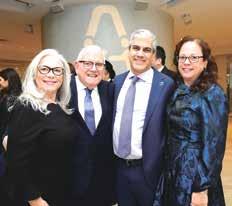














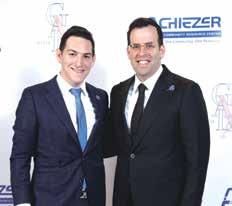





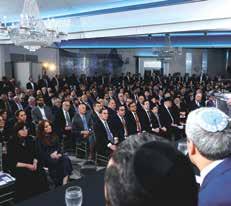






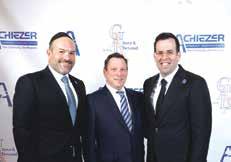
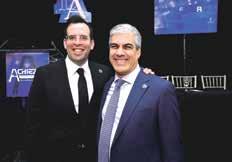


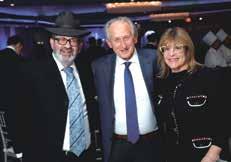









decorating delicious doughnuts
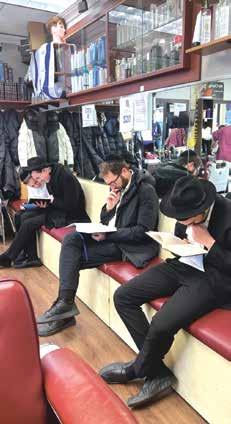
Bochurim seen learning in Ruben’s Barber Shop

In honor of Thanksgiving, the students at Lev Chana and HALB made an extra effort to thank the people who help them every single day. They made cards of the school security guards, maintenance staff, local Hatzolah members and the local police department. HALB appreciates everyone who helps keep the school and the community safe!
Special thanks to Hatzolah member Yaakov Sharshevsky for visiting HALB!

This past Shabbos, the MTA juniors in Rabbi Mendelson’s shiur spent Shabbos in yeshiva in the presence of Moreinu HaRav Herschel Schachter, shlita, and Rav Yosef Blau, shlita, along with Kerem B’Yavne Rosh Yeshiva Rav Aharon Friedman and Hakotel Rebbe Jesse Horn, as well as YU Rabbeim Daniel Feldman and Danny Rapp.
The learning and davening were tremendous as the full Beis Medrash resounded with Torah and tefilla. The MTA talmidim were a true part of the yeshiva! Rabbi Bortz addressed the MTA late night oneg Shabbos (after three hours
of learning!) and HaRav Boruch Simion, shlita, a YU Rosh Yeshiva who himself learned in MTA, spoke at the High School Kiddush (before three hours of learning in the afternoon!)
Besides Rabbi Mendelson’s divrei Torah and learning with the talmidim over Shabbos, he also taught them an unpublished song to the words of “Toras Hashem Temima.” Many talmidim look back to the In-Shabbosim as turning points in their ahavas HaTorah and are already looking forward to the next one before the Iyun Final in January. Only MTA can offer such a Yeshiva experience!
Plans are underway for the thirty sixth annual (secular) year-end One Week Kollel-Yarchei Kallah of Flatbush to begin on Wednesday, December 25.

What is this longstanding kollel? Men who are working (or retired, etc.) and don’t have the opportunity to learn Torah full time take this time off to immerse themselves in learning for a full week in a yeshiva environment created just for them.
If you are learning an hour or two a day but want more, this kollel is for you. If you want to learn, but don’t have the tools to learn independently, the Kollel makes arrangements for you, too.
This year, the fascinating topic of mezuzah will be addressed in Mesechta Yoma, Daf Yud, Amud Beis.
The kollel is hosted this year (as in previous years) by Cong. Tomchei Torah,
1966 Ocean Ave. (between Ave N & O) in Brooklyn, NY. Most of the chaveirim joining the kollel come from Brooklyn, but over the years men have come from as far away as Boston, Baltimore and even Yerushlayim.
The heart of the Kollel is the two Sedarim daily of chavrusa learning, but the shiurim are gevaldig! Rav Psachya Fried, shlita, who has been the Rosh Kollel since its inception, gives several spellbinding sugya shiurim over the course of the week; Rav Moshe Twersky, shlita, has been giving the daily blatt shiur, also from the start of the kollel; and Rav Sholom Plutchok, the Mora d’Asra, challenges the chaverim with divrei chiz uk.
To register, or to get more information, email draaronmandel@aol.com or call 718-998-5822.

The hallways of HAFTR Early Childhood are already echoing with Chanukah cheer as students begin preparing for their upcoming Chanukah celebrations!
This week, the children started learning songs for the upcoming Chag Chanukah with Morah Kaylie and Rabbi Ben. Their voices filled the room with excitement as they sang about dreidels, candles, donuts, and the amazing story of Chanukah. Our Music program is another way for us to guide the children to connect with the joy and meaning of Chanukah.
We can’t wait to see their enthusiasm shine when they perform for their families at the upcoming celebrations! Stay tuned for more Chanukah magic at HAFTR!

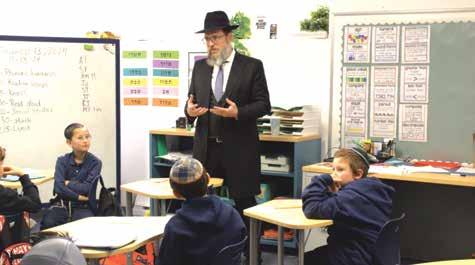
Torah and Language (TAL) Academy in Belle Harbor, NY, had the privilege of being paid a visit by Rabbi Chaim Tzvi Senter, the Rosh Hayeshiva of Yeshivas Aderes Hatorah, in Yerushalayim. TAL Academy is a school for bright children with dyslexia and other language-based learning challenges. Rabbi Senter took the time to tour the school and speak to each of the five classes in TAL Academy. During his visit, he tested some of the boys on their Chumash reading and was moved by their Kriah ability. What made the visit especially meaningful is that Rabbi Senter opened up to the TAL students about his own struggle with dyslexia as a child. Using this shared experience, Rabbi Senter connected with each child in an impact-

SKA High School’s annual Shabbaton at the DoubleTree Hilton in Somerset was a spectacular success. This is one of the most anticipated Shabbatot of the year in which students have the opportunity to shine outside the classroom. From the passionate ruach, to the spirited davening to the captivating guest speakers, Stella K students were immersed in a B’lev Echad Shabbat that fostered their expression of creativity, talents and energy all the while maintaining connections to their classmates, teachers and kedushat Hashem.
This year’s theme was Ahavat Yisroel, and it was especially meaningful since its focus is simply a continuation of the message that has been implemented and integrated since the first week of school.

The theme was intentional as SKA students are viscerally and visibly connected to Am Yisrael and Eretz Yisrael and seamlessly interweaving the theme of Ahavat Yisrael was natural and organic.
YCQ Celebrates with an Attitude
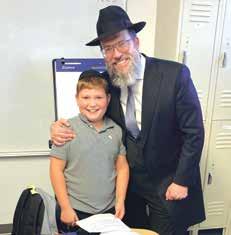
ful way.
The children, along with the faculty, were moved and encouraged by his meaningful message of resilience.
Thanksgiving spirit filled the air in YCQ, as students across grades engaged in meaningful and festive activities.
Fourth graders brought their Social Studies curriculum to life by hosting members of the Shinnecock Nation for an authentic Powwow, featuring cultural dancing, singing, and displays of traditional artifacts. The event truly created an unforgettable learning experience for all.
In second grade, students expressed gratitude through creative projects and heartfelt poems, ending in a festive feast with the help of Grade 6 students.
Mrs. Hoffman and her fifth grade class spread the Thanksgiving spirit with a vibrant “thankful tree” and a playful “facul-tree,” while faculty and staff shared messages of gratitude displayed on the office door.

Even the Early Childhood students joined the celebration with a-maize-ing corn-themed parties that added cheer and festivity.
YCQ’s Thanksgiving activities highlighted the values of learning, creativity, and gratitude, creating a memorable and meaningful experience for all!


Join us for an unforgettable summer in the heart of Eretz Yisrael! For the Bais Yaakov girl entering 9th-12th grade who is looking for the experience of her lifetime in Eretz Hakodesh, our uplifting staff and upbeat trips and activities will keep you inspired and help you build friendships that last a lifetime. Unwind in comfort at the upscale D-Hotel in Ma’ale Adumim after each exciting and fun-filled day.
JULY 2 - JULY 28 This is a summer experience you won’t want to miss!






At SHS’s annual Day of Gratitude, we center the day around one timely theme in order to focus on something concrete and relatable. After over a year of watching our fellow Jews in Israel die to protect it and watching so many in America fight to defend it, we have developed an ever-growing recognition of how thankful we must be to have a homeland. In this vein, our theme this year was Grateful for our Homeland, with activities and reflections homed in on our gratitude for Eretz Yisrael. Student speakers at the Gratitude Cafe recited poems and read letters on an assortment of related ideas, including expressing appreciation for being raised with a love of Israel, longing to be reunited with a family member held hostage,
and recognizing Shulamith as an inspiration in a deepening connection to Israel.
Following the cafe, students chose one of four electives that brought the Israel flavor into a hands-on activity, from an Israeli cooking demo to graffiti art on the remainder of our parking lot wall. The program closed with a question-and-answer session with Lizzy Savetsky. She fielded questions on what inspired her to divert her online platform to staunch support of Israel, her goal of using her fame to influence anyone who is genuinely seeking to learn, and how she armors herself against the relentless attacks of anti-Israel activists. Students left the program stronger in their confidence of their own voice and more determined to become ambassadors for Israel.
Gratitude was the theme for this year’s first, second, and third grade Thanksgiving Feast at Mercaz Academy in Plainview. As always, the second graders culminated their unit on Native American life by inviting the first and third graders to join them for a celebratory feast on the last day of school before Thanksgiving. Students gathered in the cafeteria, festively decorated by members of the PTA, and enjoyed food and entertainment.
Of course, in keeping with their area of expertise, students in second grade played the roles of Native Americans and were led by General Studies teacher Mrs. Aileen Kirschenbaum, wearing a regal Native headdress. They contributed homemade (class-made?) cranberry sauce to the feast and sang “People of the Drum,” accompanying themselves on that instrument.
The third graders–along with Principal Rabbi Kalman Fogel and Assistant Principal Ms. Karen Leeper–came dressed as Pilgrims. Wearing buckled black hats and white bonnets, thirdgrade students bore a fruit salad that they made with their own hands (supervised by their General Studies teacher, Mrs. Irene Zervoudis). They sang a song
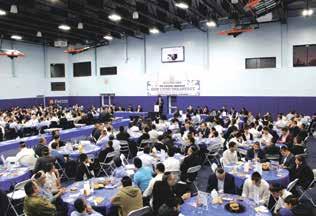
Mand gashmiyus at the Mesivta.
The morning began with a warm, leibidik Shacharis followed by a lavish, catered breakfast in the Mesivta’s expansive gymnasium. To begin the

program, the Rosh HaYeshiva, Rabbi Mordechai Yaffe, addressed the 400+ fathers, grandfathers and talmidim welcoming them and expressing his own personal feelings of hakoras hatov.
Senior Dovid Hirsch, representing the Mesivta student body, followed and delivered a heartfelt message about his and his classmates’ growth in learning and the strong connection he and his peers have with their Rabbeim. He concluded

called “Thankful,” and explained some of the things for which they were most thankful, such as families and pets.
First graders, in the role of turkeys, may have attended the feast with some trepidation. While they clearly enjoyed themselves, they brought (very filling!) sweet potatoes with marshmallows that they made with General Studies teacher Mrs. Melissa Reinhardt. Additionally, they performed a song called “Albuquerque Turkey,” which suggests replacing the traditional Thanksgiving turkey with macaroni and cheese.
The event was made even more special with the lovely table settings and delicious cornbread thoughtfully provided by the PTA membership, who always give Mercaz Academy so much for which to be thankful.

by thanking his rabbeim for their warmth, care and guidance throughout his years at the Mesivta.
The event also featured the Mesivta’s annual Fall Essay Contest, with excerpts being read from the four first place essays. Awards were distributed by General Studies Principal, Rabbi Sam Rudansky, and Menahel, Rabbi Yossi Bennett.
The highlight of the breakfast was a visit from Rabbi Yehoshua Kurland,
Ra”m at Yeshiva Sh’or Yoshuv and author of “A Time to Laugh, A Time to Listen” series. Rabbi Kurland shared amazing divrei Torah and anecdotes on the sugya of hakoras hatov and appreciating ones portion in life.
The program concluded with a raffle organized by the Student Government including a gaming system, a restaurant package, MAY merch and some very happy winners.

On October 9, 2024, Food Pantry Director Naftali Gurwitz met with a group of JCCRP volunteers on Zoom. He led a training session to kickstart a new JCCRP initiative, Project SAVTA. Under Project SAVTA, each volunteer is assigned up to ten JCCRP pantry clients to remotely communicate with them and assist them in placing their orders for JCCRP’s digital kosher food pantry. The initiative’s main goal is to ensure that seniors have regular access to kosher food. Seniors also benefit from the alleviation of the isolation that many of them face as they age through a regular phone call from a volunteer calling to connect with them while placing their pantry orders.
JCCRP’s Digital Kosher Food Pantry is the only kosher food pantry in the Far Rockaway-Five Towns community that obtains kosher food products from governmental sources in order to assist those in need in our broader community. More than 700 Jewish families are serviced through the kosher pantry each year, most coming at least 5 times a year.
The pantry utilizes a client choice model to prevent food waste and enable clients to choose their foods in an online shopping model that mirrors online grocery shopping. This model preserves client dignity while receiving food items from JCCRP’s pantry.
JCCRP’s digital pantry model brings with it many benefits for clients, but it also comes with its share of challenges, particularly for senior clients and clients who are technology-challenged. Given this reality, Naftali Gurwitz created Project SAVTA to accommodate these clients and ensure that they, too, have access to healthy kosher food. SAVTA stands for Senior Assistance Volunteering Team of Angels, and “Savta” also means “grandmother” in Hebrew, as many of JCCRP’s senior clients are grandparents.
Naftali Gurwitz, JCCRP’s current Food Pantry Director, grew up in Israel, where he attended yeshiva and imbibed the values of caring for others. He was determined to make the world a better place and therefore obtained a social work degree. After October 7, 2023, he

and his family moved to America and Naftali sought to utilize his skills in a position that would enable him to assist others. He found Jewish Community Council of the Rockaway Peninsula, Inc. (JCCRP) as a central community institution that assists the struggling families of the Rockaway Peninsula. Naftali now utilizes his position to assist over one hundred families each week by enabling them to receive access to healthy kosher food.
JCCRP’s Digital Kosher Food Pantry was created to serve the struggling residents of the Rockway Peninsula that cannot access the other local pantries in the area given the fact that they require only kosher products. JCCRP’s Digital Kosher Food Pantry exists to serve local families that are struggling financially in the Far Rockaway Five Towns community and beyond.
JCCRP’s latest volunteer initiative is a unique opportunity for the volunteers as well. The majority of volunteer opportunities require volunteers to be onsite, while this opportunity allows volunteers to assist food insecure Rockaway residents remotely from the comfort of their

homes. There are community members who yearn to give back to their communities but have difficulty leaving their homes; this opportunity enables those community members to assist residents in need. The volunteers are able to gift the seniors with access to one of life’s most basic necessities – food.
To volunteer for JCCRP’s Project SAVTA initiative, call 718-327-7755 ext. 103 or email pantry@jccrp.org. To request a volunteer assignment as a senior for pantry services, call 718-327-7755.
By Lindsay Appel
As HAFTR seniors begin looking ahead and planning for their transformative year in Israel, many face the challenge of selecting the right school. On Monday night, November 18, Shulamith High School for Girls hosted the annual Israel Night, a program designed for senior girls looking to spend a gap year learning in Israel. Participating schools included HAFTR, SKA, HANC, NSHA, and Shulamith. Students were able to reminisce with friends from other schools, and also get a sneak peek at the brand-new Shulamith facilities. With 26 different seminaries to choose from, it was an extremely informative evening.
The night started with the students attending presentations given by their own high school representatives. HAFTR’s representatives were Rabbi Wallach, our Rosh Yeshiva, Dr. Wyner, our Principal, Rabbi Riselsheimer, our Dean of Limudei Kodesh, and Rabbi Wienerkur, Director
of Israel Guidance. Each speaker reviewed key tips on how to explore and select the right school for the coming year. Following the meetings, students had the opportunity to participate in three seminary presentations. Each session was given by a representative of the seminary who discussed the main aspects of what makes each program unique, including showing the seminary’s schedule and the expectations of the seminary. Some of the seminaries brought their own merchandise to give out during the sessions. Reflecting on the event, Kate Jacobs, Student Government President, said, “I thought Israel Night was definitely helpful. I was able to hear more information than just what they told us in the in-school sessions. It allowed us to hear questions from our parents about certain items that we may not have thought to ask. It made me confident that whatever seminary I choose will be the right fit for me.” Overall, the program was informative, fun and offered students a glimpse into the year ahead.



We had a great time at Shulamith’s annual Second-Grade Thanksgiving Fair
By Emma Zelmanovich
Since its origination in South Africa in 2013, the Shabbat Project has grown to be one of the most meaningful, spiritual, and beautiful days of the year celebrated worldwide. The Shabbat Project is organized once a year to encourage Jewish people from all different walks of life, regardless of their level of observance, to come together and celebrate one Shabbat as a united nation. In honor of the Shabbat Project, many shuls hold special events, like challah-baking programs, in the week preceding this significant Shabbat. It is beautiful to see different types of Jews join together, despite their differences, and prepare for Shabbat together.
On Wednesday, November 13, HAFTR High School hosted a special challah-baking event where students from each grade had the opportunity to come together with their classmates and fulfill

the mitzvah of Hafrashat Challah. It was inspiring and meaningful to be in a room filled with so many people, each with their own story, creating memories while making delicious challah.
For me, making challah is one of my favorite things to do. However, there is something different about doing so in honor of the Shabbat Project. A challah bake is the perfect way to celebrate and

honor our beliefs. There are many steps to the process – forming the dough, creating individual strands, braiding the challah, letting it rise, and then watching the magic happen as it bakes. The result is a delicious and symbolic bread for Shabbat. Just like the process of making challah, bringing so many ingredients together to create something incredible, the Shabbat Project brings Jews from all

different lifestyles together to form one powerful and united people.
As a high school senior, my classmates and I are trying to make as many memories as possible for our final year of high school. I am certain that this outstanding event will be one of those special and unforgettable memories that will last a lifetime.
With the dark winter nights upon us, Chazaq hosted an inspirational couples night out in the Five Towns for 35 couples. The evening was filled with warmth, inspiration, and unforgettable experiences, showcasing the power of community and meaningful connections.
The event, which took place at Congregation Ohr Torah, was a tremendous success, thanks to its combination of engaging programming and exceptional hospitality. Guests were treated to a delicious gourmet dinner catered by Ephraim Dekhanov, known for its exquisite flavors and attention to detail. The evening’s atmosphere was further enhanced by live entertainment, including a fun-filled live game show led by Yisrael Erps, which kept attendees laughing and
engaged throughout the night.
In addition to the lively entertainment, the event featured a dynamic photo booth provided by SnapAPic, giving couples the chance to capture lasting memories with their loved ones. As part of the event’s opening, Rav Yehuda Eliyahou, the esteemed Rav of Ohr Torah, delivered opening remarks, setting the tone for an evening of growth and connection.
The highlight of the evening came with a powerful inspirational talk by Rabbi Avraham Walkin, whose words resonated deeply with the couples in attendance, offering wisdom and encouragement for strengthening their relationships and deepening their commitment to one another.
“We are thrilled with the success of this event and are grateful to all those

who participated and made it possible,” said Anaelle Shalom, Chazaq’s Event Coordinator. “It was beautiful to see couples from all walks of life come together for an evening of laughter, learning, and connection. We look forward to hosting
many more events like this in the future.” For more information about upcoming events hosted by Chazaq, please visit chazaq.org or follow Chazaq on social media.


Mrs. Kalish’s second grade students at Yeshiva Darchei Torah worked in pairs to complete fun spelling activities

Recently Rambam Mesivta hosted the highly anticipated 15th Annual 4-Corner-Dodgeball Tournament of Champions, and it was nothing short of epic! The excitement reached new heights as students competed for a cause close to their hearts—raising funds for the Friends of the IDF. This thrilling event, played for tzedaka, saw four teams enter the arena, but only one would emerge victorious.
The action-packed 4-Corner Dodgeball, a game created by the late Al Hecht, a”h, had the Blue, Green/Yellow, White, and Red teams each stationed in their own corner of the gym, armed with a single ball to start each round. For a nail-biting 90 seconds, players launched balls at their opponents, racking up points based on how many players lasted each round.
This year, the Red team claimed the title of champions, and senior Abie Steiner was named the Al Hecht Memorial MVP for his outstanding performance. With students from grades 9 through


12 taking part, this friendly competition is yet another example of how Rambam strives to incorporate tzedakah into the everyday, even within the excitement of sports—turning a fun rivalry into a meaningful opportunity to give back.
The Annual 4-Corner Dodgeball Tournament follows in the wake of earlier tournaments this year including schoolwide Flag-football, Volleyball, and Homerun Derby Tournaments. Coming soon the school will be running its Annual 3-on-3 Basketball Tournament and Annual 5 v 5 Soccer Tournament and so much more!
This tournament reflected Rambam Mesivta’s motto: “A Team for Every Talent. A Club for Every Curiosity.
A Place for Every Person.” Whether on the dodgeball court, in the classroom, or beyond, Rambam consistently fosters an environment where every student can shine, demonstrating that no matter your talent, there’s always a place for you to grow and succeed.




It was Week 9 of the JSL by FM Home Loans this past Sunday, and while the Inwood gym was closed for Thanksgiving, the excitement was as high as ever in the other 2 gyms! With playoffs underway, the competition was fierce, and the day was filled with thrilling finishes and incredible performances from the kids.
Football
Rides to Fly soared past Tikva Fire with a thrilling 10-8 victory, clinched by Shua Abrams’ game-winning touchdown. In another exciting matchup, Newman Dental pulled off a 9-6 win over Beautox_ AL, with Nechemiah Daniarov’s multiple incredible touchdowns propelling his team into the championship game.
Hockey
2nd/3rd Grade: Built By Nate edged out PIP Printing 5-4, with Yitz Balter tying the game with a spectacular goal and sealing the win. The Gallery put on a dominant performance in their 7-1 victory over Maidenbaum, led by Ezra Gruen’s impressive scoring.
4th/5th Grade: Smash House overpowered Marciano Pediatric Dentistry 7-2, highlighted by Asher Kamenetzky’s hat trick. Target Exterminating delivered a commanding 7-3 win against Town Appliance, with Mordechai Reisz scoring twice.
6th/8th Grade: Extreme Vent Cleaning swept past 925 Sterling with an 8-1 victory, setting the tone early with Yehudah Dear’s opening goal. Tikva Fire extinguished Seasons 4-2, thanks to


Basketball
3rd/4th Grade: Wieder
Orthodontics were all smiles in their 26-2 win over Marciano Pediatric Dentistry, as Judah Avigdor achieved his first career triple-double with 18 points, 11 rebounds, and 10 steals. Better Image Contracting edged John’s Automotive 3-2 in a double-overtime thriller, with Menachem Lipshitz’s clutch final drive sealing the victory. Posh Home + Bath squeaked past Russo’s Pharmacy 12-10, with David Bauman’s incredible layup making the difference.
5th/7th Grade: DJ_CP turned up the intensity in their 24-18 win over Smash House, thanks to Shua Profesorske’s outstanding defensive play. Tiffany Dry Cleaners cleaned up in a 36-26 win over Emporio, with Avraham Shurin’s stellar defensive effort leading the charge.


Lev Chana students, parents and teachers did an incredible job collecting food for the JCC Food Pantry! They collected several boxes so that as many people as possible could have special treats for Thanksgiving.


The fourth grade at HALB is currently learning about immigration. To help them understand it even better, their teachers took them on

By Mrs. Sarah Rudomin
We, at Bais Yaakov Ateres Miriam (BYAM), are excited to share the positive transformations taking place at our school. Under the guidance of our new leadership team, BYAM has evolved into a vibrant, dynamic community that nurtures students academically, socially, and emotionally. We are proud to be a real Bais Yaakov in the heart of Far Rockaway, where we raise our girls to cherish Torah and mitzvos.
BYAM has made thoughtful adjustments to better meet the needs of our students and families. With a renewed focus on academic excellence and wholesome education, we’ve created an environment where each child is valued, supported, and empowered to reach her potential. The spirit of achdus resonates throughout the school, fostering a warm, united atmosphere that nurtures intellectual and personal growth.
At BYAM, we truly get to know each student. Our connection begins as soon as a child enters our school. Mrs. Deenie Schuss, our preschool director, is truly a foundational pillar of our school. The updated preschool curriculum emphasizes Torahdike Hashkafos, a love for mitzvos, and key developmental areas such as early literacy, language skills,

and fine motor development—all within a nurturing, fun-loving, and creative environment.
As the girls transition from preschool to the elementary level, the students benefit from the leadership of our talented Assistant Principal, Mrs. Shira Kaplan. She plays an integral role in supporting both students and faculty, ensuring that our standards of excellence are met across all areas of school life.
We are proud of the significant strides we have made, particularly in our Kriah and ELA programs. Under the incredible leadership of Mrs. Leah Lieberstein, we have incorporated the Niv Sfaseinu method for Kriah, a structured, multi-sensory program that builds reading skills step-by-step. Smallgroup instruction and Kriah specialists ensure each student receives personalized attention, and progress is regularly assessed. Our ELA program, spearheaded by Mrs. Aviva Stern, focuses on decoding, reading fluency, and comprehension. The program is data-driven to ensure that no child is left behind.
The cornerstone of any successful school is the moros and teachers who nurture and educate the students. We are fortunate to have a talented staff that is unparalleled in their dedication and love for their talmidos Through our partnership with The Saayan Learning
a trip to the Lower East Side where they explored Jewish culture through longstanding shuls and restaurants.

Program, our teachers receive continuous professional development and guidance, which benefit all of our students.
To support individual academic needs, we have an English Learning Center that is masterfully run and organized by Mrs. Shoshana Salzberg. Our support staff of SETTS and therapists are trained to meet the needs of students.
BYAM also works with Mrs. Chashie Brand, a renowned educational consultant, who collaborates with leadership, teachers, and students to facilitate ongoing growth.
Middos development is central to our mission. This year’s theme Kol kavuda bas melech penima, focusing on kavod (honoring our parents, teachers, and friends), bas melech (treasuring the dignity of being a daughter of the King), and penima (recognizing the inner strength each of us possesses). Each month, we explore these values through lessons and inspirational teachings, encouraging students to embody them in their lives. Students are excited to earn charms for their charm bracelets as they demonstrate the middos they are learning. These values will stay with them throughout their lives, shaping them as Bnos Yisrael.
We also understand the importance of social-emotional development. Our social-emotional curriculum, led by Mrs.
Ilana Pilevsky, helps students develop emotional intelligence and interpersonal skills. Additionally, we are partnering with Ohel to have an exclusive Satellite Clinic to offer tailored support for students who would benefit.
At BYAM, we truly value the homeschool relationship and are committed to having open lines of communication. We have a weekly newsletter and monthly video that highlight the exciting developments within the school, keeping parents informed of their children’s progress and activities. The BYAM PTA is an active and integral member of our school, launching an after-school program with a variety of electives and clubs for all ages. These activities allow students to explore new interests in a fun and enriching environment.
At BYAM, we are excited for the future of our students. Our three-pronged approach centers on helping our girls treasure Yiddishkeit, exude academic excellence, and foster social-emotional growth. This creates an environment where every student can flourish, and we are proud that our school is a vibrant, nurturing community that will help shape tomorrow’s leaders.
For more information or to apply for our preschool, please contact us at information@baisyaakovam.org.




This week started off like every other – an event at the Israel Chesed Center to raise money to buy gear for chayalim. On Sunday, over 500 people visited the ICC to shop for Chanukah, purchasing items from over 30 local businesses who are donating a portion of their proceeds back to the ICC. The Chanukah Boutique continues this weekend on Motzei Shabbat and Sunday – don’t miss this opportunity to purchase Chanukah gifts, olive oil & candles, decorations, and food & wine for your Chanukah party! All while supporting our brave chayalim!
Sadly, we woke up on Monday to the tragic news that the IDF confirmed that Omer Neutra, HY”D, was killed during Hamas’ October 7, 2023 attack into southern Israel and his body taken back
into Gaza. For over a year, his family, and the broader Jewish community, believed that Omer was alive and had been praying and advocating for his safe return home, together with the other hostages. A memorial service was held for Omer on Tuesday at the Midway Jewish Center of Syosset and was attended by thousands of mourners.
Omer, a native of Plainview, studied at Solomon Schechter of Long Island and went to Israel for his post high school gap year. As his father said at the funeral, Omer fell in love with the land and joined the IDF as a Lone Soldier, serving as a tank commander in the 7th Brigade. Omer was promoted posthumously to the rank of Captain.
The Five Towns community was represented at the funeral by a number
By Malka Miller, M.Ed
The sun peeked through my window. Today, like every Shabbat, I saw them. The girls from down the street, giggling and chatting, their carefree laughter echoing in the quiet afternoon air. They walked past our house, their eyes fixed on each other, oblivious to my longing gaze. It’s like I’m invisible, as if I don’t even exist. They don’t knock on our door, just empty silence. It hurts, like a sharp pain in my chest. I have friends at school, but with my neighbors right here on my block, I feel alone.
I don’t understand why they turned away. Did I do something wrong? Am I not good enough? I just want to be part of their group, to feel included, to laugh and talk with them.

of residents and by the Shulamith High School 11th grade class, accompanied by Mrs. Esti Munk. Omer’s alma mater, the Schechter School of Long Island, was also well represented at the service.
Following the service, three members of Nevut, an organization that supports Lone Soldiers who have returned to the United States, visited the Israel Chesed Center, where they had the opportunity to address the Shulamith HS Israel Advocacy Club. The girls were privileged to hear from Chaim Meisels, a lone soldier who is a Captain in the IDF, originally from Brooklyn and now living in Pomona, NY, who has served for over 200 days in this war and serves as the Community Program Coordinator for Nevut.
Chaim has become well known since he is the great-grandson of the Satmar
Rebbe, Rav Moshe Teitelbaum, the Beirach Moshe, zt”l. About eight years ago, Chaim chose to make aliyah to Israel and enlisted in the IDF. Chaim left everything behind, joined an IDF combat unit, and was sworn in at the Kotel. Chaim served as a commanding officer in the Egoz unit, an elite special forces unit and currently serves in the Golani Brigade. We pray for the safety of our chayalim, the return of our hostages, and that the Neutra family, and all of the bereaved families, find comfort in the heroism and sacrifice of their sons, husbands and fathers. Kislev is a month of miracles, and we are eagerly anticipating the victory of the tzaddikim over our evil enemies.
Mom wants to help me, but I’m not sure how. Is it really bullying if they just ignore me? Or is it something else? I wish I knew what to do.
It’s a strange kind of hurt, isn’t it? The kind that doesn’t leave a bruise, but cuts deep. They walk by, their laughter a sharp contrast to the emptiness I feel inside.
They say it’s okay to choose your friends, but what about when you’re the one left out? I wish they could see how much it hurts. Maybe then they’d stop.
Let’s gain a perspective from this mishna in Avos: “B’makom sh’ein anashim hishtadel l’hiyos ish.” In a place where no one assumes responsibility, try to be the one that does.
Rabbi Ephraim Wachsman teaches that this Mishna reminds us of our interconnectedness. It’s a call to action, urging us to look beyond ourselves and
consider the needs of others. By viewing ourselves as part of a larger whole, we acknowledge our responsibility to those around us. This simple act of looking out for others can have a profound impact, promoting compassion, empathy, and a sense of belonging.
When we notice a child left out and sense their loneliness we can’t stand idly by.
When you include others, you’re teaching others to do the same.
Start a ripple effect where everyone feels valued and included. Encourage your child to invite others to join in their activities. A small gesture can make a difference.
While it’s natural to have close friends, we should also strive to create a more inclusive environment. Tell your child how proud you are when they reach out to those who may feel isolated and
brighten someone’s day. Together, we can be the catalyst to make everyone feel connected and valued. Let’s empower our children to be the architects of a kinder, more compassionate world.
Malka Miller, M.Ed, is the founder and creator of the My Team Magic© school program.
Do you have a child who frequently argues and picks fights with their siblings?
Join us in our free live workshop for mothers, “Understanding the Child Who Often Instigates: an empathic approach”
To register: https://myteammagic.kit. com/f70ebd1fb0
For more information, email myteammagic100@gmail and visit myteammagic.com.



By Tahra Kerman
On Tuesday, November 26, students at Rambam Mesivta were treated to a powerful and thought-provoking presentation by Rabbi Steven Weil, the head of the Friends of the Israel Defense Forces (“FIDF”). Rabbi Weil offered a deep analysis of the current global security crisis, drawing unsettling comparisons to the days leading up to World War II and emphasizing the existential threat Iran poses not only to Israel but to global peace and security all over the world.
Rabbi Weil began his address by discussing the Iranian regime’s longstanding ambitions, emphasizing that Iran’s Islamic Revolutionary Guard Corps (“IRGC”) functions much like the personal army of its supreme leader, the Ayatollah, similar to how Hitler’s SS served him. According to Rabbi Weil, Iran’s goal is not just regional dominance but a global one, specifically targeting Mecca and Medina, and by extension, the entire Muslim world.
Iran has created what Rabbi Weil called a “Ring of Fire” around Israel, funding and training militias across the Middle East in an effort to destabilize countries and directly challenge Israel’s existence. From supporting terrorist groups in Gaza to backing destabilizing forces in Jordan, Iran’s influence is pervasive.
“What Iran is doing today is a direct threat to global stability,” Weil said. “If Israel falls, G-d forbid, the next target is Saudi Arabia. And if Saudi Arabia falls, they control the heart of Islam.” He went
on to explain that, in line with the Shiite caliphate, should Iran take control of Islam, Western civilization as we know it would cease to exist.
Drawing a striking parallel to the rise of Nazi Germany, Rabbi Weil asked: would the world respond to Iran’s aggression as it failed to respond to Hitler’s rise? He reminded the students of the 58 million lives lost in World War II, a tragedy that the world largely ignored until it was too late. “Hitler moved in baby steps,” he said. “He could have been stopped at any point, but no one stopped him. We cannot let history repeat itself.”
Rabbi Weil urged the Rambam students to understand that Israel is not just defending itself but standing at the frontlines in a global battle for morality and security. He called Israel the “canary in the coal mine”—always the first to face threats, but never the last. “Israel’s fight against terrorism, particularly in Gaza, is a defense not only of Israel but of the very values of Western civilization,” he explained.
Rabbi Weil also emphasized the moral integrity of the Israeli Defense Forces, providing sobering statistics about Israel’s conduct in warfare. He noted that Israel’s civilian-to-combatant ratio in Gaza is an extraordinary 0.75 to 1—the most moral ratio in the history of modern warfare. While the global average for civilian casualties is 9 for every combatant, Israel has gone to incredible lengths to protect civilian lives, even as its enemies deliberately use civilians as human shields.
“We are fighting an asymmetrical war,” Rabbi Weil explained. “The enemy

disguises itself as civilians, hiding in schools, hospitals, and even within the United Nations. In such a war, identifying the true enemy is nearly impossible. But the IDF has done more to limit civilian casualties than any other military in the world.”
Rabbi Weil’s message to the Rambam students was clear: they are the next generation of leaders, and they must be equipped with the truth and the moral clarity to confront global challenges. “Be armed with the truth,” he urged. “Don’t cower. The IDF is not only defending Israel; it is defending the world. You will build Torah in Israel and contribute to the destiny of your people. You are the generation that will carry the moral torch forward.”
Drawing on the teachings of the Rambam, Rabbi Weil reminded the students of the importance of seeing the “big picture.” While Israel faces profound pain—200 new widows, 600 new orphans, and 1,900 families mourning the loss of a sibling—its strength and resolve are stronger than ever.
In closing, Rabbi Weil warned that the ongoing conflict, particularly the war with Gaza and the looming threat posed by Iran, will define the 21st century. The world stands at a critical crossroads: Will it repeat the mistakes of the past by appeasing an aggressor, as it did with Hitler, or will it rise to stop Iran and ensure that the principles of morality and justice shape the future?
“There are no simple answers,” he said. “But this moment in history is a serious one. Israel’s survival is not just about Israel—it is about the future of the free world. And Rambam students, you will play a key role in this fight. You have the truth. You have morality. Be strong.”
The assembly was a sobering reminder of the state of affairs on a global stage and the challenges our people face. For the students of Rambam, it was a call to action—a chance to understand the gravity of the times, and a reminder of their responsibility to shape the future with courage, conviction, and moral clarity.


One of the major challenges teens face is the temptation of substance abuse. To address this important issue, DRS Yeshiva invited the Communities Confronting Substance Abuse and Addiction (CCSA) under Ohel to inform its 10th grade students about the dangers they might face and how to combat them.
The presentation was divided into three parts: a personal story of addiction, a slideshow presentation, and a handson activity. The presenter Sam’s story detailed how he fell prey to increasingly dangerous drugs as he went through his young adult life. Addiction destroyed his life and the plans he had for the future. Fortunately, he was able to get help via an Alcoholics Anonymous group to reshape his life. Sam became a motivational speaker, sharing his experience in schools, throughout the United States, hoping his story would help deter others from making the same mistakes.
The second part of the program was a slideshow presentation. Sam narrated key points like the dangerous components of certain drugs. Many students knew that vapes contained components like nicotine, but Sam also highlighted lesser known ingredients like heavy metals and fine particles that are harmful when inhaled. Sam enumerated the harmful side effects of substance abuse including seizures, stunted brain development, lung cancer, memory problems and many more.
Next, Sam went over instructions on what to do in case someone is, chas v’shalom, overdosing and also explained steps to take to get help if you think you are developing an addiction. Sam
described the different rationalizations people make for substance abuse. One example mentioned was that many smokers have switched to vaping claiming that it’s a healthy way to quit smoking. Their main argument is that vaping is “just water” and couldn’t hurt, but that’s sadly incorrect as vapes contain dangerous ingredients.
In order to demonstrate the physical effects of THC and alcohol abuse, two addictive substances, the CCSA brought in special goggles which simulated the vision of an intoxicated individual. They set up stations with different activities to demonstrate how difficult performing basic tasks would be for someone who is drunk or high. There was a “tightrope walk,” a challenge to walk in a straight line which proved to be difficult to do since your vision would be impaired, negatively affecting your motor skills and preventing you from performing this task. The event ended with students using the information they learned to create posters, showing the dangers of using illegal substances.
Sam concluded with the message that someone who’s caught in an addiction shouldn’t be afraid to reach out to anyone they feel comfortable with for help. The person who’s approached can offer support or give contacts of trained professionals. By the end of the presentation, DRS students were armed with valuable knowledge on how to avoid starting down the path of addiction or what to do if they stumbled and fell prey to this disease. We extend our gratitude to Sam for sharing his story and to DRS administrators, CCSA and Ohel for the informative experience.
By Sarah Shaver
Just like a recipe needs the right components, measurements, and spices to make it flavorful, a high school needs the correct balance of academics, extra-curricular activities, and warmth to thrive and succeed. Bais Yaakov Ateres Miriam High School, under the tutelage of Mrs. Ruchie Sokoloff, is an exciting, academically driven, and welcoming school where every student’s talent and personality shines. With its traditional Bais Yaakov hashkafa and emphasis on strong Limudei Kodesh and general studies, BYAM High School truly offers the best of both worlds. Small class sizes, close student-teacher relationships, and opportunities for leadership roles make BYAM High School a close-knit and supportive place for students to learn and grow.
Mrs. Ruchie Sokoloff comes with decades of experience in teaching, curriculum planning, and educational administration. As someone who grew up in a family involved in chinuch, Mrs. Sokoloff has an intrinsic understanding of what it takes to build and shape a vibrant and dynamic Bais Yaakov High School. Always looking for innovative and cutting-edge educational methods and pedagogies, Mrs. Sokoloff brings her excitement and passion for learning to her students. Mrs. Sokoloff loves learning and presenting new ideas to the BYAM High School students. Her love and excitement for knowledge foster a love and passion for learning. Everyone, from the principal to the faculty to the students, continues to learn, collaborate, and explore new ideas together.
Each course offered, whether it is limudei chodesh or general studies, is carefully chosen and constructed based on students’ needs and interests. A variety of Tanach, hashkafa, machshava, Jewish history, and halacha classes are taken, as well as math, science, English, history, and Regents classes. Ninth grade students take an electives class where they engage in different activities such as debating, aerobics, and cuisine. For students who struggle with math, there is an alternate class called “small math.”
Mrs. Sokoloff emphasizes how important language is when we refer to students and their abilities. Instead of calling the class “low” or “remedial,” students feel their class is individualized and tailor-made for them. Students in the eleventh grade have an opportunity to take classes for college credit, which instills confidence and excitement about their futures posthigh school.
In BYAM High School, students in all grades are on committees. Every student is involved in the school. When students are involved in leadership roles, students develop a better sense of self and that they count. At BYAM High School, students from all grades are leaders on G.O., chesed heads, and class presidents. Students work together which creates an atmosphere where the upperclassmen become role models for the younger students.
Another component that shapes the incredible learning and activities taking place at BYAM High School, is the faculty. Mrs. Sokoloff shares proudly that any of her Limudei Chodesh teachers could teach the general studies classes and vice versa. Many of the teachers at BYAM High School teach a variety of classes which makes them a master at their craft and a role model to the BYAM students. Mrs. Sokoloff teaches the popular class, “Current Events,” which updates students on the important ideas and topics surrounding the world today.
BYAM High School is a place where every student has the potential to be her best self and give back to her school and community. The BYAM High School student strives to live a life based on the principles of the Torah and to make a kiddush Hashem wherever she goes. Whether it is in an English class, performing in the school’s production, or learning hilchos Shabbos, the philosophy and heart of BYAM are embedded in every facet and detail of the school.
For more information or to apply for our high school, please contact us at hsoffice@baisyaakovam.org.









For three decades, One Israel Fund has remained steadfast in its mission: strengthening and uplifting the lives of over 500,000 residents in Judea and Samaria. As the premier organization dedicated to these regions and Israel’s vulnerable southern and northern borders, One Israel Fund focuses on what matters most - ensuring safety, enhancing quality of life and fostering thriving communities.
Since its founding in 1994, One Israel Fund has been a lifeline for the Biblical Heartland of Israel, providing essential support in areas where resources are scarce. From cutting-edge preventive security systems for civilian first responders and medical facilities to educational programs and scholarships, recreational equipment and communal infrastructure, the organization bridges critical gaps left unmet by other services and charitable initiatives for the country.
To date, One Israel Fund has invested hundreds of millions of dollars in initiatives that secure, strengthen and sustain the communities of Judea and Samaria. By addressing unique challenges, these projects ensure that these regions continue to flourish, preserving their vital role in Israel’s story.
Over the past year, alone, One Israel Fund has fulfilled over 500 unique projects due to the generosity of its friends and supporters.
On Thursday, December 19, One Israel Fund will mark its historic 30th Anniversary with a gala event celebrating the organization’s extraordinary achievements. This landmark evening will bring together supporters, leaders and visionaries dedicated to Israel’s strength and future.
The program will feature dynamic and inspiring highlights, including:
Comedian and Actor, Michael Rapaport as Master of Ceremonies
A fireside chat with Mosab Hassan Yousef, known as the “Son of Hamas,” and Nathaniel Buzolic, an actor, prominent Israel advocate and social media leader
A celebratory concert by Jewish music superstars Noam Bouskila and Aryeh Kunstler.
Honoring Leadership and Commitment
The evening will also pay tribute to distinguished honorees whose dedication has made a profound impact on the region:
Dor L’Dor Bonei Yisrael Award:
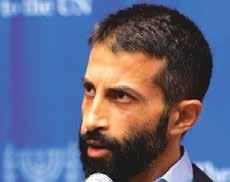

Nina & John Nanasi and Ashley & Ben Nanasi of Englewood, NJ
Shomrei Yisrael Award: Melodie & Marty Scharf of Lawrence, NY
Woman of Valor Award: Carol Greenwald of both Maryland and Florida
Maginei Yisrael: Danielle & Sid Rosenberg of New York (and WABC Radio Fame)
Inaugural Founders Award: In memory of Maj. Moshe Yedidyah Leiter, MD, son of the founder of One Israel Fund and recently appointed Israel Ambassador to the United States, Dr. Yechiel Leiter
Lionesses of Zion Award: Hadassa Goldberg (a/k/a The Real Hadassa) and Hadas Gozlan, Security Director of the Jordan Valley - both warriors from Israel
This milestone event is not only a celebration of past achievements but also a call to action for the future. Together, we can ensure that Israel’s Biblical Heartland remains secure, thriving and vibrant for generations to come.
To register or learn more, visit oneisraelfund.org/focus or email us at dinner@OneIsraelFund.org.
In addition, all of our distinguished entertainers and honorees and a few other surprises will be part of a spectacular VIP
Experience before the dinner program. If you’d like information about how to be included, email the links above. Let’s honor the past 30 years and recommit to building a stronger tomorrow.
Since its inception in 1994, One Israel Fund has remained committed to the safety and well-being of the over 500,000 residents of Judea and Samaria - our Biblical Heartland. As the premier organization supporting these regions, One Israel Fund works tirelessly to facilitate unique projects each year, filling gaps in medical, educational, recreational, preventative security and all other forms of communal and social welfare. By working in tandem with community and regional leadership as well as government officials, One Israel Fund enables Jewish life to flourish in all areas of our Biblical Heartland. For nearly fifteen years, One Israel Fund has received 4-Stars, the highest rating possible, by Charity Navigator for its outstanding achievements in financial efficiency, sustainability, trustworthiness and its commitment to governance practices and policies.


The Special Children’s Center had a fun-filled Thanksgiving weekend program! From Thursday to

Sunday, we offered a packed schedule of activities, including our Legal Holiday Program, After School Program, and our

Center House, where we provided a warm and welcoming environment for our children to thrive. It was an unforgettable
By Monet Binder, Esq.
In most cases, from the most sophisticated established business-people with the highest net worth to those just starting in the workforce and growing young families, you very likely do not know how to evaluate estimates when shopping for an estate plan.
Shopping for an estate plan based on getting the lowest cost plan possible is often the fastest path to leaving your family with an empty set of documents that won’t work for your family when they need it.
Unfortunately, we see the negative effects of cheap estate planning when family members come to us during a time of grief with a fancy binder that sat on the shelf for years sending out signals of false security, full of out-ofdate estate planning documents, and find themselves stuck in what could have been an unnecessary court process, or even conflict when that’s exactly what their loved one thought they had paid someone to avoid and handle for them.
Here Are 4 Reasons Why Shopping For The Cheapest Estate Plan Will Likely Not Work For Your Family…and Could Leave Them With a Big Mess Instead:
1. The least expensive plan isn’t worth the paper it’s written on once you’ve left the attorney’s office – your life changes,
the law changes, and your assets change over time. Your plan needs to prepare for and keep up with those changes. And the truth is, a lawyer can’t afford to provide anything more than documents that won’t get updated or prepare for various circumstances when you only pay a few hundred dollars for a plan. That business model doesn’t work for the lawyer and won’t work for you. An attorney who has built a practice specifically to serve your family and their best interests cannot make a living selling $399 (or even $1,500 or $2,000) Wills, Trusts, or estate plans.
2. You get what you pay for. Also, working with a lawyer who focuses on “the best documents” at the “lowest price” or doesn’t charge enough for their services cannot provide more than standardized form documents.
It’s your family that will pay the price. Traditional law firms usually use generic forms and documents. These are called “Trust mills” which are firms that draft plans but don’t ensure assets are owned correctly or stay up to date over time. You might think that’s malpractice, but it’s not. It’s common practice, leaving your family at risk if and when something happens to you!
These days, especially with the rise of AI, template form documents are free for anyone to use, which makes it difficult to know how those documents are handled when it comes to protecting the people you love.

week, and we’re grateful to have shared it with our amazing kids and staff!
Also, shopping around for the least expensive plan may get you the cheapest documents, but those documents won’t be there to guide the people you love when they need someone to turn to in a crisis or grief. We will be.
3. An estate plan isn’t a set-it-andforget-it kind of thing; it needs to stay updated with changes in your life, the law, and particularly your assets.
There’s currently more than $58 billion of lost property held in departments of unclaimed property across the United States. Assets often land there when someone dies or becomes incapacitated, and their family loses them because they weren’t tracked well during life. And that’s just one way your family loses out if you’ve shopped around for the cheapest estate plan rather than having a plan that works for the people you love.
Sometimes, having something in place is better than nothing, but this is not one of those cases. In this case, having a “something” plan leaves your family holding the expensive, or even empty bag, when it’s too late for them and you to do anything about it. It’s risky to leave your loved ones with a set of documents you aren’t sure are going to work, and our guess is that you love them too much for that.
Don’t waste your time shopping around town for the cheapest plan possible. You don’t want a cheap plan; you want the plan that will work for the people you love when they need it. If you already have an estate plan in place that you may have bought based on price and are concerned you may have gotten a set of documents that won’t serve your family when they need it most, call us and ask about our 50-point assessment. Contact us at 718.514.7575 to schedule OR email monet@mbinderlaw. com to get on our calendar. We begin our planning process with a Family Estate Planning Session, during which you’ll not only become more financially organized than ever before, you’ll finally be able to make informed, educated choices about the right plan for your family based on your unique family dynamics and your assets, instead of just shopping around for an estate plan based on price.
Monet Binder, esq., has her practice in Queens and Brooklyn, New York, dedicated to protecting families, their legacies and values. All halachic documents are approved by the Bais Havaad Halacha Center in Lakewood, under the direction of Rabbi Dovid Grossman and the guidance of Harav Shmuel Kaminetsky, shlita, as well as other leading halachic authorities.

Ezra Academy’s principal, Sima Fish, Esq., recently traveled to Israel to attend the wedding of her beloved nephew, and while in the country, she took the opportunity to reconnect with Ezra Academy graduates living, studying, and exploring opportunities in Israel. In an inspiring display of community, Ms. Fish reached out to alumni on gap year or still studying in Israel, as well as graduates who had made aliyah, emphasizing that once a member of the Ezra Academy family, always a member of the Ezra family.
The wedding, held in Beit Shemesh in Israel, provided the perfect occasion for Ms. Fish to reunite with former students, many of whom have ventured to Israel to continue their educational and personal journeys. Because her visit would be so short, she organized with her brother, the father of the chatan, special tables for the graduates at the wedding where the men on one side and the women on the other had a chance to reminisce, share their stories, and discuss their paths since leaving Ezra Academy.
“I’ve always said that our alumni are the heart and soul of Ezra Academy,” said Principal Fish. “It was so wonderful to reconnect with our graduates who are making such a positive impact in Israel and around the world. Whether they are on their gap year, furthering their studies, or living here as Israelis, they continue to carry the values and lessons they learned at Ezra with them.” Unfortunately, some alumni couldn’t make it for various reasons including army service ,and they were surely missed.
The wedding venue and generosity of the couple being married, allowed for the
alumni from various graduating classes to share updates about their current endeavors, their experiences in Israel, and the enduring connections they maintain with the school and each other. It was an opportunity not only for Ms. Fish to catch up with former students but for the graduates themselves to reconnect with one another and reminisce about their shared experiences from high school, underscoring Ezra Academy’s commitment to maintaining lifelong connections with its graduates no matter where they are in the world.
Upon returning, the principal was happy to report that what the administration always says holds true. “We are proud of every one of our alumni and seeing so many of them building their lives in Israel is truly inspiring. Ezra fosters a deep sense of family, and I wanted to make sure that this opportunity allowed us all to come together. These graduates are not only the future of Israel but also the future of our global Jewish community.”
The visit was a testament to the enduring bond between the school and its alumni, a bond that transcends distance and time. As Ezra Academy continues to nurture the academic, social, and spiritual development of its students, the Principal’s trip to Israel serves as a reminder of the school’s far-reaching impact.
Ezra Academy, located in Forest Hills, NY, remains committed to fostering lifelong relationships with its students, both past and present. The school continues to offer opportunities for alumni to stay connected through events, reunions, and other initiatives that keep the Ezra spirit alive.

By Rabbi Binyomin Pruzansky
We all want to be winners. That’s why we are always looking for ways to improve. But sometimes, in our quest for success, we see other people’s gains as our losses, which leads to fierce competition. In reality, however, the only real winning strategy is to build our bitachon. When we trust that Hashem will give us exactly what is meant for us, and no one can take anything away from us, we feel free to work together with others. With this achdus, each person contributes his own strengths, and everyone emerges a winner. A story from Rav Elimelech Biderman illustrates the point.
A group of fifty salesmen met at a hotel to hear a marketing seminar from a famous motivational speaker. As the speaker was making his presentation, a man approached him at the podium and slipped him a note. As the speaker silently read the note, his face lit up with a big smile.
“I was just informed that someone in
the audience is making a great offer to everyone here,” he told the crowd. “He is willing to pay $5 to every person who wins a round of arm wrestling against his fellow participant. The contest will last ten minutes, and you’ll win another $5 for every round you win!”
An excited buzz broke out in the room. The audience assumed the offer was part of some bigger scheme, but they were more than willing to go along with it. The participants paired off, and when the signal sounded, the games began. To play, each of the opponents placed one elbow on the table and locked hands with the other. Then each tried to force the other player’s arm down to the table.
Anyone observing the scene would think the contestants were fighting for their lives as they sweated and strained against their opponents. For many of the pairs, it was a tough fight. Just as one man seemed to have the advantage, forcing his opponent’s arm a mere few inches away from the table, the other player rallied and pushed back to the middle. And so it went until the ten-minute buzzer ended

the contest.
Then it was time to give out the prizes. Some teams had played five rounds, some had played ten, and there was one even man who had won fifteen rounds in that ten-minute period.
But there was one pair of men who claimed to have each won three hundred rounds per player, thus earning themselves $1,500 each. The speaker declared them the winners of the event, but instead of applause, they became the target of angry shouts from the audience.
“They must have cheated!” people accused. “There’s no way they could have done it!”
The winning pair came up to the podium and one of them took the microphone. “I want to assure everyone that we won fair and square,” he said.
“And here’s how we did it. We knew that in order to make the most of the ten minutes we were allotted, we had to work together instead of against each other. So, he let me win and I let him win. We went back and forth, pinning each other’s arm to the table over and over for ten minutes straight. With teamwork, we each accumulated three hundred wins. You, on the other hand, were fighting each other, exerting all your strength to defeat your opponent. You spent your energy struggling against each other while the clock was ticking, and both sides lost out!”
The speaker stepped forward and finished the story. “This team maximized its time and energy by working together. This is the way to maximize your results in sales as well. By helping each other instead of working against each other,

you can earn more than you can imagine!” Rav Biderman concludes that this is a lesson for everyone. Although we have to do our hishtadlus to earn a parnassah, it doesn’t have to be an energy-sapping, anxious struggle against others. The more we adopt the attitude that Hashem will give us whatever is ours, the more we can combine our strengths and talents with others and achieve far more than we could ever achieve alone.
When you have bitachon, you feel secure that Hashem will provide you with whatever you need. You’ll minimize the challenge of parnassah while maximizing your success.
Reprinted from Living with Miracles by Rabbi Binyomin Pruzansky with permission from the copyright holder, ArtScroll Mesorah Publications.






“Juice Card”: Refers to an agent’s level of influence or authority within the Bureau. (Trying to convince the cook to let you have cholent on Thursday night? You need someone with a good juice card to talk to him.)
“Black Bag Job”: Covert break-in operations. (Climbing over the wall to get into the kitchen to steal cholent because the cook said no.)
“Dead Drop”: A prearranged secret location for exchanging messages or items. you succeed with the black bag job and have the cholent, you need a dead drop where you can split up the goods with the boys.)
“Canary Trap”: A technique used to track down leaks by giving different individuals slightly varied information. (Need to know who told the Rosh Yeshiva that guys break into the kitchen to get cholent? When you have a suspect, stand near him
and tell someone else in confidence that you are the culprit. If the mashgiach calls you into the office, your canary trap worked.)

“10-7”: Radio code for out of service. (The Betty Crocker in the dorm kitchen is 10-7... which is why you needed to sneak into the kitchen to steal cholent in the first place!)
Backstopping: Creating a false identity or cover story to support an undercover operation. (Telling the janitor who spotted you with the cholent that you are in charge of the kitchen.)
“The Bubble”: Slang for FBI headquarters in Washington, D.C. (Once you eat the cholent and are ready to try to sleep a “full bagel,” you go under the covers in your bubble and it’s lights out for the next 12 hours!)
An FBI agent, Mossad agent, and a KGB agent are all trying to prove they are the best at catching criminals. There is a widely publicized contest to put them to the test. A rabbit is released into a forest, and each of them has to catch it.
The FBI receive 1,000 tips about the rabbit’s location but refuses to investigate.
The Mossad agent sets up a bunch of beepers to explode all over the forest but does not find the rabbit.
The KGB drags a man out of the forest and beats him as he screams, “OK, I’m a rabbit!”

1. How long did the first FBI director, J. Edgar Hoover, serve as Director of the FBI?
a. 6 months
b. 12 years
c. 28 years
d. 48 years
2. Approximately how many FBI special agents are there in the United States?
a. 13,000
b. 22,000
c. 34,000
d. 120,000

4. What is the name of the FBI’s training academy?
a. Quantico
b. Fort Meade
c. Langley

d. Vault
5. What is the FBI’s yearly budget?
a. $2.4 billion
b. $10.7 billion
c. $34.1 billion
d. $110 billion
3. What is the motto of the FBI?
a. Fortitude, Balanced, Intelligence
b. Fidelity, Bravery, Integrity
c. Service, Loyalty, Honor
d. Truth, Law, Courage
John and Bob go out for drinks.
6. Since its inception in 1950, the FBI’s Ten Most Wanted Fugitives list has featured 532 individuals. How many have been apprehended?
a. 47
b. 112
c. 243
d. 494
Answers: 1-D
2-A
3-B
4-A
5-B
6-D
Wisdom key:
5-6 correct: You are qualified to be the next FBI director. Too bad for you, Trump plans on nominating Kash Patel for the job.
2-4 correct: You are a middle of the road guy. It’s people like you that we need to watch out for. Next thing we know, you will be on the FBI’s Most Wanted list…. “What?! That guy?!”
0-1 correct: You don’t know anything about the FBI. That’s why the FBI agent doesn’t even mute himself when he sneezes while tapping your phone.
It’s a blazing hot summer day, so while they are waiting for their meals, they’re both served a glass of ice water.

John is sweating a ton and is extra thirsty, so he chugs down three glasses of ice water right at the start. Bob only takes sips of his water
throughout the meal.
Later that day, Bob texts John that he is violently ill and feels extremely weak. Before midnight, Bob is pronounced dead by the police.
John is brought in for questioning, and it’s found out that both his and Bob’s drinks were poisoned.
You are the FBI agent on the case and have to figure out why only Bob died.
never had a chance to melt and poison him.
Answer: The poison was in the ice. Since John was so thirsty, he drank his glass so fast, and the ice cubes

By Rabbi Berel Wein
When he finally arrives close to his destination, Yaakov encounters the neighbors and daughters of Lavan who are unable to water their flocks because of the great rock that seals the opening to the well of water. The Torah then describes for us in great detail how Yaakov greets the people and the family of Lavan, and in a selfless gesture of help and compassion
to others – who he has just met – singlehandedly removes the rock from the mouth of the well.
It is interesting to note that the Torah lavishes a great deal of space and detail to this incident at the well while the Torah tells us nothing about the fourteen years of Yaakov’s life that passed between his leaving home and arriving at the house of Lavan. Rashi,


quoting Midrash, tells us that Yaakov spent these fourteen years in spiritual study and personal growth at the yeshiva academy of Shem and Ever. So, if this is, in fact, the case, why does the Torah not tell us of this great feat of spiritual challenge and self-improvement – fourteen years of sleepless study – while it does seem to go into mystifying detail
demand justice for the defenseless and can provide, to the best of one’s abilities, to help those who so obviously need it. Though Yaakov, like the great figures and founders of our people that appear here in Bereishis, is unique in spiritual stature and blessed with Divine vision and revelation, he is also essentially everyman. His actions are meant to be a
The Torah places utmost emphasis on the behavior that one exhibits towards other human beings.
regarding the incident at the well of water? Certainly, it would seem that the years of study would have a greater impact on the life and persona of Yaakov than rolling a rock off of the mouth of a well would have had.
As we see throughout the book of Bereishis, if not indeed regarding all of the Torah generally, the Torah places utmost emphasis on the behavior that one exhibits towards other human beings. Not everyone can study for fourteen years in a yeshiva day and night. Yet everyone can care about others, can
template of attitude and behavior for his descendants and the people who bear his name.
The Torah, while making it clear that we can never personally be the equal of our ancestors in their exalted spiritual state and accomplishments, we can and should attempt to emulate their values and behavior. We can all help those in need to roll the rock off of their wells and thereby to nurture an environment where the Yaakov within all of us can grow and expand.
Shabbat shalom.

By Rav Moshe Weinberger
Adapted for publication by Binyomin Wolf
The story of Yaakov Avinu is the story of all of our lives in galus, exile. Every single moment, we live with “Vayeitzei Yaakov m’Beer Sheva v’yalech Charana, and Yaakov went out of Beer Sheva and went to Charan.” According to the Zohar (Vayeitzei 147a), “Charana, to Charan,” comes from the words charon af, anger. In other words, whenever we leave our little Eretz Yisroels, our shuls and our yeshivos, and go out into the world, we are in a strange place, in exile. As spiritual people, we are strangers in our daily physical lives. We therefore live with the story of Yaakov Avinu entering his exile every single moment of every single day as we go into our own personal exiles. What does Yaakov’s experience teach us about how to view our life in galus?
When Yaakov lays down to sleep, the pasuk says, “And he dreamt and behold there was a ladder standing on the earth and its top was in the heavens and behold, angels of G-d were ascending and descending bo.” There is a dispute in Bereishis Raba (68:12) regarding the subject of the word bo, which could be read to mean “on him” or “on it.” One opinion is that the angels were ascending and descending the ladder. But the Medrash offers the following explanation according to the opinion that the angels were ascending and descending on Yaakov Avinu: The [interpretation of the fact that the] angels were ascending and descending on Yaakov is that they were praising him (ascending) and criticizing him (descending). As it says in Yeshaya 49:3, “Yisroel, in whom You are glorified.” “You are the the one whose face is carved above.” They ascended and saw his face, and they descended below and found him sleeping.
The angels wondered, “How could it be that this person who is so great that Hashem takes such pride in him and his face is carved above under the Throne of Glory is sleeping his life away?” Each of our faces, the children of Yaakov, living in exile just as Yaakov was, are also carved up above on Hashem’s Throne of Glory. We have such great potential that Hashem exults in our greatness and carved each and every one of our faces above in Shamayim, in heaven. We do not realize our own greatness and meaning, so we sleep our lives away.
In prior generations, it was hard for someone to imagine how one could be in one place and his face could be somewhere else. Even in the time of the Chofetz Chaim, someone told him about the invention of the telephone, and he commented, “Listen to the power of speech; a Jew can say something in Radin, and someone will hear him in Vilna!” Today it is easy for us to imagine this concept.
This is the struggle that each of us faces when we go out into the world. We also struggle with the angels who say about us, “This is the person whose face is carved onto the Throne of Glory! Look, why is he sleeping?!” We learn from Yaakov that we cannot sleep through our lives, thinking, “Who am I? I’m just a stam person, a regular guy.” We are not just “regular guys.” Angels, which deliver Hashem’s Divine influence to the whole world, pass through us to do their work.
When Yaakov wakes up, he says (Bereishis 28:16), “Achein yeish Hashem b’makom hazeh v’anochi lo yadati, indeed Hashem is in this place and I did not know it.” Tzaddikim explain this pasuk in the following way: The letters of the word

“Achein, indeed” in that pasuk stand for the words “aryeh, keruv, nesher, lion, angel, and eagle,” the three animals whose images Yechezkel says are carved on the great chariot in heaven (10:14). In other words, Yaakov started off knowing that in lofty places there are mystical creatures, the cherub, the angel, and the lion. But once he hears that the angels say that Yaakov’s own face is also carved above, he says, “V’anochi lo yadati, and I did not know it.” The Hebrew word for “I” is anochi. The letters of the word anochi stand for the words aryeh, keruv, nesher, lion, angel, eagle – and Yaakov! He was saying, “I knew there were great and spiritual things in Heaven, but I never knew that I was one of them!”
Yaakov was living the good life before he left Beer Sheva. He was able to sit and learn Torah all of the time. He had a mother who loved him dearly. Everything was good. But it was only after Yaakov left home and went into exile on the way to Charan that it was revealed to him that Hashem glorifies himself in him and that his face is carved in the Kisei Hakavod, the Throne of Glory. Only in exile did he realize that he was the ladder, the conduit through which Hashem sends his Divine influence into the world.
We too are carved in Hashem’s throne. We must realize that we are important, and not stam, not simple, regular people. Everything in this world is dependent on us.
There is a story that the bochurim in the yeshiva in Radin were complaining to one another about the Haskalah’s, the En-
lightenment’s, prevalence in Paris, which was plaguing the religious Jews there. The Chofetz Chaim told them that it is because of their bitul Torah, the time they waste when they should be learning Torah in Radin talking about what’s happening in Paris, that makes it possible for Jews to fall prey to the Enlightenment in Paris. Our job is to wake up from our sleep, and realize that we are the ladder, our faces are carved in the Throne of Glory above, and Hashem takes pride in us. So it is up to us to wake up to take up the challenge of our potential and our importance in the world.
“V’yikatz Yaakov m’shnaso, and Yaakov awoke from his slumber.” In contrast, with regard to Paraoh, it says (Bereishis 41:4-5), “V’yikatz Paraoh vayishan, and Paraoh woke up and went back to sleep.” We cannot be like Paraoh and fall back asleep once we realize that we are great and that we really matter.
With Hashem’s help, may we be zocheh to wake up from our slumber and realize our importance and that we are the conduit through which Hashem brings everything good into the world. And through the openings that we create may we be zocheh to go together to Yerushalayim, b’viyas go’el tzedek, b’mheira b’yameinu , with Moshiach Tzidkeinu soon in our days.
Rav Moshe Weinberger, shlita, is the founding Morah d’Asrah of Congregation Aish Kodesh in Woodmere, NY, and serves as leader of the new mechina Emek HaMelech.
Signatures, those seemingly simple scrawls that mark our identity on documents, can reveal a surprising amount about our personalities. While some people opt for a straightforward, legible signature, others embrace the opportunity to express themselves through unique autographs.
The Gemara (Bava Basra 161b) cites a list of Amoraim that used pictures as signatures. Rav used to draw a fish as his signature mark, rather than signing his name. Rabbi Chanina used to draw a palm branch as his signature mark; Rav Chisda used to sign just the Hebrew letter samech. Rav Hoshaya used to sign just the letter ayin. Lastly, Rava bar Rav Huna used to sign his name by drawing a ship’s mast.
Explanations abound as to why each Amora chose his mark. The Rashbam suggests that Rav was accustomed to eating fish, so he chose a fish symbol. However, there are much deeper suggestions offered.
Rav Meir Shapiro established two yeshivas in Sanok, southeastern Poland. One yeshiva focused on Torah studies in the morning and trade classes in the evening. The other offered full-day Torah instruction. He spoke at the grand opening ceremony of one of those yeshivos on Lag B’Omer 1922. He began by noting that Rav chose a fish symbol as his signature. He asked those in attendance what the significance of a fish was. He answered by quoting the Gemara in Berachos (61b).
The Roman Empire once made a decree that the Jews could not study Torah. Papos ben Yehudah once discovered Rebbe Akiva teaching Torah in public. He said, “Akiva! Are you not scared of the government?”
Rebbe Akiva replied, “Let me illustrate our plight with a parable. Imagine a clever fox strolling along the bank of a shimmering river, where he observed schools of fish gliding through the water, darting to and fro. Intrigued, the fox
By Rabbi Avrohom Sebrow

asked the fish, ‘Why do you scurry about in such haste?’
“The fish responded with urgency, ‘We are fleeing from the nets that humans cast to ensnare us! We have no choice but to swim for our lives!’
“The fox suggested they come onto land and live together. The fish replied, ‘If we’re afraid here in the water where we
he simultaneously delivered this message: The Jewish nation cannot survive without Torah.
Rav Moshe Yaakov Halevi Kanner offered an alternative explanation based on a Medrash and an incident from Rav’s own life. In Sanhedrin (5b), Rav notes that he spent eighteen months living with a shepherd to understand the halachos of
By signing their documents with these symbols, they kept the sanctity of Shabbos in mind throughout the week.
live, imagine how much more afraid we’d be on land where we would die!’”
Rebbe Akiva explained that the Torah is our water! A Jew without Torah is like a fish on land!
Rebbe Meir Shapiro said, “That is why Rav chose a fish. The fish symbolizes that the secret of Jewish continuity is the Torah. Every time Rav signed a document,
blemishes on animals. Rav reasoned that he could not understand the halachos properly without firsthand witnessing the deformities.
The Medrash (Breishis Rabba 97:3) compares Torah scholars to fish. Fish tend to swim to the surface when it rains. The reason is likely due to the increased oxygen levels at the surface. However, to
the onlooker, it seems as if the fish are thirsty for the rainwater. The fish that is completely submerged in water swims to the surface for some new drops of water.
So, too it is with Torah scholars. Although they are well-versed in Torah, they thirst for every new Torah thought. Rav was an established Torah scholar, but he spent eighteen months (!) with a shepherd to understand one aspect of Torah better.
Rav symbolized this thirst for every new Torah thought with the fish.
The Maharshal’s interpretation takes an entirely different approach. After the Gemara cited Rav signing with a fish symbol, the Gemara noted that Rebbe Chanina signed with a date branch symbol. The Gemara states in Shabbos (118b) that Rav recommends that one should purchase large fish for Shabbos. Therefore, the Maharshal suggests that each Amora chose a symbol representing the food they would purchase to honor Shabbos. Rav bought large fish, while Rebbe Chanina opted for delicious dates. By signing their documents with these symbols, they kept the sanctity of Shabbos in mind throughout the week.
The Maharshal’s interpretation encourages the understanding that these symbols were intentional and deeply meaningful. By selecting symbols that represented the foods they planned to purchase for Shabbos, both Rav and Rebbe Chanina were consistently reminded of the upcoming sanctity of the day. This practice serves as a bridge between everyday activities and the sacred, suggesting that the mundane—like signing a document—can serve a higher purpose when tied to spiritual observance.
Rabbi Avrohom Sebrow is a rebbe at Yeshiva Ateres Shimon in Far Rockaway. In addition, Rabbi Sebrow leads a daf yomi chaburah at Eitz Chayim of Dogwood Park in West Hempstead, NY. He can be contacted at ASebrow@gmail.com.
By Eliyahu Rosenberg
On Tuesday, the Far Rockaway-Five Towns community lost a giant of a man. Reb Chaim Balter, also known as Howard or Howie, was a tzaddik of towering proportions. With his tragic passing, the world is now a much darker place.
A brilliant talmid chacham, an exceedingly generous philanthropist, and a dedicated father and husband, Reb Howie, z”l, captivated the masses with his brilliant shiurim at Agudas Yisroel of Long Israel. His one-of-a-kind lectures delved into the most complex of topics, yet he skillfully presented every explanation with clarity.
Through his long battle with illness, Reb Howie’s genius mind never faltered. His passion for learning Torah seemed insatiable. Each morning, you could find him at Yeshiva of Far Rockaway, completely engrossed in his learning. He gave fiery shiurim at Agudas Yisroel of Long Island. Reb Howie was dedicated not only to Torah study but to living every aspect of his life in accordance with the Torah. His home was a place of shalom bayis, and his relationships with his wife, children, and every Jew typified ahavas Yisroel.
Rabbi Balter leaves behind a legacy of generosity and humility. In addition to his sponsoring of Encyclopedia HaTalmudis and other major Torah works, he was always eager to lend a helping hand to those in need. Often anonymously, he paid for entire weddings and seminary tuitions for those in need. Rabbi Balter didn’t want praise or recognition for his acts of kindness. He just wanted to make the world a better place.
His levaya was held at Agudas Israel of Long Island on the morning of December 3, during which a number of rabbonim spoke about how incredible a tzaddik Reb Howie was.
Rabbi Meir Braunstein, the shul’s rav, spoke about the kindness Reb Howie showed in the small details that weren’t lost on him.
“My cleaning lady, by accident, took my shirts and threw them into the garbage,” recounted Rabbi Braunstein during the levaya. “The next day, I got a delivery of six new white shirts. It was from R’ Howie Balter. He said, ‘A yeshiva bachur cannot be without his white shirts.’ When my father, a”h, was in the hospital, I got a
call from Reb Howie. He said, ‘I’m downstairs to visit.’ I said, ‘I’m sorry, my father isn’t having visitors now.’ He said, ‘I came to check on you.’ Reb Howie was always checking on us, always watching over us, always caring about us.
“The commentators explain in this week’s parsha, ‘How did Yaakov Avinu reach the highest of heights?’ Because he wasn’t about himself. He was about other people,” added Rabbi Braunstein. “Reb Howie, how much chessed you did, b’galui u’b’sayser, your lev tov knew no bounds.”
He had an ahavas haTorah, and he had an ahava for those learning the Torah, for talmidei chachamim.
Reb Howie was a dedicated father and grandfather. Any yeshiva or school that his children and grandchildren attended was supported and feted by him. He was extremely close to his family; his grandson lamented that he lost his best chavrusa upon his grandfather’s passing. Rabbi Braunstein noted that Reb Howie was a “Yissachar and Zevulun as one.” He was a dreamer, someone always striving to do better and to accomplish more.
In a speech addressing his father-in-law, Rabbi Balter’s son-in-law Nachum declared during the funeral: “My relationship with you was not one of a son-inlaw and father-in-law. It went well beyond that. I could have called you my second father, my rebbi, my financial advisor, my friend… The Mishnah in Pirkei Avos says the world is held up by three things: Torah, avodah, and gemilus chassadim. I would say that you could have sin-
gle-handedly held up the world even if no one else was doing anything, as you excelled in all three.”
The speakers recalled stories of how generous, humble, and wise Reb Howie was and lamented the suffering he and his family endured for the past fifteen years. They noted that his tragic passing leaves behind a void in our community and nation, as no one could come close to replacing Reb Howie. There was no one quite like him.
Rabbi Yaakov Reisman urged those attending the levaya to do something in Reb Howie’s zechus. “Think. Learn something. Do something. It will be a zechus for him,” Rabbi Reisman said.
Rabbi Moshe Brown spoke about how Reb Howie was a true, worthy ambassador for our community and Klal Yisroel, a walking kiddush Hashem in how he conducted himself and interacted with people. His desire was not for earthly pursuits; he earned a living so that he could dedicate more time to his Torah learning. He was a baal achrayus. When Reb Howie saw an injustice, he didn’t ignore it. He worked hard because he wanted to make things right.
So much of what Reb Howie did was done in tzinius, without fanfare or accolades, generously supporting people and giving to those in need. He had an ahavas haTorah, Rabbi Brown pointed out, and he had an ahava for those learning the Torah, for talmidei chachamim.
Rabbi Eytan Feiner recalled that every conversation he had with Reb Howie over the past decade was just “Torah, Torah, Torah.” He pointed out, though, that Reb Howie was a paradigm of Torah, avodah and gemilus chassadim. He added that so much of what Reb Howie was able to achieve in Torah was because he was married to his wonderful eishes chayil, who supported and encouraged her husband to learn till the early hours in the morning. Their children and children-in-law and grandchildren were privy to a role model who exemplified kavod haTorah and kavod talmidei chachamim.
Reb Howie was buried in Eretz Yisrael. May his neshama have an aliyah in Shamayim. May his family find solace among the mourners of Tzion and Yerushalayim. And may his memory serve as an eternal blessing to all those who knew Reb Howie Balter.
By Rabbi Yair Hoffman

Imagine working hard to build your dream business – an arcade filled with the games you love that offers hourly or daily rates instead of quarters – only to have it brutally ransacked during Thanksgiving weekend. This is exactly what happened to Will Luna, the owner of Extraordinaire Arcade in San Bernardino, California.
In a shocking turn of events, thieves executed a clever but devastating plan. While Luna was closing up for the holiday, unbeknownst to him, a woman had been hiding in the building’s attic. Once everyone left, she crept down and unlocked the door, disabled the security system, let in some 18 fellow thieves and unleashed a wave of destruction that would last two devastating days.
The thieves took many valuable items, including gaming monitors, video game consoles (PlayStation 5 and Nintendo Switch), security cameras, a special X-Men arcade game, snacks, keys to all the game machines, and a machine for reading debit cards
When Mr. Luna reported the theft to the police, they started investigating but didn’t make much progress. Then, someone told Luna that they had seen his stolen
items in a nearby homeless camp. Even though Luna went to the police, they told him they couldn’t search the homeless camps because of laws protecting homeless people’s rights.
So Luna decided to look for his things himself. He went through the homeless camps, searching tents and found some of his stolen items like gaming accessories and snacks. The police told him that while they couldn’t search the tents themselves, Luna was allowed to look for his own property.
This isn’t the first time businesses in his area have had trouble. Other shops nearby, including a salon and a pizza restaurant, have also been broken into. Luna had to spend $1,300 at Best Buy to replace some of his stolen equipment, and he still hasn’t found his most valuable items, including the X-Men arcade game.
The Halacha
Of course, our interest in this is halachic. What would halacha say about the owner retrieving his things by himself? What may he do and what may he not do?
The topic is called adam oseh din l’atzmo, and it is discussed in Maseches Bava Kamma (46b). Rabbi Yehuda says,
“A person is not permitted to take the law into their own hands, even in a case where there would be a loss.” The Gemara later explains that if a person feels they can judge for themselves, they should still not do so except in a case where they might suffer an irretrievable loss.
When one does act on their own behalf in such situations, they must still be able to prove in court that they were within their rights. If someone sees their items being damaged and knows they could lose evidence or a chance to prove their case, they can take action to protect themselves until they can bring the matter before a court.
Permission for self-judgment applies only in places where bringing the matter to court would result in a loss. For example, the Gemara in Sanhedrin (5b) discusses the case of clear liability, stating that just as the court would rule in such a matter, so too may an individual act in accordance with what would be obviously ruled.
The Rishonim write that even when self-help is permitted, it must be done with minimal damage and only to the extent necessary to prevent loss. Could Mr. Luna have accomplished his goals without
ripping the tents? If so, then it would have been prohibited. And even if not, it would still be questionable.
According to the Gemara, in cases where someone has unlawfully seized property, the original owner’s right to recover it directly is strictly limited to situations where waiting for court intervention would result in demonstrable loss.
The Rashba explains that one must have clear evidence of ownership before taking any action. The entry must occur during normal daytime hours, and any form of unnecessary confrontation must be strictly avoided. The recovering party may take only items they can definitively prove belong to them, and everything must be documented with reliable witnesses present.
The Ramban on the Gemara explains that while preventing loss is important, it must be balanced against maintaining public order. The Ramban emphasizes that even when acting within one’s rights, one must consider the broader implications for communal peace.
The Rosh writes that whenever someone takes action to recover property without court intervention, they must ensure proper documentation of their actions. This includes having witnesses present who can testify not only to what was taken, but also to the manner in which it was taken. According to the Rosh, this documentation requirement applies even in cases of clear ownership.
The Mordechai adds an important qualification regarding timing. He explains that even in cases where self-help would normally be permitted, if there is time to convene a court without risking loss, one must pursue the legal route. This principle, he notes, applies even in cases where one’s ownership rights are clear and undisputed.
for what constitutes acceptable self-help measures.
Regarding the specific requirements for witnesses, the Or Zarua teaches that they must be present throughout the entire process of property recovery. According to his interpretation, witnesses serve multiple purposes: they ensure that only rightful property is taken, they can testify to the manner of recovery, and they help prevent false claims on both sides. The Or Zarua notes that without proper witnesses, even justified self-help actions may be viewed as improper taking of property.
There is a ruling from the Rema regarding cases where damage has already occurred. The Rema explains that once property has been damaged or taken, the urgency that might justify self-help often diminishes. In such cases, he teaches that
He went through the homeless camps, searching tents and found some of his stolen items like gaming accessories and snacks.
According to the Nimukei Yosef, when discussing entry onto another’s property, several key principles emerge. He explains that while a person may enter another’s domain to prevent loss of their property, they must do so in a way that minimizes confrontation. The Nimukei Yosef emphasizes that this permission is not a blanket authorization but rather a carefully circumscribed exception to normal property rights.
The Ran elaborates on this concept, providing specific guidelines for such entry. He states that one must first attempt to gain peaceful access and may only resort to forceful entry when absolutely necessary to prevent loss. Furthermore, the Ran explains that any such entry must be conducted during normal daylight hours and with witnesses present.
The Meiri, who discusses the importance of community standards in these matters, explains that local custom plays a significant role in determining what actions are considered reasonable and appropriate. The Meiri notes that different communities may have varying standards
court proceedings become the preferred method of seeking restitution, unless there is clear evidence that further damage or loss is imminent.
The Nesivos HaMishpat then addresses situations involving perishable goods or items that may lose their value quickly. He explains that the potential for rapid depreciation or spoilage may create special circumstances where more immediate action is justified. However, he emphasizes that even in such cases, the action taken must be proportional and documented.
Our leading Roshei Yeshiva have always emphasized the need to view the world through “Torah glasses,” so to speak. The incident of the arcade owner’s stolen items is a perfect opportunity to explore this fascinating sugya in the Gemara, Rishonim and Achronim. Of course, our sympathies are with Mr. Luna, and we hope that he recoups his losses soon.


By Barbara Deutsch
Ilose my phone at least once a day; I need to build time into my day to look for it. Most annoying is when I have little time to spare before an appointment or class, and I spend wasted effort roaming our small apartment in search. It was just in my hand a minute ago, and now it has totally disappeared. Where could I have left it this time?
The fact that the case is black does not help. Even though I pledge to get a bright yellow or red case the next time I need to, I wind up with a black one. I hate the cases that have shoulder straps.
They make me feel tethered and expose my dependency.
Most times, I only find it after calling and trying to hear the ring and messing up neat piles of laundry to locate the buzz.
It has taken me weeks to discuss the trauma of losing my phone in the supermarket.
The shuk is our supermarket of choice; it’s close to our home and is filled with a glorious abundance of options plus unique shoppers and shopkeepers. Nevertheless, once a month, we invite our daughter to join us for a heavy lifting


of soda, paper towels, garbage bags, etc. and go on a supermarket run. Our granddaughter Tova (“it’s a Tova” handcrafted sheitels) is the chauffeur and interpreter for strange ingredients and good candy. Included in her multiple talents, Tova is a supermarket superstar.
The supermarkets in Jerusalem are by and large clean, well-stocked, and user-friendly. When you walk in, you must take a clicker to mark your purchases and two or three wagons. These food emporiums are separate from the local makolets.
I like Osher Ad; Tova prefers the more “charedi” Shaarei Revacha What separates them is that more Costco products can be found in Osher Ad. I’m not sure why she prefers Shaarei Revacha, but Tova is the boss. It may be because when you check out there are usually less glitches with the clicker read-out.
It’s amazing how the owners trust the shoppers; they rarely make you rescan your whole cart when something comes up wonky in the total.
As we checked out this last time, I left my phone on a counter somewhere. I did not realize it until I reached for it in the car many minutes later. When it hit me – no phone – I jumped out of the car and raced (bad knee notwithstanding) across the garage, into the elevator, and back to the supermarket.
My heart pounds in recollection.
I ran up and down the aisles in a panic. Small but important detail, it’s a charedi supermarket and the many men who work and shop there do not make eye contact.
I keep my credit cards (American and Israeli), bus card and health card –my life – in a small case attached to the
phone. As I searched, (the phone is costly but replaceable), I imagined the countless hours with bureaucracy trying to get new ones.
The phone was nowhere; even the Help Desk was no help. The guy kept eating and talking on his phone when I tried to ask him. I had just about given up, although for some reason, I was not in despair. My husband Bob suggested we call it; for some reason, we still had not. Actually, it’s pretty funny that the idea was coming from him as he never has or uses his phone, a sharp bone of contention in our partnership.
As a last resort before we gave up, he called my number, and someone picked up. He directed us back to the Help Desk. Yes, the very same unhelpful guy eating and talking on his phone when I approached him.
I got my lifeline back. Not proud of the dependency; I own my shortcomings, and I am grateful.
We celebrated Thanksgiving , the holiday of thanks, with new Ulpan friends and their wonderful family. Only in Israel will you befriend strangers and realize you taught their daughter in law in Flatbush, and I was actually at the wedding of their son when I worked at Kushner in New Jersey. Thanksgiving is my favorite secular holiday. Thanksgiving sends so many positive vibes my way. When Bob worked in his family’s jewelry business – a job he hated every single day he spent in the store – on Thanksgiving, the store was closed. That meant Anyu and Apu (grandparents) were home to babysit and spoil their beloved grandchildren.
Bob and I had a day to ourselves, and
we took full advantage. To this day, our kids remind us that there was no tradition of family dinner. We counter with: it’s overrated, a lot of food, no one really enjoys, we have weekly yummy Shabbat meals.
In the school setting, there are no happier people than teachers (maybe administrators), who walk out the door after dismissal on the Wednesday before Thanksgiving to freedom and family.
Thanksgiving also marks the countdown to summer. Teacher Math: Thanksgiving, Chanukah, eight days of parties and no homework or tests, January and winter break, Presidents Week and Purim; everyone knows that school is done by Pesach. Year over!
In Israel, there is no Thanksgiving. For that matter, not in Canada where our Levy kids live, either. I feel sorry for that loss. What we certainly do have is Black, and in Israel, Blue Friday. At first, the Friday was after the Thursday turkey and football day. Now it’s a good two weeks before the designated day.
It is sale, sale, sale on stuff I don’t want or need but somehow find myself tempted to buy. When I was working, there was always a reason to update my wardrobe.
Now, I have no idea what works and what does not with the weather that changes from cold and rainy to sunny and moderate to dark and really cold.
There is no one item of clothing that suits the typical November day in Jerusalem. Therefore, layers upon layers are needed to accommodate. Sample: a long-
Jerusalem is a hot spot for touring and eating. As new Olim, we have no complaints about the eating. In the past, we only ate in Badatz restaurants because of our kids. Now that we are here full time, we have expanded to Rabbanut.
We are blessed with many “friends who are like family” visitors, and we are
It has taken me weeks to discuss the trauma of losing my phone in the supermarket.
sleeved t-shirt, a sweater, a sweatshirt, a down vest, and a scarf. Always make sure that there is a hood attached to one of the layers. Skies darken in seconds, and you do want to be protected. And then there are those who simply slip a vest over their dress or shirt and pants and brave the cold undaunted. For some reason, now is the season of tiyulim. As a result of the ongoing war,
taking full advantage of the dining options with them. There are so many!
I participated in two interesting tiyulim this week. An archeological one with Ulpan, (all in Hebrew; it got me out of class and my Hebrew is getting better) and a tour of the neighborhoods around Mamilla Mall with Matan, a wonderful learning resource. One tour explored the old, and the second the relatively modern.
Both were excellent and freezing cold. I wonder at my choices; the weather in Israel is usually balmy; for two days straight, I found myself wet and cold. I live here. I’m not on a time constraint, why not wait for the sun?
That’s a dilemma any new retiree and oleh faces. Trying to grab every opportunity that rolls your way, a race against an internal clock that was our lives and does not have to be anymore. We can celebrate Thanksgiving on any day.
For my health, loving friends and family, living in Jerusalem among our brothers and sisters and finding my phone, I am grateful.
I am praying for the ceasefire to work, the return of the hostages, the refuah of the hurt and wounded, and peace.
Barbara Deutsch is the former associate principal at HANC, middle school principal at Kushner, and Dean of Students at Yeshiva of Flatbush. A not-retired educator, she is trying to figure out life in Israel through reflections on navigating the dream of aliyah as a wife, mother, grandmother, great-grandmother and friend.



By Hershel Lieber
For this article, I will be moving the clock back forty years. First, a bit of family history. My mother, a”h, was left a widow in 1966 at young age of 43 when my father, a”h, was niftar after a long illness. She remarried soon after but lost her husband in 1980. In January 1984, she got married again to Shimon Aryeh (Simon) Schwartz, a”h. Simon, who my siblings and I called “Feter” (uncle in Yiddish), had been living in California and moved with our mother to a new apartment in Boro Park. He had sold his house in the Fairfax section of Los Angeles and was in the process of liquidating its contents. During a conversation with him, I discussed the possibility of taking my family for Pesach to Los Angeles. The house was still completely furnished, had bedding with linen, and most importantly all the necessities (dishes, cookware, etc.) for Pesach. The location, which was near shuls and kosher food stores, made the idea very attractive to us. We were gungho with this proposal and immediately accepted his offer.
Erev Pesach was Monday, April 16, and I was still wrapping up my tax season. Pesi flew out with our eldest daughter Itty, age fifteen, on Monday the 9th. They took along our 15-month-old son Mechel. They went earlier to start the preparations for Pesach. I followed them on Thursday the 12th with our daughters Faigy, 13, and

Chavi, 7. When I arrived, I rented a car at the airport, and we headed to Fairfax. A great amount of cleaning and cooking was accomplished in those three days by Pesi and Itty. I went with Pesi to shop on Fairfax Avenue for more food for Shabbos as well as for the upcoming Pesach. Then our family went to visit Uncle Ben and Jean who were joined by their daughter Gail and her daughter Jennica. Ben was my mother’s brother, and though they lived almost three thousand miles apart, they were very close. We spent two hours there, and they got to know our children as we

reconnected with their family. The Fairfax area that we were staying at was once a very Jewish neighborhood with many Orthodox Jews, synagogues and kosher establishments. Over the years, newer communities like La Brea, Hancock Park and Pico Robertson started attracting frum Jews. As in other cities, the Jewish population in the older areas started to shrink. We were staying in a vicinity that had seen better days as far as a vibrant Jewish presence. Nevertheless, there still were shuls and kosher stores present. I davened mostly at


the Atzei Chaim Shul of Rabbi Avrohom Chaim Halberstam where I felt comfortable and was welcomed. The rav’s father, Rabbi Herschel Halberstam, z”l, who was a known personality and a forerunner of chassidishe life in Los Angeles, was niftar in 1981. My first Shabbos there was Shabbos Hagodol, and I was asked to daven Kabalas Shabbos. I was befriended by some mispallelim and knew some of the people’s friends and relatives from New York. During Shacharis, the rav gave his Shabbos Hagadol drasha while Pesi took Chavi over to play with the Halberstams’ daughter. Motzei Shabbos we were up very late preparing the kitchen for Pesach.
On Sunday, I went to the kollel of Rabbi David Grossman, z”l, to learn Daf Hayomi. Afterwards, he invited me to his house for coffee and cake. We took a bit off from our pre-Pesach duties and went with the kids for pizza. Then we drove to Hollywood, where we saw the footprints and handprints of famous celebrities implanted in the cement sidewalks. Some of their names were familiar to us from our youth (although not to our children), but in reality, most of those personalities do not represent our ideals or values.
At night, we did bedikas chometz, and it was a challenge to do it in someone else’s house. Monday, Erev Pesach, was, as expected an extremely busy day. Besides last-minute cooking and cleaning and set-
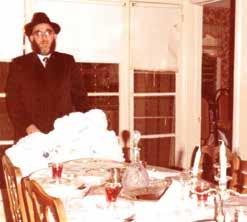
ting up the Seder table, I was able to go to Rabbi Lowe’s Shul to bake matzos. This was the first and only time I ever did that. Before yom tov, I rushed home, ran to the mikveh, and hurried off to shul. The Seder was wonderful but somewhat shorter than usual. We were all extremely exhausted and very tired.
I davened at Atzei Chayim the next morning, and our Seder was beautiful that evening. We were more alert, and the kids participated with extra enthusiasm. The next morning, I went to the Agudas Yisroel Shul of Rabbi Avrohom Teichman, and Pesi planned to come with the children for Mussaf. My cousin Eli Rubin had invited us for the day seudah. I was a bit baffled when Eli seemed surprised that I had come to his shul. We figured out the misunderstanding soon enough. He invited us for the second “days” of Pesach, and I thought he meant the second “day”! He apologized and said they were not prepared for guests that morning. I ran back home after leining to prevent Pesi and the kids from taking the long walk to shul in vain. We put together a seudah and had a good laugh about the confusion. On motzei yom tov, we took the kids for a drive up the Santa Monica Hills where we were treated to magnificent views of an illuminated Los Angeles at night.
Chol Hamoed Pesach of 1984 did not allow for much activities with the children. Friday was a short day, and Sunday was erev yom tov. This is why we planned to stay an additional week after Pesach. (I do not remember how we worked it out with schools, but I am sure we made some arrangements.) Our only full day of chol hamoed was Thursday, and our destination was Anaheim, California. For those who do not know, Anaheim is home to Disneyland! To spend a day in Disneyland was every child’s fantasy, and we were going to make that dream come true.
We entered the park at 11:30 in the morning and did not leave until 9 o’clock at night. This amusement park was tru-


ly fascinating, and our girls were overwhelmed with excitement the entire day. We experienced almost every attraction, and we joined our kids on most of the rides as well. The most exciting ones were
built around the film industry. Though Mechel was not feeling well and had some fever, we felt that the girls needed some entertainment and went anyway. We prepared everything at home for the last days
On motzei yom tov, we took the kids for a drive up the Santa Monica Hills where we were treated to magnificent views of an illuminated Los Angeles at night.
the Matterhorn Bobsled, Pirates of the Caribbean, Haunted Mansion, Space Mountain, Mad Tea World, It’s a Small World, Enchanted Tiki Room, Jungle Boat, and SS Columbia, among others. At one point, there was a musical parade with all the Disney characters like Mickey and Minnie Mouse, Donald Duck, Goofy, etc. It was a special day for our children, and we reveled in their joy.
On Friday, we stayed home, and Shabbos was very relaxing. Sunday, we decided to go to Universal Studios, a theme park

first night’s seudah, Pesi and I went to the house of the Rebbetzin of Rav Hershel, z”l, for a tisch which included spirited dancing around a puddle of water in a reenactment of Krias Yam Suf. Pesi watched from the women’s section. The next afternoon we visited some friends from Boro Park who had come for Pesach to their parents.
Shemini Shel Pesach I went to Rabbi Lowe’s shul. I wanted to try a different shul and meet new people. I had a good experience, and everyone was welcoming and friendly. Then I met Pesi and the children at Eli Rubin’s house. We had a beautiful and sumptuous seudah and spent hours afterwards just talking and reminiscing. Our mothers were first cousins as well as dear friends, and I always felt very close to Eli as well. We stayed all afternoon and then went to the Agudas Yisroel Shul for Mincha and neilas hachag seudah. Rabbi Teichman asked me to speak about my travels to the Soviet Union. I obliged him by related my personal harrowing experiences and also spoke about the emerging baal teshuva movement in Russia.
Motzei Pesach we started to gear ourselves for an overnight trip to San Diego. We packed our clothing and food and prepared perishable foodstuffs in the refrigerator. We left the house in the Pesach mode, which we would undo upon our return. We all went to bed with an air of anticipation for our upcoming expedition.
of yom tov, which started that evening, so we only started out at 11:30 a.m. First, we went to some shows, e.g., The Stunt Show, Conan & Swords, Animal Talents and the Screen Test Show. We also took a twohour tour of the studio where films are made, and it was enlightening as well as extremely entertaining even for the children. Mechel was a bit kvetchy, but we did everything to make him comfortable.
The last days of yom tov were very pleasurable for us. Most of my tefillos took place at the Atzei Chayim Shul. After the
Hershel Lieber has been involved in kiruv activities for over 30 years. As a founding member of the Vaad L’Hatzolas Nidchei Yisroel he has traveled with his wife, Pesi, to the Soviet Union during the harsh years of the Communist regimes to advance Yiddishkeit. He has spearheaded a yeshiva in the city of Kishinev that had 12 successful years with many students making Torah their way of life. In Poland, he lectured in the summers at the Ronald S. Lauder Foundation camp for nearly 30 years. He still travels to Warsaw every year – since 1979 – to be the chazzan for Rosh Hashana and Yom Kippur for the Jews there. Together with Pesi, he organized and led trips to Europe on behalf of Gateways and Aish Hatorah for college students finding their paths to Jewish identity. His passion for travel has taken them to many interesting places and afforded them unique experiences. Their open home gave them opportunities to meet and develop relationships with a variety of people. Hershel’s column will appear in The Jewish Home on a bi-weekly basis.




By Malkie SchulMan

Aleeza Ben Shalom, acclaimed matchmaker, dating coach and author, has a clear message for the Jewish single community: your bashert is out there.
“It’s not if, but just when and how will you find them,” she maintains.
Although Aleeza seems to be a natural at matchmaking, it wasn’t always her focus, certainly not on this scale.
“I was a stay-at-home mom with two young children living in Philadelphia who needed some adult interaction. A friend suggested I get involved in matchmaking.”
From doing chessed a few hours a week on the website Saw You at Sinai in 2007, Aleeza has transformed her efforts into a more than full-time matchmaking and coaching busi-

ness. This includes a series on Netflix, a podcast called “Matchmaker, Matchmaker” and two books— Get Real, Get Married and her latest, Matchmaker, Matchmaker Find Me a Love That Lasts. The typical age of her clients is between 25 and 45 years old, although recently, 50-70-year-olds have started to reach out.
Aleeza explains that mentorship and coaching are her favorite parts of the process and that’s mostly how her business started. Gradually, she developed a comprehensive training system for coaches and matchmakers, eventually expanding her team.
“Today, our team includes five coaches and five matchmakers. We also collaborate with the 500 volunteer matchmakers on Saw You at Sinai.”
One of her team’s signature coaching programs is
called Soulmate Clarity – is this the one or are you done? Soulmate Clarity is a program designed to help people get out of relationship limbo and gain clarity on whether to continue with a relationship or walk away. The program is a 30-day process that goes through five phases to move from confusion to clarity. It also includes a “Soulmate Clarity Report Card,” which helps clients understand where they’re at in the relationship and what steps are needed to progress to an engagement (or not).
To complement her coaching work, Aleeza and her co-host, Rabbi Yisroel Bernath—dubbed “The Love Rabbi”—have released over 50 podcast episodes, each exploring a dating-related question to help listeners have a smoother dating experience.
“We take one dating-related question that we usually answer within 10-12 minutes,” Aleeza explains. Some of the topics they’ve covered include, “The Difference Between a Nice Guy and a Kind Guy,” “Dating Disasters: When ‘No’ Isn’t Clear Enough,” and “Why is Finding Love So Hard for Me?”
Originally, Aleeza notes, she only worked with religious Jews. After all, who else is typically interested in a shidduch date?
“75% of my clientele were frum when I first started and 25% secular, but because of the Netflix series, Jewish Matchmaking, it’s now the opposite percent,” she observes. “The frum numbers stayed the same but now the secular population interested in shidduchim is growing.”
Jewish Matchmaking came about because of the popularity of the Netflix series called Indian Matchmaking. The producers saw the ratings go up and said, “Wow, we have a brand here.” And so, they decided to run a season on Jewish matchmaking. They approached a young Jewish matchmaker in Seattle who didn’t feel she was the best candidate but recommended her friend, Aleeza.
“When I was told casting was going to call,” Aleeza says, “I thought , I want to do this I really want to do something big for the Jewish people.”
Aleeza signed the contract in 2021, filming took place in 2022, and the eight shows in the series were released in May of 2023.
“Actually, because of the October 7 war, it’s a miracle that it happened at all,” she maintains. “If the war had happened first, given the challenging political situation, I’m not sure the show would have come out.”
After the attack on Israelis at the Nova festival last year, Aleeza received numerous calls from what she calls “October 8 Jews.”
“October 7 woke them up,” she says. “Suddenly, their Judaism became important to them. They called to tell me and my team that they’re now dating only Jews.”
Aleeza says the show was meant to be “edutainment,” not pure entertainment, and she is gratified by the kiddush Hashem it created. Initially, she shares, people in the Orthodox community were hesitant about a Netflix series—and for good reason.
“So often, the media and Hollywood misrepresent Orthodox Judaism,” she explains, “but I was impressed with Netflix’s genuine interest in portraying Judaism accurately. They brought on a frum producer, Ronit Polin, which was amazing. The crew truly aimed to represent Orthodox Judaism with authenticity, and I appreciated their effort to be both respectful and thoughtful in their portrayal. They arranged an Airbnb that I could kasher and cook in, and though they continued filming afterwards, they always finished filming me by noon on Fridays.”
The truth is, the series was never intended for the frum community.
“The whole point of it,” according to Aleeza, “was to secure our Jewish future through helping Jews to marry Jews and to be an Ohr Lagoyim (light unto the nations).”
In fact, as some of the individuals who joined the series shared, it was the first time they’d ever dated a fellow Jew which, says Aleeza, just underscores the need for such a show!
The impact of the series extended beyond the participants themselves. Secular Jews reached out to say they appreciated how the team accepts all types of Jews. They expressed their admiration for the concepts it introduced, such as “hishtadlus” (making effort with trust) and being “shomer negiah” (refraining from physical touch between unmarried individuals of the opposite gender), which are familiar to frum Jews.

The idea of being shomer negiah is often a challenging concept for many, Aleeza admits, but surprisingly, many people were open to it. “My suggestion is ‘no touching’ for the first five dates. I received a lot of positive feedback, even from Christians and Hindus. They said, ‘We love your show, we love the values, and we’re trying it too, even though we’re not Jewish.’”
Doing a speaking tour around the world
it and improved as time went on. When we moved to Israel, my husband took a year off to figure out his next steps. Then, the show came about, and he ended up retiring early because my work needed full-time attention. Now, he’s a stay-at-home dad, which gives him the chance to be there for the kids instead of missing out as they grow up.
“Our oldest is 20, and our youngest is 11. When I’m not traveling, I’m very involved. This year, I wake up early with the boys so I can be there for them. It’s about juggling the schedule—it’s a process.”
Aleeza herself did not grow up religious so she knows what the secular experience is like.
“I always loved my Judaism,” she shares, “but my family didn’t practice an observant lifestyle.”
That changed when in her 20s she attended an Israelite retreat.
“October 7 woke them up. Suddenly, their Judaism became important to them. They called to tell me and my team that they’re now dating only Jews.”
Aleeza emphasizes that the biggest challenge wasn’t being an Orthodox Jew but rather the time commitment required by the filming.
“My husband, our five children, and I made aliyah in March 2021, and being away from home for three weeks at a time was difficult. I traveled to Miami, New York, Chicago, Wyoming, and California. I’d never been away for so long, but we learned how to manage
“That’s where I learned that Hashem runs the world. I learned about Shabbos, kosher, prayer and dressing modestly.”
Right after the retreat, even though she didn’t quite know what she was committing to, she decided to take it all on.
“I wanted in,” Aleeza says simply.
Another bonus from the retreat was that it was there that Aleeza met her husband to-be.
“We were both from Philadelphia so after the weekend, we started to date. But then my husband said we need a shadchan, so we called Rabbi Michael Stern, a”h, who was the Aish HaTorah rabbi of Philadelphia. I was newly religious at that point, and my husband had been religious for a few years already. He wanted to make sure I was really on the path.”
The Ben Shaloms celebrated their 22nd anniversary in Cheshvan, ka”h.
When the series began, Aleeza felt strongly that there be at least one religious single couple who could represent the Orthodox point of view. Unsurprisingly, everyone frum turned her down. Until she asked one young woman, Fay, who she knew personally, impressing upon her the kiddush Hashem it would make.
“Fay turned me down twice. Then Ronit, my producer, spoke to her but she turned her down as well.” Finally, Fay said she wouldd ask a shailah. “I thought the answer she’d get would be no but, baruch Hashem, her rav understood what we were trying to do. He encouraged her to do it, pointing out that if she didn’t, there would be no one else to represent Torah Judaism.”
And, in fact, many people were inspired by Jewish Matchmaking. Non-religious matchmakers told Aleeza that they got a boost in their business after the show. The idea of going to a matchmaker has become more normalized in the secular world. After the series finished, Aleeza traveled to over 70 different Jewish communities, speaking to over 20,000 people across
the U.S., England, Argentina, Canada and Israel.
“Last year, I went on tour 12 times each time for a week or two. I only got to unpack half my suitcase, because in another two weeks I was already going to a new place.
“It’s very gratifying when people come up to me and tell me that because of the show, they’re dating someone Jewish.”
Of course, in the matchmaking business, especially on such a global level, Aleeza has her fair share of inspiring stories.
“There was one guy in his 30s whose mom watched the show and told him to call us. Another mother went online and added her daughter to our database. Akiva Gersh, one of our matchmakers, found the girl on the database and set her up with that guy. They’re dating now. He’s in Africa on a special ‘save the world’ mission, and they’ve been traveling to see each other. She decided to move to Africa for a few years to be with him until he finishes his program.”
Winning the lottery usually doesn’t happen, and Aleeza considers winning the shidduch lottery to be when a couple hits it off the first time they’re set up by her team.
“A woman in her late 50s who was traditional, the drive-to-shul kind of person, came to us. She’d been through a difficult divorce so first we had to work with her to overcome her negative relationship associations and open her mind to a new dating experience,” Aleeza recalls. “Afterwards, we set her up with a super nice guy, open and patient. They started dating last summer, and they’re still together.”
Another heartwarming story, shares Aleeza, involved a 36-year-old frum woman who was basically written off by her community. Everybody was giving her advice: “‘Take off your glasses, change your dress style, don’t be so independent and career driven’; they were making her meshuga. I asked her, ‘Do you ever wear contacts?’ ‘No,’ she said. So, I told her to leave her glasses on and stop fighting who she was, a strongwilled individual with a desire to do good things.”
Baruch Hashem, she listened to Aleeza and intensely went into the searching process within her own network. She found someone she was interested in meeting, and Aleeza encouraged her to say yes and see his response.
“Within a couple of months, they were engaged, and I attended the wedding.”
Aleeza observes that some clients face challenges when there is an age gap, particularly when the woman is older than the man. In these situations, it’s often because the younger man wasn’t ready for a relationship earlier. But once he reaches that point and is ready to start dating, both parties may be more open to considering age differences, making those matches possible.
Because they service so many different communities, Aleeza finds it makes the most sense to speak to the individual’s rabbi or mentor rather than her own if there’s an issue.
“We follow the person’s derech,” she explains.

On

But there are certain criteria her team will not violate.
“For example, we will not work with a person that doesn’t have a get. We may coach them to move forward gracefully but will not set them up.”
“They said, ‘We love your show, we love the values, and we’re trying it too, even though we’re not Jewish.’”
help them look and present better. Sometimes, an individual may just need a few pointers on how to make small talk.
Aleeza shares several general matchmaking tips that have proven helpful. One is to “find the mystery in your history.” While it may sound like a buzzword, Aleeza insists it’s valuable advice. She encourages clients to see if a potential match could come from their past.
“We always advise: before moving forward, look back and see if there’s someone you already know, whether it’s someone you dated before, grew up next door to, or even your best friend’s brother who could be a possibility,” she says.
Another key tip, especially for parents, is not to focus too much on matching their child with a family background that aligns with their own, but rather with someone who suits who their child truly is.
“Parents struggle with that, and I understand why,” Aleeza acknowledges, “but it’s important that they don’t get caught up in it.”
For individuals who feel burned out or frustrated with their dating experiences, Aleeza recommends taking a “dating detox” to recharge before returning to the process.
“It’s important sometimes to take a break,” she explains. “Don’t rush the process. We work with our clients to be okay with where they are right now. If they’re still burnt out from previous experiences and jump back into the dating scene, they’re not going to come across well on the first date.”
The length of the break depends on how emotionally drained the individual feels, ranging from a few weeks to a few months.
“When a client doesn’t show up as their best self, the matching will be at a lower level. So, it pays to slow down in order to speed them up.”
Aleeza believes that while not everyone is a matchmaker, everyone has the potential to make a match. Whether it’s a single person setting up a friend with someone they once dated or a parent or married friend making a suggestion, Aleeza’s goal is to get everyone— parents, married friends, and other singles—to aim to make at least one match suggestion each month. Her final tip to singles is to remember that if you feel ready to meet your soulmate, “Maybe they’re stuck in traffic, life, or some other situation, so pray that they be ready, too!”
Everyone has the potential to meet their soulmate, no matter their age, background, or life story.
“That’s the way G-d created the world. People need to remember that marriage is divinely orchestrated and built into the blueprint of Creation,” Aleeza says.
If a client feels emotionally stuck due to trauma, Aleeza and her team will recommend the support of a licensed therapist. For someone lacking confidence, they suggest working with a coach or mentor. For others, they might recommend consulting with a stylist to
Even if someone is divorced or has lost a spouse, they can find a new soulmate. They become soulmates when they stand together under the chuppah.
Aleeza concludes by sharing the blessing she often gives to her clients: “May you meet the right person at the right time, and may both sides have clarity.”



By Eliyahu RosEnBERg
abbi Yitzchak Dovid Grossman stood behind the Jaffa Gate, his heart dancing with pride. Standing in a crowd of 100,000 people, the young rabbi gazed at the Kotel—the most beautiful sight he had ever seen in his life.
To him and the Jewish people, it was like a dream.
In 1948, the Jewish state’s establishment kindled a light of hope for Klal Yisrael. The flame burned brightly until a war in 1967 threatened to extinguish it.
When Iraq, Lebanon, Syria, Jordan, and Egypt joined forces to destroy Is -
rael, the world thought the Jewish state had met its match. It was inconceivable for the tiny state of Israel to defend itself against five Arab giants. Thus, with the light of the Jewish state wavering in the darkness, many Israelis grabbed their passports, fled the country, and began mourning what they thought would be the inevitable destruction of Israel.
We all know what happened next. Six days later, Israel triumphed over its enemies, shocking the nations of the world. It took less than a week for the Jewish state to defeat its five Arab neighbors. The vic -
The Baal shem Tov says that every Jew has g-d inside. if you see him not behaving normally, there must be a reason. Why? Because he’s not in the right atmosphere. a nd so, what is your job? To come, show him love, give him light. Then, you can bring him back.
The most important thing is to love every Jew. We shouldn’t think of Jews as religious, not religious, sefardi, a shkenazi, right, left—all these things don’t exist in the Torah. g-d loves us. a nd g-d wants us to be united.
if you have a ratzon, if you decided that you want to do something – don’t think about if you have money, if you don’t have money, if you can do it, if you can’t do it. if you have a will to do it, you will be successful.
tory was nothing short of a miracle, and the light of Jewish hope and resilience burned brighter than ever before.
A few days after the Six Day War ended, Rabbi Grossman and 100,000 others stood in front of the Jaffa Gate, excited to see the Kotel again. It was at 10 a.m. when the doors of the gate swung open. The crowd rushed out to greet the Western Wall, emotions overwhelming them.
The feelings Rabbi Grossman felt at that moment were unlike anything he’d ever experienced in his life. You had to be there. In fact, he believes he’ll only experience those feelings again when, b’ezrat Hashem, Moshiach comes.
At that moment, as he stood before the Kotel, a feeling of intense gratitude to Hashem overwhelmed the 22-year-old rabbi’s body and soul.
He thought to himself, “What could I do to thank G-d for this miracle?” Born out of that question was a mission.
“The most important thing to G-d is Am Yisrael. The Torah says, ‘Banim atem la’Hashem Elokeichem,’ that the Jewish people are the children of G-d,” Rabbi Grossman shares. “The place that I live now, where I’ve been chief rabbi, is in the Galilee. It’s called Migdal HaEmek. At the time, in 1967, it was a very, very hard place with crime and drugs. They had no jobs. When I stood by the Kotel, I thought, ‘What can I do to be thankful to G-d?’ Then, I said, ‘I will leave Yerushalayim. I will leave the chassidim, leave my family, leave yeshiva, and I will go, for one year, to volunteer in Migdal HaEmek.’”
And so, Rabbi Grossman packed up his things. He and his wife, whom he
had married that year, left behind their home in Yerushalayim and headed to Migdal HaEmek to save the souls of troubled youth.
* * *
He’d read about Migdal HaEmek’s rampant crime in the newspapers, so Rabbi Grossman had some idea of what he was getting himself into. But upon arriving in the city, he was in for somewhat of a shock. For all his life, the rabbi lived in Mea Shearim where, in his words, “every building is a yeshiva.” Thus, he naturally thought that Migdal HaEmek, despite its high levels of crime, would have some yeshivas, too. Needless to say, his assumption was incorrect.
“Excuse me, where’s the yeshiva here?” Rabbi Grossman asked someone after entering the city.
“There are no yeshivas here,” the person responded.
“So where could I find the youngsters?”
“At the disco.”
That encounter left Rabbi Grossman a tad bit bewildered.
“I never heard of a disco in my life,” recalls Rabbi Grossman. “In Mea Shearim, you don’t know what a disco is! I thought, ‘Maybe there’s a new yeshiva called disco?’”
The rabbi headed there. When he entered the disco, flashing red and blue lights nearly blinded him. It was, as he says, “like Purim in the middle of the day.” Girls and boys danced, and loud music blasted. But as Rabbi Grossman stepped onto the dance floor, it seemed as though the music – and the danc -
ing – came to a screeching halt. Everyone stared, shocked to see a rabbi with a beard and peyos standing awkwardly beneath the disco lights.
As Rabbi Grossman jokes, “They were 100% thinking that I was looking for a minyan, kaddish, or, you know, maybe somebody to help me with something!”
The teenagers stared at him like he was from Mars.
“What are you doing here?” they asked him.
“I’ve come here to live with you! You are my brothers. You are my sisters,” Rabbi Grossman exclaimed earnestly.
“You left Yerushalayim to come live here?” they asked incredulously.
Rabbi Grossman, wearing a warm smile on his face, nodded his head yes.
“From the first moment I was there, there was like a magnet between me and the youngsters. They couldn’t believe that somebody would leave Yerushalayim, their family, and the chassidim and come live here,” Rabbi Grossman explains. “I used to go every night to the disco at my corner. And the kids were coming, asking questions, and speaking to me. Then, my home became a ‘disco.’ They’d come to my home, especially on Shabbos night. There was mamash like a magnet between me and the youngsters.”
What started as a year of volunteering wound up becoming Rabbi Grossman’s life. Over fifty years later, Rabbi Yitzchak Dovid Grossman still lives in Migdal HaEmek and serves as the city’s chief rabbi. *
The troubled teenagers gravitated to Rabbi Grossman for one reason and one reason only: they could see that he truly loved and cared for them. Whereas other men with long beards and peyos might have yelled at or criticized the teens, Rabbi Grossman embraced them, showering them in the same kindness as he would his own child.

When one of the residents of Migdal HaEmek mentioned his imprisoned brother to Rabbi Grossman, the rabbi insisted on visiting the jailed man, declaring, “Your brother is my brother.”
Stepping into the nasty prison, Rabbi Grossman saw hundreds of jailed youngsters—Jewish boys imprisoned for bad crimes. It was at that time that the rabbi decided to expand his efforts, spreading the love of Yiddishkeit to the inmates of Migdal HaEmek. He went to the head of the jail and said, “I want to come to this jail twice a week to learn Torah with the prisoners. I don’t ask for money. I’ll volunteer.”
The prison head accepted his offer. And Rabbi Grossman began learning Pirkei Avos with the prisoners.
“Little by little, this learning became a rehabilitation program in jails. Little by little, the government started to see that these people who were learning were behaving differently,” notes Rabbi Grossman. “They were very happy to see the change. And little by little, we built the program up. Right now, we have more than 1,000 prisoners all over the jails of Israel in the program. This program is working. They say it’s the most successful program they have. Around 80% don’t go back to jail. This is the hatzlacha!”
The rabbi went further. On Chanukah, he held a Chanukah party for the prisoners. It was an exciting experience, and as it reached its finale, Rabbi Grossman rose from his seat and spontaneously gave one of the prisoners a kiss. A few days later, the inmate sent the rabbi a postcard.
“Rabbi, I was the prisoner that you gave a kiss to,” the letter read. “I sit in my cell, and I cry. I wanted you to know that that was the first time in my life that I got a kiss from somebody.”
For twenty years, the rabbi kept the letter on his table. The postcard struck a
“The Baal Shem Tov says that every Jew has G-d inside. If you see him not behaving normally, there must be a reason. Why? Because he’s not in the right atmosphere,” declares Rabbi Grossman. “And so, what is your job? To come, show him love, give him light. Then, you can bring him back.”
chord deep within Rabbi Grossman. He couldn’t believe it. How could a 40-yearold man go through his life without ever receiving anyone’s affection? Perhaps that’s the problem.
Rabbi Grossman realized the reason at that moment why so many people live lives of dysfunction and crime: because no one ever cared enough to just give them a kiss or a hug, to love them, educate them, or extend a helping hand.
Rabbi Grossman was already the disco rabbi, inspiring at-risk youth. He was also the creator of a beautiful rehabilitation program for prisoners. But that postcard made him realize that he needed to do more.
“I said, ‘We need to take these kids who never received any love – who come from broken homes – and give them a home and love.’ And from that, instead of going to jail, they can become doctors, lawyers, and rabbis,” shares Rabbi Grossman. “And from that idea, in 1972, I started Migdal Ohr, an institution and movement for children from broken homes. It started with eighteen boys. Today, we have more than 25,000 graduates.”
A once-crime-ridden city, Migdal HaEmek is nothing like it was around fifty years ago when Rabbi Grossman first moved there. Crime is down 90%. The streets, now safe, are filled with Torah. And the once-jobless city is now the “Silicon Valley” of Israel because of all its high-tech companies and factories. Rabbi Grossman transformed Migdal HaEmek. In doing so, he didn’t have money or support from anyone. All the rabbi had was the unshakable will to change the lives of his brothers and sisters.
* * *
Think about a boy who, chas v’shalom, doesn’t keep Shabbos. It’s, no doubt, difficult for his parents to look past their child’s sins and still treat him as a son. But according to Rabbi Grossman, the only way to deal with rebellious children effectively is with patience and love—to make the child feel that he always has a place to call home and parents who care deeply for him.
Some may argue, insisting that being tough is the way to go. But Rabbi Grossman would beg to differ. Because of all the thousands of stories and cases he’s experienced, the rabbi is convinced that, at the end of the day, the children who return home are the ones who have a home to return to.
It’s easy to say, “I love you.” But, at times, it’s difficult to mean it. Rabbi Grossman didn’t win the hearts of Migdal HaEmek’s disco-goers because he said he cares. He won their hearts because they could see it in his eyes that he truly does. There were no lies. There were no ulterior motives. There was just genuine love. And that’s why he was so successful in reaching at-risk teens and prisoners and helping them change for the better. For these individuals, Rabbi Grossman was the first person in their lives who actually cared. And they could recognize that instinctively.
Just as a father wants his children to be united, so too does Hashem, the father of Am Yisrael, yearn for the Jews to get along with one another.
In fact, when we daven to Hashem, we’re supposed to have in mind the mitzvah of v’ahavta l’reiacha kamocha (loving one’s fellow as oneself). Wouldn’t it be more relevant to think about the mitzvah of v’ahavta es Hashem Elokecha (loving Hashem, your G-d) while davening, considering how Hashem is the One we’re praying to? Is the commandment of loving one’s fellow even relevant to prayer? The answer is that Hashem, as our Father, cares more about His children’s relationship with each other than about their relationship with Him. Thus, it is more important to G-d that, while davening, we take upon ourselves the mitzvah of loving our fellow Jew than to accept the mitzvah of loving Hashem.
“The most important thing is to love every Jew,” declares Rabbi Yitzchak Dovid Grossman. “We shouldn’t think of Jews as religious, not religious, Sefardi, Ashkenazi, right, left—all these things don’t exist in the Torah. G-d loves us. And G-d wants us to be united.”
Moderated by Jennifer Mann, LCSW of The Navidaters

Thank you for your thought-provoking column. I was wondering if you could help me with something.
I am 29 and have been dating a really nice girl for the past month and a half. (I’ll call her Adena.) Things are going well. We share similar interests and goals; we respect each other. I can see that she would be a great wife and mother. What worries me is that she seems to like shopping a bit too much and is pretty high maintenance. She invited me to Thanksgiving at her family’s home, and in her room she has a walk-in-closet full of the highest end shoes/ clothing. When we have conversations, she often mentions things she has ordered that she’s excited to get. She also loves going to the mall with friends more than anything.
I make a nice living, but I don’t believe in overspending on things like that. I probably wouldn’t even have noticed this if it wasn’t for my best friend having issues in his marriage due to his wife’s requests for constantly ordering new clothes, watches, jewelry, shoes,etc. He is in kollel and not yet working, so I’m not sure what his wife was thinking to begin with marrying someone knowing it would be a kollel lifestyle and that he was not yet working. I know he can’t keep up and he is very unhappy that he can’t afford the things she wants to spend their limited budget on. I don’t want to end up like that –even if I could afford it, I don’t believe in it.
Are these things I have seen in Adena true issues or am I just overly sensitive based on my best friend’s experience?
Thank you, Naftoli*
Dear Readers, We want to offer YOU an opportunity to be part of the discussion! Please email us at MichelleMondShadchan@gmail.com, subject line “reader’s response,” if you would like to participate in the new “A Reader’s Response” columnist spot. We will send you a question and publish your answer in an upcoming Navidaters edition. Looking forward!
Michelle, the “Shadchan”
Rebbetzin Faigie Horowitz, M.S.
Naftoli, your concern about Adena’s spending and high maintenance are legitimate. It’s smart to put it on the table and discuss it soon. People come to marriage with different patterns, different attitudes, and different histories with money and finances, and these differences are hard to navigate as it is, without it being a surprise. Therefore, consider yourself blessed that you noticed this and see how the conversation goes.
Obviously, you are not going to jump on this difference. Rather, you may want to broach it in terms of family differences, family cultures, history connected with money, etc. Be sensitive and careful yet honest. Talk about yourself and that you are a person who will always live within a budget and why. Talk about your friend’s
experience. Talk about the awareness today of financial education for young people in yeshivos and seminaries. Talk about the organizations that help people navigate the high costs of Jewish life today such as RSK, Mesilah, Living Smarter Jewish, etc. This is a serious issue that must be discussed to see where it goes.
Michelle Mond
You are in a very difficult conundrum.
I am sure that after dating many girls over the course of the last many years, you recognize how rare it is to come so close to finding the right one. It is because of this that I am especially impressed that you are able to look realistically at problems that may potentially arise. It is easy to look at the shidduch with rose-colored
glasses when you are excited. Many young women and men jump quickly to engagement because they are simply excited to get to the next stage rather than honing in on details of compatibility.
The way you describe it, it does indeed sound like the two of you have very different standards of spending and living. It does not matter how much money you make. If you are mindful regarding spending and you have a wife demanding a new Van Cleef bracelet every milestone or constant online shopping sprees, you will end up resentful. The story with your friend heightens your worries because you see how such a mismatch can play out.
You have to talk to Adena as soon as possible about your worries and concerns. Be very honest with her, while remaining caring and compassionate. After having open communication about this topic, you will be a lot more equipped to make an informed decision about how to proceed. Hatzlacha!
Dr. Jeffrey Galler
What you are describing is precisely why it is so important for singles to date long enough and really get to know each other.
It does not matter if you, or her parents, can afford her high maintenance lifestyle. The incompatible problem here is that
she enjoys shopping and spending, while you detest overspending. No amount of pre-marriage communication, compromise, or counseling can succeed in reconciling such a core difference in values.
She might be a wonderful girl and you might be a wonderful guy, but it’s time for both of you to move on and find more suitable partners.
Remember Rudyard Kipling’s observation: “East is East and West is West, but never the twain shall meet…”
Sarala Cohen
When it comes to spending, it all comes down to budgeting. You need to make sure to spend within your means and set aside money for emergencies, simchas and whatnot. It would probably be good to talk about finances before getting married so you’re both on the same page. There are ways if one is thrifty to have nice clothing and the fancy brands and to get them at a much cheaper price.
With your friend, it sounds like there were unrealistic expectations when heading into his marriage. But with Adina, if she is indeed the future wife that you see will be the one, you need to be able to sit down and have a mature and open discussion about finances and shopping budgets.
Dear Naftoli, Thank you for writing! Your dilemma is understandable and valid. The short answer is that communicating with Adena is going to be your best bet. Before a couple gets engaged, they need to speak about a whole host of topics and ideas to see if they are generally compatible, share similar goals and values and if they are all-over aligned. This may or may not be a deal breaker.
The most important thing to look out for in any type of conversation is kindness and respect and validation around a subject matter that is dear to your heart. Should Adena tell you that this lifestyle is deeply important to her and she can’t imagine living without it, you will have an important decision to make. Should Adena tell you that she is open to hearing what you have to say, makes you feel heard and understood (and you to her as well), and is willing to compromise in a way that makes you both feel comfortable, then there is a path forward. Though completely natural, try not
to look too deeply into your friend’s marriage to make decisions about your own relationship. It is quite possible that your friend is in the place he is in because he and his wife did not communicate before marriage, or he doesn’t know how to make boundaries and express himself, or that she is not interested in his comfort, or that she has a shopping addiction. We simply do not know.
My hope is that you will open up to Adena and talk. You will have more information once you do.
All the best, Jennifer
NY. To set up a consultation or to ask questions, please call 718-908-0512. Visit www.thenavidaters.com for more information. If you would like to submit a dating or relationship question to the panel anonymously, please email JenniferMannLCSW@gmail.com.
dating and relationship advice.

By Etti Siegel
Iwas visiting a second grade math class in my role as a teacher’s coach, ready to help the teacher with clarity of instruction during a lesson. I made myself as comfortable as I could on a decidedly uncomfortable student’s chair and watched as the teacher raced around the room giving out a worksheet she had created specifically for this lesson. I did not think much of the fact that the children who received the math sheet first were taking out scissors and beginning to cut up the page until the teacher went back to her desk, looked at the class, and I saw her face fall.
“Girls,” she said exasperatedly, “Morah did not tell you to cut anything!”
I quietly excused myself and went to a different classroom, giving her space to deal with this small hiccup without my presence causing her undue stress.
But the question remained: Why did her students, who adore her and want to behave perfectly for her, cut up a math sheet they were given?
The teacher was a very skilled graphic designer and loved creating her own sheets for the class. This time, she designed the page with a dotted line design.
Dotted lines usually mean “cut here,” and so her students did.
When we met, I explained that clear instructions would have prevented the whole fiasco in the first place. Children want to do what is right, so tell them beforehand!
This is something every adult should do whenever embarking on a journey, educational or otherwise, with anyone!
For example:
“Alright everyone, we’re heading to the park today! We’ll be driving there for about 15 minutes, and once we arrive, we’ll have a picnic lunch under the big oak tree. After that, we can play on the swings and slide, and maybe even explore the little wooded area near the playground. Remember to bring your water bottle and wear comfortable shoes for walking and running!”
Key points to include when giving information to kids about where they’re going:
• Destination: Clearly state where you’re going (e.g.,

“the park,” “the beach,” “the zoo”).
• Travel time: Give a rough idea of how long the journey will take (“about 20 minutes in the car”).
• Activities: Mention what activities you plan to do there (“play on the swings,” “build sandcastles,” “look at the animals”).
• Important items: Remind them to bring necessary things like water bottles, snacks, sunscreen, or hats.
• Simple language: Use clear and easy-to-understand words appropriate for their age.
• Visual aids: Consider using a map or pictures to show them the location and route if needed.
Since time immemorial, children like to know where they are going, when they will get there, and what will happen when they get there.
It would have been so helpful if the teacher would have started the lesson holding up the math sheet and said, “Okay, girls, it’s that wonderful time of day when we get to do math. I am going to give you a math sheet that will help us understand the type of math problem we are going to be working on today. When you get this sheet (holding it up to show the class) please write your name on the top line and then turn it over, white side up. When everyone has a sheet, Morah will instruct the class to turn it back over.”
She shares the destination (math), the time and activities (write your name and turn it white side up, and when everyone gets one, we will turn it back over), and she uses simple language. By holding it up, she adds the visual aid for those children who comprehend better with that assist.
It sounds so obvious and simple, right? But in class after class, and outing after outing, I notice teachers and parents who don’t remember the simple fact: Since time immemorial, children like to know where they are going, when they will get there, and what will happen when they get there.
In classrooms, that means writing the schedule on the board for the day, holding up sheets and booklets while explaining what will be happening and what the children are expected to do, and giving over our expectations before going to an assembly or even before having recess.
In our homes, it means giving a five-minute “heads-up” that supper or bedtime is coming up so children can wrap up what they are doing. It means explaining and reminding children of the steps needed for the event (“please put your plate and cutlery in the sink when you are done”).
I see children at the supermarket having meltdowns and I feel sorry for them and for their parents, but I also wonder if the children were given the heads-up (we are going to the supermarket and you will be allowed to help Mommy put the food we need into the cart, but we will not be choosing any nosh today/ we will only be choosing one nosh today) so they know what to expect.
Let’s provide clear and concise instructions before starting any activity or assignment or going to any specialty or assembly, ensuring students fully understand what is expected of them by outlining the task, key steps, deadlines, and any specific requirements, while also checking for comprehension to avoid confusion and maximize student success.
Let’s tell children of all ages where they are going before buckling them or herding them into the car, and give them a clear understanding of the time, destination, and what will happen while there. (Letting them know how long they will be staying is wise, too.)
Children like to know where they are going, when they will get there, and what will happen when they get there –so let’s tell them!

Many noted the irony. Last Thursday, families throughout the United States sat down together for a family meal to express thanks for all they have. Hours later, they got up and proceeded to shop excessively, buying some items necessary and others less so.
This is the time of year when consumerism is at its highest. My inbox is inundated with sales being announced – all limited time only so I had better rush. The kids are not immune, and they share with each other their latest desired item, all hoping their parents will be in a generous mood.
Our community isn’t exempt, and the kids are making their lists of preferred Chanukah presents. No matter how many times we may remind them, they still fail to fully grasp that gift giving is not a Chanukah chiyuv.
I’m not against taking advantage of the good sales prices. With the many expenses of a frum family, it is wise to purchase needed items when the price is lower. Kids are continuously outgrowing their clothing and destroying their shoes. Household items need replacing, and there is a never-ending “to buy” list for each household. Enjoy the sales and
By Sara Rayvych, MSEd

ensure your family has all they need. Rather than denounce the steep sales, I wanted to bring up a discussion on some of the ways current consumerism relates to our children.
It’s shocking to hear the ever-increasing list of “needs” today’s child has. Even young children know which companies are status symbols. A simple sweatshirt with the “right” logo can cost tens more than a standard one. One of my older kids remarked, “You can get the same sweatshirt at Store X for much cheaper and better quality.”
I hear the kids listing companies I’ve never heard of. This one makes fancy socks, another the sweatshirt everyone owns, and yet another has the ideal makeup. I don’t think we even heard of these companies five years ago. They are not nicer or better quality. The clothing is only desirable because it carries a particular logo with a matching exorbitant price tag.
The kids must realize what a sickness this is because they will tell you which item has “gone viral.” As kids, we had the “in” thing, but it was never to this degree
or as widespread. With the increase in social media (and all media), children are being continuously influenced. Individuals – often with no qualifications other than popularity – are telling the kids what item they “need” to own. These children then pass on the knowledge to other children they meet. It’s so widespread that even homeschooled children without social media access are aware of the latest fad.
I want to stress that these items are not popular because they’re better quality or function better than the competition. They are desirable simply because the children are led to believe everyone has it.
Gishmei Bracha
On that same day the main shopping frenzy began, there was a major rainstorm. I had just finished working out – contorting my body into painful positions that were probably good for me –when some workout buddies and I looked out the front door. As we saw sheets of drenching rain, we hesitated to leave knowing we’d instantly be thoroughly soaked. Remembering the recent drought warnings, a friend sent up a “thank you” to the Provider of all rain as we took a
moment to appreciate the blessing of water. With that gratitude in our hearts, I hurried out to my van that was parked too far away. It would take hours for my clothing to dry, but it served as a reminder of the bracha we had received.
With so much to be grateful for in our lives, it is truly sad that we miss out on these “small” sources of happiness. We complain about the rain until we have a drought. The weather is too cold, too hot, or too wet. There are so many opportunities to feel gratitude and appreciation in our lives. Taking the time to experience these feelings (and share it with our children, when appropriate) can help pass on this wonderful middah.
Like most areas of life, balance is important. The question is finding the perfect balance. Sadly, just when you think you found it, something changes. Parenting involves periodically checking in to make sure we are still properly meeting each child’s needs.
It’s unhealthy for children to receive every new shtick. We could make a list of each new thing that has come and gone over the past few years, laughing at the
waves that came and then quickly left. The list of wants just increases, and the same child will soon lose interest and no longer be happy with that once coveted item. As Chazal teaches, one who has one hundred desires two hundred. There is no end to the list of new narishkeit, and it’s not doing a chessed to feed into the insanity. Additionally, this leads to unfair financial strains on families. With expenses soaring, purchasing luxurious fad items is not within the means for many. The same item can be purchased at a far more reasonable price point from a normal retailer. It’s unreasonable to expect families to pay the extra expense that comes with having “the right” brand name. As more and more children walk around with these expensive items, the pressure increases on more financially challenged families.
For many children, the need to fit in and elevate their status is what pushes them to desire these items. Many of these viral items are plain- or ugly- looking, yet the fame and price tag make the child feel
Despite all the previously mentioned negatives, it’s also unwise to deprive a child. A child that never gets anything may become desperate and hyper-focused on acquiring what they can’t get.
Occasionally getting a treat may be helpful in preventing a child from reaching this point.
I want to differentiate between items that are inherently problematic versus those that are simply foolish. There are clothes and other items that are unacceptable to a family’s hashkafic or halachic standards; examples may include shirts with offensive words or that are too tight (for either gender). This is in contrast to something such as a simple sweatshirt that meets all halachic requirements yet is simply overpriced or “branded.” It’s better to “give in” on something that otherwise meets your family’s standards.
There are options for parents who would like to allow their child to have some of these items without all the “give me”s; I’d like to include a few of these possibilities. One option is to purchase
Our children need to appreciate who they are and their unlimited worth –regardless of their shoes, bags or socks.
important owning them. Sadly, for many children, the desire behind these items is because of feelings of inferiority.
Our children need to appreciate who they are and their unlimited worth – regardless of their shoes, bags or socks. It takes years to build this feeling of selfworth, and teens – in particular – are known for being focused on fitting in among their peers. Still, this goal should be in our minds.
We also need to help our children appreciate their peers, whether or not they own the latest shtick. Just like our children should never be judged by the brand name of their clothing, our children should learn to be as generous with the kavod of others.
Some of these items are makeup or other items designed to make someone more “attractive.” It’s truly sad that our beautiful youth are struggling to appreciate how their Creator made them. This, too, is a long-term goal that doesn’t emerge immediately, but it still needs to be on our radar.
the item as a birthday (or other occasion) gift. Another idea is to allow the child to pay for it themselves. By saving up and earning towards something special they will naturally have a greater appreciation for it. Children can also earn the item as a prize for accomplishing a special goal. Perhaps the child needs encouragement to attend minyan on time, study a challenging subject, or some other longer term goal. This, too, allows the child to appreciate the item and feel good about owning it.
Ensuring our children have all they need while also meeting their emotional needs is tricky. Educating our children to value both themselves and others takes years of nurturing, but with Hashem’s help will yield beautiful dividends.
Sara Rayvych, MSEd, has her master’s in general and special education. She has been homeschooling for over 10 years in Far Rockaway. She can be contacted at RayvychHomeschool@gmail.com.


By Aliza Beer MS, RD, CDN
As winter settles in, many of us are battling colds, flu, fever, and aches. This demonstrates the importance and crucial need for a strong immune system to fight off the seasonal bugs. How can we keep our immune system strong?
There are many different foods that are rich in specific nutrients that play an important role in immunization. Foods rich in antioxidants, essential vitamins, herbs, and proteins are all great options. Making sure that your diet is properly filled with these options can keep you feeling strong and healthy throughout the chilly season.
Antioxidants boost your immune system by protecting your cells from damage caused by harmful molecules called free radicals. Free radicals are unstable molecules produced during normal metabolic processes or due to environmental stressors. These molecules can damage cells, proteins, and DNA in a process called oxidative stress, which weakens the immune system. Antioxidants neutralize free radicals, preventing them from causing harm and stabilizing their reactive nature. Antioxidants also keep immune cells healthy and function well, reduce inflammation, and support the repair of damaged tissues. This helps your body fight infections more effectively and stay strong against illnesses.
Including these foods in your winter diet can make a big difference:
• Green Tea: It is packed with catechins, a type of antioxidant known for its disease-fighting properties. Green tea is a comforting winter beverage that can help ward off colds and physically keep you warm!
• Berries: Even in winter, frozen

blueberries, raspberries, and strawberries retain their high levels of antioxidants like anthocyanins. You can sprinkle the frozen berries into your
tem by helping your body produce more white blood cells, which fight infections. It also protects these cells from damage, reduces inflammation, and strength -
Vitamin C boosts your immune system by helping your body produce more white blood cells, which fight infections.
yogurt or oatmeal in the morning or cook them with other fruits to make a delicious compote.
• Dark Chocolate: In moderation, dark chocolate with at least 70% cocoa provides flavonoids, another type of antioxidant that supports immune health.
Vitamin C
Vitamin C boosts your
ens your skin, which acts as a barrier against germs.
• Citrus Fruits: Oranges, grapefruits, clementines and lemons are great examples of citrus fruits that are rich in vitamin C.
• Bell Peppers: Surprisingly, red bell peppers contain more vitamin C than oranges and can be roasted or tossed in a salad for flavor and texture.
• Kiwis: These small fruits are packed with vitamin C and are perfect for a refreshing dessert or snack.
Herbs and spices not only add flavor to your meals but also contain compounds that enhance your immune response. They boost your immune system by providing natural compounds that fight inflammation, protect cells from damage, and help your body combat infections.
• Ginger: Ginger is known for its anti-inflammatory and antioxidant properties. It is perfect in teas, soups, or even grated into baked goods.
• Garlic: This herb contains allicin, a compound that boosts the immune system and helps fight off infections. You can easily add it to your soups, poultry, meat, or roasted vegetables.
• Turmeric: This spice, with its active compound curcumin, has powerful anti-inflammatory and immune-enhancing effects. You can use it in soups, on roasted veggies, and hot drinks.
Vitamin E boosts your immune system primarily because it is a powerful antioxidant that protects cells, including immune cells, from damage caused by free radicals. This protection keeps the immune system functioning effectively. Additionally, vitamin E enhances the activity of T cells, a type of white blood cell that plays a key role in identifying and destroying pathogens. It also helps regulate other immune processes, improving your body’s response to infections. By supporting cell membranes and preventing oxidative stress, vitamin E strengthens your immune defenses, especially in older adults, whose immune systems naturally weaken with age.
• Leafy Greens: Kale, spinach, and Swiss chard are full of vitamins C, A, and E. Use them in hearty soups, stews, or salads.
• Sweet Potato: Sweet potatoes provide moderate amounts of vitamin E alongside beta-carotene (a precursor to vitamin A). The combination of these nutrients offers strong immune support. The vitamin E in sweet potatoes helps protect your cells from oxidative damage, while beta-carotene supports the skin and mucous membranes, your body’s first line of defense against germs.
• Almonds: Besides for the large amount of vitamin E that almonds have, they also contain healthy fats that support the absorption of fat-soluble vitamins, further boosting immunity.
Protein
Protein boosts your immune system by providing the amino acids needed to create immune cells, antibodies, and enzymes that fight infections. It also helps repair tissues and maintain the strength of immune barriers like skin and mucous membranes, keeping your body better protected from germs.
• Lean Meats: Chicken and turkey are rich in protein and zinc, which helps your immune system work efficiently. Chicken soup is a great option that is quite flavored and keeps you hydrated.
• Legumes: Lentils, chickpeas, and beans are excellent plant-based protein sources packed with nutrients like zinc and iron, which support immune health.
• Eggs: High in protein and selenium, eggs can be made in many different forms and are perfect for winter breakfasts.
Fatty fish contain ample amounts of healthy omega-3 fatty acids, which can enhance immune function. Omega-3s may help to reduce inflammation and could increase your body’s ability to ward off illnesses.
• Salmon: Salmon is rich in omega-3 fatty acids to reduce inflammation and support immune cell function.
• Tuna : Tuna contains vitamin D and selenium, helping regulate immune activity and protect cells.
Meal Suggestions
Breakfast
• Scrambled eggs with sautéed spinach and a side of kiwi slices.
• A bowl of plain Greek yogurt topped with blueberries, slivered al -
monds, and a drizzle of honey with a cup of green tea.
Lunch
• Lentil soup with garlic, turmeric, and ginger, served with a leafy green salad with kale and a citrus vinaigrette.
• Grilled salmon with Brussels sprouts and mashed sweet potatoes sprinkled with fresh parsley.
Dinner
• Grilled chicken and quinoa salad with garlic and olive oil.
• Garlic-onion soup and seared tuna with broccoli and sweet potatoes.
Snacks
• Oranges
• Red bell peppers with hummus
• Cocoa roasted almonds
Chicken Soup
Chicken soup, also known as “Jewish Penicillin,” is a comforting and nutrient-rich remedy often associated with boosting immunity and easing cold or flu symptoms. It helps keep the body hydrated while providing essential nutrients like protein, vitamins, and minerals that support overall health. The soup’s heat can help thin mucus, relieving nasal congestion and promoting easier breathing. Ingredients like chicken and vegetables contribute to the anti-inflammatory properties, which may help alleviate symptoms like a sore throat and reduce inflammation. Chicken also contains cysteine, an amino acid that supports immune function, while the vegetables add antioxidants and immunity-boosting vitamins such as C and A. Beyond its physical benefits, the warmth and flavor of chicken soup provide a sense of comfort, reducing fatigue and promoting recovery during illness. By focusing on these immunity-boosting foods, you can nourish your body, stay healthy, and strong throughout the winter. Fill your meals with antioxidants, vitamin C, Vitamin E, protein, fish, herbs, and spices. A strong immune system is the best way to approach this season!
Ingredients
• 1 tablespoon extra virgin olive oil
• 1 yellow onion, chopped
• 3 carrots, chopped (about 1 cup)
• 3 celery stalks, chopped (about 1 cup)
• 2 garlic cloves, minced
• 1 teaspoon dried thyme
• 5 cups of water
• 1½ cups fresh or frozen green beans, cut into 1-inch pieces
• 1-pound boneless chicken breasts
• 1 tablespoon fine sea salt
• ½ teaspoon of ground black pepper
Instructions
1. In a large pot, heat the olive oil over medium heat and sauté the onion, carrots, and celery until softened, about 8 minutes. Add garlic and thyme and stir for another minute.
2. Add water, green beans, chicken, salt, and pepper. Bring to boil, cover the pot, and lower the heat to simmer for 15 minutes.
3. Check on the chicken by lifting it out of the pot and testing it with a meat thermometer. When the temperature reaches 160ºF, you can use the tongs to remove the chicken and let it rest for 5 to 10 minutes, so it can finish cooking and reach a safe internal temperature of 165ºF.
4. Use two forks to shred the chicken, or cut it into small, bitesized pieces. Return the chicken back to the soup pot and adjust any seasoning to taste. You can add 1 more cup of water, for extra broth, or add in a squeeze of lemon juice, to help brighten the flavor. Ladle the soup into bowls and garnish with freshly chopped parsley.
5. Leftover soup can be stored in an airtight container in the fridge for up to 4 days.
Recipe found at https://detoxinista.com/wprm_print/chicken-vegetable-soup
Aliza Beer is a registered dietitian with a master’s degree in nutrition. She has a private practice in Cedarhurst, NY. Patients’ success has been featured on the Dr. Oz show. Aliza can be reached at alizabeer@gmail. com, and you can follow her on Instagram at @alizabeer

By Eliyahu RosEnBERg

TJH: Let’s rewind a bit. Can you give me some background on how Dr. Fluency got started?
David Harris: When dealing with dysfluency, which could be stuttering, stammering, or cluttering –any disruption of fluent speech – it turns out there was no viable solution. People would spend years and years doing speech therapy and were getting nowhere. Even if they’d experience partial improvements, relapse was inevitable. It turns out that there was a missing component: this problem, just like many other problems, needed to be technology based.
It’s kind of like hearing problems. Back in the day,
people were branded deaf and dumb because, if you couldn’t hear, you couldn’t develop the ability to speak. But in the 1970s, there were emerging computer technologies where people could speak into a microphone and get visual feedback of whether they were making a shh sound or fuh sound, and that’s how they were able to learn how to speak. Until then, they only had sign language. But in the ‘70s, these children were learning how to speak, and now with amazing implant technology they can really hear.
So, it seems there are certain problems that can’t be solved without technology. And it was the same with
Twenty years ago, a recovering stutterer teamed up with a software engineer to finally create an effective therapy to treat dysfluency – stuttering, stammering, and cluttering – thus allowing anyone to achieve fluent speech. Born from their efforts was Dr. Fluency, a program that leverages ai technology to treat the condition. so far, the award-winning program has granted 2,500 patients in israel the gift of fluent speech. and just recently, the program expanded to the Five Towns.
l ast week, TJh interviewed one of Dr. Fluency’s founding members: software expert in the field of computer recognition and CEo of Fluentech David harris. During our discussion, we touched on Dr. Fluency’s humble beginnings, how the program works, and the causes and side effects of stuttering, among other topics.
stuttering and dysfluency, where it turns out that, in order to overcome this problem, going once a week to a speech pathologist is useless because what you need to do is relearn how to speak correctly. Dysfluency can be defined as a loss of control. What do I mean? The person knows what he wants to say. When you’re speaking to someone who stutters, he knows exactly what he wants to say and exactly how to say the word, but sometimes when he tries to say the word, he blocks; he loses control and he can’t get the word out. That could lead to a whole slew of side effects, which we will discuss later. But the real prob -

lem is that he’s losing control.
And when a person loses control, the only way to solve the problem is to rebuild that control, and that requires technology. Without the feedback from The Dr. Fluency tablet computer, the AI-based technology that we developed, you’re not going to be able to learn how to speak correctly.
It’s kind of like learning how to play the piano. The piano teacher has to have a piano to teach you. And when you go home, you must have a piano or at least a keyboard to practice what you learned during the lesson. Now, imagine if the boy doesn’t have a piano at home. He’ll go once a week to his teacher trying to learn how to play, but he won’t have the means to practice it at home. It would be a waste of time. Now, the current situation in speech pathology is that the teacher himself or herself doesn’t even have a piano but is still trying to teach a kid to play the piano.
Can you expand on that?
When you go to a speech pathologist, and they don’t have the necessary technology, trying to learn how to speak correctly will be a waste of time. Without a real piano, you cannot teach a kid to play the piano. And going home, if he doesn’t have a piano, he has nothing to practice on. So that’s how Dr. Fluency is, like my brother Eli who is CEO of Dr. Fluency USA calls it: “the piano for stuttering.”
With our program, the speech pathologist has the technology to teach you the correct techniques: how to breathe correctly, how to use your vocal cords correctly, how to use your articulators correctly, the amount of pressure to apply—you constantly get feedback from Dr. Fluency that is telling you all the time if you’re doing it correctly or not. So, without this technology, the speech pathologist can’t administer effective therapy, and the patient won’t have the correct tools to practice at home correctly to actually create and establish his abilities and make the therapy effective.
So, the program is like the piano that you need to be able to practice what the speech pathologist shows you in sessions. I can understand how important that is in order to make real progress. How did you get involved in this program?
As software professional whose expertise is computer recognition, artificial intelligence, and voice recognition, I was teamed up with a fellow who actually did
turn this therapy into a computerized system. The investors matched him up with me, and the rest was history.
We started twenty years ago. We recently opened up Dr. Fluency USA in the Five Towns and Brooklyn, and we have already successfully treated 25 patients here. In Israel, there have been 2,500 patients that we’ve treated successfully. On our website, you can see hundreds of them coming to our annual conferences. At the end of the year, we hold an annual conference where the graduates and the parents come, and after a quick review of the year with the clinical staff, the patients’ families and people from the professional community join us, and the patients, from young kids to seniors, get up and speak in front of the crowd of usually 150 to 300 people. So all those people on our website are talking in front of a tremendous crowd of hundreds of people.
That’s super impressive – public speaking in front of such a large audience! Tell us how the program works.
Basically, it’s a 15-stage course where you’re learning different targets. We’re learning the different elements of speech such as how to breathe correctly, how to use the voice and the vocal cords correctly, and how to use one’s articulators correctly. Basically, we’re learning how to speak from scratch. This is a process that requires hundreds of hours of practice; nobody is going to sit with their speech pathologist for hundreds of hours. And it turns out that the human ear isn’t sensitive enough. We won’t even know if this person is doing the exercises correctly, while the Dr. Fluency technology will immediately tell the patient if he did it correctly or not and give specific feedback for each and every syllable so that the person can, next time around, correct and constantly improve.
“After a minute and a half of not being able to get his name out, he tapped his father on the knee to say his name for him.”
intensive therapy at a hospital in Israel, where they had specialized equipment. They were able to teach him in a three-week intensive course how to speak correctly. Turns out, he was speaking beautifully after three weeks of intensive therapy. But going home, he was instructed to practice half an hour a day, but he didn’t have the correct feedback and the tools to see if he was practicing correctly or not. And sure enough, three months later, even after daily intensive practice, the stuttering was back. So, he came up with the idea to
If you’re practicing half an hour a day, you’ll complete the course within two, three months. We’ve had people who were more anxious to get through it, and they practiced for a few hours a day, and they completed the course within a couple of weeks. Of course, if you slack off with your practice during that first critical year, then you might experience a certain amount of relapse. But the beautiful thing is that, within a couple of weeks of good practice, you’ll be back on the horse.
So, they use Dr. Fluency to brush up after they meet with the speech pathologist?
Well, the speech pathologist will teach them what to do using Dr. Fluency. And then, they go home with their own personalized tablet and practice with that. The Dr. Fluency tablet will give them feedback if they’re practicing correctly what they learned in the session. By the way, when they come back a week later, unlike with the piano teacher who has to take your word for it, here, every single exercise is recorded, and the speech pathologist sees exactly what transpired during that week: how much you practiced, when you practiced, how successful you were. We see everything.
What causes dysfluency? Is there a psychological component to stuttering or stammering?
They don’t know much about the disorder itself. But
what they have come up with is…that it’s very similar to most neurological disorders. They know it’s transferred genetically, just like many other problems in the human body. They’ve actually pinpointed the specific genes that cause the problem. And if something is genetic, you also know that this is not a psychological disorder.
However, dysfluency does have a tremendous psychological impact on the person suffering from this problem. Because, as you know, speech is our most essential component. Communication is the most essential component of the human psyche—of our nefesh. So, when someone has trouble speaking and conveying their message correctly, that’s going to have a tremendous impact on them psychologically.
So, it’s the opposite of the stigma – a speech disorder isn’t caused by psychological phenomena, but it can have a psychological impact on the sufferer. And it’s a very cruel stigma.
The speech system happens to be the most complex system, motorically, in the human body. You’re activating over 200 muscles when you speak, even if you’re just sitting down… The problem is that these people lose control over those 200 muscles, and they can’t get the word out. Now, eventually, they’ll regain control and be able to say that word, but at the most critical moment, they lose control, causing them to block.
Take stuttering, for instance. What’s stuttering? It’s when you repeat syllables. A child might come up to you and say, “Me, me, me, me, me, me, me, me, also.” So, you might think that he stutters because he’s repeating that “me” sound. But why is he actually doing it? He’s trying to say, “Me, also.” He says “me,” but the word “also” gets stuck in his throat. His vocal cords lock up, and he can’t get the word out. What is he going to do? He’ll put it in reverse and try again. “Me” – block again. “Me” – block again. “Me” – block again. Until he can finally break through. So, what you’re actually hearing is not the problem. They think he has a problem with the word “me.” No – the word “me” is coming out great! His problem is the next word that you don’t even hear because it’s stuck in his throat. It’s this tip-of-the-iceberg effect, where what you’re hearing and seeing is just the tip of what’s hiding beneath the surface.
By the way, there are a lot of side effects. Many kids, when they block, they’ll apply pressure to try to get the word out. That could lead to facial contortions, head jerking, eye blinking, and body twitching. It’s so frustrating – you’re trying to get the word out, you’ll do anything to get it out! Other kids will use filler words like “uh” or “like” until the word comes out. Many kids will take this whole problem in the opposite direction. They’ll develop a very rapid speech rate because when the kid knows he’s going to block, he wants to get as many words in while he can. He may also swallow and slur his words…
So we don’t treat stuttering. We don’t treat cluttering, which is fast speech. We don’t treat stammering, which is the pressuring of words out and blocking. Because all of these are side effects. We treat the dysfluency. When parents come in, the first thing we do is a full free eval to make sure that there really is a fluency issue.
Despite the title, this is not a miracle cure. This is hard work. It’s half an hour a day for a whole year—not because it takes a year to improve (the improvement will come very quickly if you spend half an hour a day within a couple of
months). The problem is that that’s not enough to improve your speech permanently. You also have to keep up the practice to A) turn it into second nature; and B) maintain your progress.
Is the program generally easier for younger people than for older patients?
It’s a double-edged sword. On the one hand, someone who’s very young might be less motivated and may have trouble being consistent. And then it’s going to be the parents who are actually doing the course, so they will
You probably have so many heartening stories from dealing with thousands of patients in Israel and quite a few in the United States. Is there a specific story you’d like to share with readers?
There are two stories that I’ll tell you. The first is of a 15-year-old boy, a Vizhnitz chassid, who was blocking on every single syllable when I originally met him. And a couple of months later, he was speaking fluently. And half a year in, he was made Purim Rav in his yeshiva! It turns out he’s a very funny boy, but nobody knew that because he couldn’t complete a sentence. And now he’s melamed in cheder
“Without this technology, the speech pathologist can’t administer effective therapy, and the patient won’t have the correct tools to practice at home correctly to actually create and establish his abilities and make the therapy effective.”
have to be very motivated. On the other hand, when you treat someone who’s 18, 50, or 70, you’re dealing with life habits that are much more powerful and more entrenched. So, catching it at an early age is tremendously valuable, although the challenge will be that the parents will have to be much more dedicated than with older children.

The other story is of David, a boy who we met a year ago here in New York. When I met with him, he would block terribly. And then the words would burst out of his mouth. And you’d ask, “What?” And then he would start all over again. When he walked in, and we started the assessment with the speech pathologist, we asked his name. And after a minute and a half of not being able to get his name out, he tapped his father on the knee to say his name for him. When I asked how old his sister was, he held up both hands to tell me that she was ten.
After finishing the program, he’s now trying to get accepted to a very prestigious college. He put together a resume, and he has a podcast now. He originally couldn’t say his name, and now he’s doing a podcast!
Any last thoughts or ideas that you want to share with the readers?
Don’t give up. I know that people have tried everything. There are so many charlatans out there who take advantage. There are so many well-meaning speech pathologists who don’t really have the tools and the ability to help. But don’t give up.
I’ve had tremendous nachas from doing this. You know, coming from high tech, I’ve had opportunities for a much better parnassah than I make now. But I’ve never experienced a better way to make a parnassah. My brother always kids that I’m invited to more bar mitzvahs and weddings than his rabbi in shul!
It’s amazing nachas. Just hearing from the boys who, for the first time, gave a presentation in class, got up to be chazzan, got an aliyah; the bar mitzvah boys who were giving drashahs they never dreamt they could do. Or kids going out on shidduchim and being able to say a simple thing like “Harei at mikudeshet li ,” which was something they feared their whole life. To experience with them their sudden ability to do things they never dreamt of—is an amazing zechus. It’s mamish a life saved, every single time. Even when it’s just your quality of life or being able to fulfill your full potential, it’s a whole new level of living.
By the way, we also urge professionals in the field and family and pediatric MDs to contact us as we are happy to provide more info face-to-face. And we often give talks to educational staff – providing enlightening info regarding this problem for perplexed educators who don’t know how to deal with a child suffering from this problem. Our website is chockfull of info and hundreds of videos of our patients speaking at the conferences and being interviewed. I do suggest anyone dealing with the problem or professionals to visit the site at www.drfluencyusa.com and contact us for further information and set up a meeting.


More Food You Love is currently hitting bookstore shelves wherever Artscroll books are sold. It’s a sequel to Food You Love by Rorie Weisberg published in 2022. In this sequel, Rorie has co-authored with Sara Goldstein to bring you, well…MORE! TJH spoke with Rorie and Sara to hear more about the inspiration behind their latest book.
What inspired you to start this second cookbook together, and how did you approach it as a team?
Rorie: Since Food You Love: That Loves You Back was published in 2022, I kept getting so many requests for more recipes. Eventually, I knew I would just have to write a sequel. But I also knew I couldn’t do it alone. Thankfully, I had worked with Sara for years and knew she was the partner I was looking for. And sure enough, working with her took this sequel to the next level. We did everything as a team: brainstormed each recipe, tested and retested it, tweaked it, and styled it, with our complementing visions bringing everything together.
Sara: I’ve worked with Rorie for probably 10 years. She brings such a personal touch to everything, and her mission to create food that helps people live better lives is inspiring. She believed in me when I was just starting out, and over the years, I’ve learned so much from her—especially when it comes to thinking outside the box with health-focused ingredients. I’ve seen how much her food and mindsets have impacted my own life, so I was excited to team up to bring that to others, too.
What do you think makes your cookbook stand out in today’s market?
Rorie: Ah, great question! There are so many amazing kosher cookbooks, and there are so many amazing health-food cookbooks – just check Amazon. Food You Love and More Food You Love are the perfect cross-section of the two. On the kosher end, they are bursting with inspiring, elevated, family- and guest-worthy recipes for every occasion, and on the health end, every recipe is made with wholesome ingredients that support your body. But here’s where the real magic happens: The food in these cookbooks doesn’t scream “healthy.” It screams “delicious.” And it just happens to be good for you, too.
How do you approach creating new recipes?
Sara: I loved brainstorming with Rorie, because she has such a deep understanding of food and health and a seemingly endless store of creativity! In general, recipe development starts with inspiration—whether it’s from a seasonal ingredient or a dish I’ve tasted somewhere. Then there’s the layer of adapting it to match the Full ‘N Free approach: basically, using unprocessed ingredients that are good for you. Once we’ve narrowed down a concept, I get to work in the kitchen, testing and tweaking. It’s a creative process, but it also requires a lot of precision to make sure it’s 100% repeatable.
Can you give us a day-in-the-life snapshot of how it was to work together?
Rorie: I always say cookbooks are a labor of love — and I say labor in every sense of the word. But just to give you a small taste: Imagine, every time you cook something, jabbing notes and snapping photos and videoing your hands and
Whatsapping all of that to someone. For a year. We lived in each other’s brains!
Sara: Once we had all the recipes ready, I started cooking and photographing. Two or three days a week were book days, which for me meant cooking good food and photographing it all day. Rorie was on call to pitch in with ideas, direction, and feedback throughout. Meanwhile, she was busy doing the rest of the work that I could never have done: the health education section, overall editing, marketing strategy, you name it. We each focused on where we shone.
What do you hope readers will take away from your cookbook?
Rorie: That you can eat the foods you love with ingredients that love you back!
Hashem gave us our bodies as a gift, and it’s our task to nurture that gift –lovingly, caringly – in the best way we know: through wholesome eating, sleeping, hydrating, exercising, and embracing positive, affirming messages that motivate us to make the most of every day. Food – delicious, freeing food – is one part of the puzzle of a healthy lifestyle. My deepest hope is that readers use this cookbook as a tool to nourish themselves and their families and live their most vibrant lives.
Rorie Weisberg, INHC, founded Full ‘N Free to empower women to change their habits and transform their health. Her cookbooks, better-for-you baking essentials, and online courses are all tools she’s developed to help make a Full ‘N Free lifestyle doable and delicious for women across the globe.
After training as a kallah teacher in 2022, Rorie expanded her focus to helping young women establish their homes on the foundations of halachah, hashkafah, and hormonal health. To learn more about Rorie and her books, baking products, courses, and lectures, visit www.fullnfree.com or join the @ fullnfree community.
Sara Goldstein is a certified culinary chef who trained in classic French and Middle Eastern cuisine at the Jerusalem Culinary Institute. She now runs a freelance business that combines her passion for culinary arts with her experience in marketing, providing recipe development, food styling, photography, and videography that showcase the uniqueness of individual products and entire brands.
On her popular food blog, Sara shares her passion for beautiful, delicious food that looks gorgeous while showcasing ease of preparation. To learn more about Sara or to explore partnership opportunities, visit www.tomatoestomahtos.com or follow @tomatoes_tomahtos.
Meat
Yields: 3-4 servings
If you’ve ever walked into a shawarma place, you know how irresistible fresh, hot, fragrant shawarma can be. This recipe brings that same experience right into your kitchen. The secret’s in the spice blend — a delicious combination that creates that Mediterranean pungency that packs the inimitable shawarma punch. Best part? Fifteen-minute dinner, coming right up!
Ingredients
>> 1½ lb. boneless chicken thighs, cut into 1-inch-thick pieces
>> ¼ cup olive oil
>> 2 tsp cumin
>> 2 tsp paprika
>> 1 tsp allspice
>> ¾ tsp turmeric
>> 1½ tsp sea salt

>> ¼ tsp cinnamon
>> ¼ tsp garlic powder
>> 1 onion, thinly sliced
Serving Suggestions
>> Hummus
>> Pickled red onions
>> Shredded red cabbage
>> Sliced Persian cucumbers
>> Cooked quinoa
>> Cilantro or parsley leaves
Directions
Preheat the oven to 450°F. Line a sheet pan with parchment paper.
In a bowl, combine olive oil, cumin, paprika, allspice, turmeric, salt, cinnamon, and garlic powder.
Add chicken and onions, tossing to coat evenly.
Spread in a single layer on prepared pan, making sure the pieces do not overlap.
Bake until the chicken is cooked through and the onions are slightly caramelized, about 15 minutes.
Serve with desired accompaniments.
Note: Alternatively, serve shawarma over rice or stuffed in lettuce cups with Israeli salad.

By Naomi Nachman
I recently recorded a few episodes of my cooking show Sunny Side Up on Kosher.com for the winter season. I had as my guest singer Dobby Baum, and we made her easy family recipe for chicken and potatoes. I loved how it all gets cooked together in one pan for a complete meal.
◦ 4 chicken legs
◦ 2 onions, cut in half moons
◦ 2 cubes frozen garlic
◦ 1/3 cup olive oil
◦ 1 cup white cooking wine
◦ 2 large potatoes, cubed and peeled
◦ 1 sweet potato, cubed and peeled (or an additional regular potato)
◦ Salt, to taste
◦ 1 teaspoon pepper
◦ 1½ tablespoons onion powder
◦ 1½ tablespoons garlic powder
◦ 1 tablespoon paprika
◦ 1 cup water

1. Preheat oven to 450°F.
2. Place onions to cover the bottom of the pan. Add garlic cubes and oil.
3. Place chicken legs on top of the onions.
4. Add the cubed potatoes and sweet potatoes into the pan.
5. Sprinkle with salt and spices. Add in 1 cup water. Cover the pan and place in the oven for one hour. Lower the temperature to 375°F and bake for another hour.
Naomi Nachman, the owner of The Aussie Gourmet, caters weekly and Shabbat/ Yom Tov meals for families and individuals within The Five Towns and neighboring communities, with a specialty in Pesach catering. Naomi is a contributing editor to this paper and also produces and hosts her own weekly radio show on the Nachum Segal Network stream called “A Table for Two with Naomi Nachman.” Naomi gives cooking presentations for organizations and private groups throughout the New York/New Jersey Metropolitan area. In addition, Naomi has been a guest host on the QVC TV network and has been featured in cookbooks, magazines as well as other media covering topics related to cuisine preparation and personal chefs. To obtain additional recipes, join The Aussie Gourmet on Facebook or visit Naomi’s blog. Naomi can be reached through her website, www.theaussiegourmet.com or at (516) 295-9669.

By Warren Buffett

In an unexpected letter released last week by billionaire Warren Buffett disclosing that he recently gifted another $1.4 billion to his foundation, the Berkshire Hathaway Chairman discusses what he intents on leaving to his children and imparts sagely parenting advice, especially as it relates to money and a succession plan.
The gifts I am making today reduce my holdings of Berkshire Hathaway Class A shares to 206,363, a 56.6% decrease since my 2006 pledge. In 2004, before Susie, my first wife, died, the two of us owned 508,998 Class A shares. For decades, we had both thought that she would outlive me and subsequently distribute the vast majority of our large fortune. That was not to be.
When Susie died, her estate was roughly $3 billion, with about 96% of this sum going to our foundation. Additionally, she left $10 million to each of our three children, the first large gift we had given to any of them. These bequests reflected our belief that hugely wealthy parents
should leave their children enough so they can do anything but not enough that they can do nothing.
Susie and I had long encouraged our children in small philanthropic activities and had been pleased with their enthusiasm, diligence and results. At her death, however, they were not ready to handle the staggering wealth that Berkshire shares had generated. Nevertheless, their philanthropic activities were dramatically increased by the 2006 lifetime pledge that I subsequently made and later expanded.
The children have now more than justified our hopes and, upon my death, will have full responsibility for gradually distributing all of my Berkshire holdings. These now account for 99½% of my wealth.
Father time always wins. But he can be fickle – indeed unfair and even cruel – sometimes ending life at birth or soon thereafter while, at other times, waiting a century or so before paying a visit. To date, I’ve been very lucky, but, before long, he will get around to me. There
is, however, a downside to my good fortune in avoiding his notice. The expected lifespan of my children has materially diminished since the 2006 pledge. They are now 71, 69 and 66.
I’ve never wished to create a dynasty or pursue any plan that extended beyond the children. I know the three well and trust them completely. Future generations are another matter. Who can foresee the priorities, intelligence and fidelity of successive generations to deal with the distribution of extraordinary wealth amid what may be a far different philanthropic landscape? Still, the massive wealth I’ve collected may take longer to deploy than my children live. And tomorrow’s decisions are likely to be better made by three live and well-directed brains than by a dead hand.
As such, three potential successor trustees have been designated. Each is well known to my children and makes sense to all of us. They are also somewhat younger than my children.
But these successors are on the wait list. I hope Susie, Howie and Peter themselves disburse all of my assets.
Each respects my wish that the disposition program for my holdings of Berkshire shares in no way betrays the exceptional trust Berkshire shareholders bestowed upon Charlie Munger and me. The 2006-2024 period gave me the chance to observe each of my children in action and they have learned much about largescale philanthropy and human behavior. Each has overseen teams of 20-30 for many years and has observed the unique employment dynamics affecting philanthropic organizations.
Wealthy friends have been curious about the extraordinary confidence I have in my children and their possible alternates. They express particular surprise at my requirement that all foundation actions will require a unanimous vote. How can this be workable?
I’ve explained that my children will forever be besieged with earnest requests from very sincere friends and others. A second reality: When large philanthropic gifts are requested, a “no” frequently prompts would-be grantees to ponder a
different approach – another friend, a different project, whatever. Those who can distribute huge sums are forever regarded as “targets of opportunity.” This unpleasant reality comes with the territory.
Hence, the “unanimous decision” provision. That restriction enables an immediate and final reply to grant-seekers: “It’s not something that would ever receive my brother’s consent.” And that answer will improve the lives of my children.
My unanimity clause, of course, is not a panacea – it clearly isn’t workable if you have nine or ten children or stepchildren. And it doesn’t solve the daunting problem of intelligently distributing many billions annually.
* * * * * * * * * * * *
I have one further suggestion for all parents, whether they are of modest or staggering wealth. When your children are mature, have them read your will before you sign it.
Be sure each child understands both the logic for your decisions and the responsibilities they will encounter upon your death. If any have questions or suggestions, listen carefully and adopt those found sensible. You don’t want your children asking “Why?” in respect to testamentary decisions when you are no longer able to respond.
Over the years, I have had questions or commentary from all three of my children and have often adopted their suggestions. There is nothing wrong with my having to defend my thoughts. My dad did the same with me.
I change my will every couple of years – often only in very minor ways – and keep things simple. Over the years, Charlie and I saw many families driven apart after the posthumous dictates of the will left beneficiaries confused and sometimes angry. Jealousies, along with actual or imagined slights during childhood, became magnified, particularly when sons were favored over daughters, either in monetary ways or by positions of importance.
Charlie and I also witnessed a few cases where a wealthy parent’s will that was fully discussed before death helped the family become closer. What could be more satisfying?
As I write this, I continue my lucky streak that began in 1930 with my birth in the United States as a white male. My two sisters had, of course, been explicitly promised by the 19th Amendment’s enactment in 1920 that they would be treated equally with males. This, after all, had been the message of our thirteen colonies in 1776.
In 1930, however, I emerged in a country that hadn’t yet gotten around to fulfilling its earlier aspirations. Aided by Billie Jean King, Sandra Day O’Connor, Ruth Bader Ginsberg, and countless others, things began changing in the 1970s.
So favored by my male status, very early on I had confidence that I would become rich. But in no way did I, or anyone else, dream of the fortunes that have become attainable in America during the last few decades. It has been mind-blowing – beyond the imaginations of Ford, Carnegie, Morgan or even Rockefeller. Billions became the new millions.
Things didn’t look great when I arrived at the beginning of The Great Depression. But the real action from compounding takes place in the final twenty years of a lifetime. By not stepping on any banana peels, I now remain in circulation at 94 with huge sums in savings – call these units of deferred consumption – that can be passed along to others who were given a very short straw at birth.
I am also lucky that my philanthropic philosophy has been enthusiastically embraced – and widened – by both of my wives. Neither I, Susie Sr. nor Astrid, who succeeded her, believed in dynastic wealth.
Instead, we shared a view that equal opportunity should begin at birth and extreme “look-at-me” styles of living should be legal but not admirable. As a family, we have had everything we needed or simply liked, but we have not sought enjoyment from the fact that others craved what we had.
It also has been a particular pleasure to me that so many early Berkshire shareholders have independently arrived at a similar view. They have saved – lived well – taken good care of their families – and by extended compounding of their savings passed along large, sometimes huge, sums back into society. Their “claim checks” are being widely distributed to others less lucky.
With this philosophy, I have lived the way I wanted to live since my late 20s, and I have now watched my children grow into good and productive citizens. They have different views in many cases from both me and their siblings but have common values that are unwavering.
Susie Jr., Howie and Peter have each spent far more time directly helping others than I have. They enjoy being comfortable financially, but they are not preoccupied with wealth. Their mother, from whom they learned these values, would be very proud of them.
As am I.

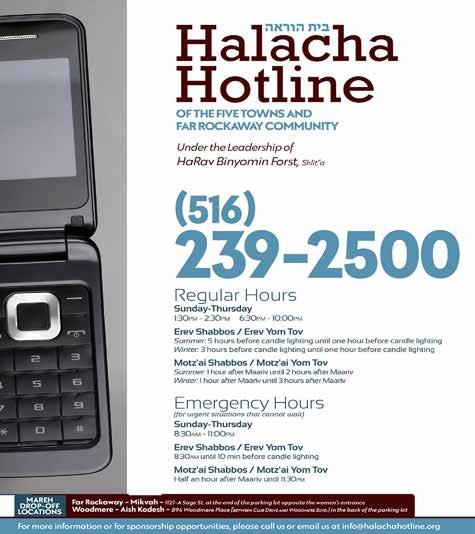

Tammy and I had dinner with Donald Trump. He lives part of the year in New Jersey. I spoke to him Monday to congratulate him
– New Jersey Gov. Phil Murphy (D) at an event this week disclosing that politics is really just a game
He’s a very different animal privately than he is publicly, which is fascinating to us. I spoke to him last Monday to congratulate him.
– ibid.
That’s the game… We say things up on a stage to get people riled up that is at least packaged in a way that is more extreme than they really are.
– ibid.
We are actually good friends, as are our wives.
- ibid.
Hypocrisy isn’t illegal, nor is it particularly unusual in politics. It’s not like he’s ever going to run again, so why not take care of your kid, even if you said you weren’t going to? I respect it. I don’t have a problem with it. The problem is, the rest of the Democrats made Biden’s pledge to not pardon Hunter the foundation of their defense of America.
- Jon Stewart
My views have changed a lot from October 6 until today.
- Louis Har, who was rescued from Gaza several months ago, on a podcast
I don’t trust any of them. I know that in some way, everyone in Gaza is involved. They were born to hate. They are given weapons when they are babies. They’re happy to sacrifice their children to kill Jews. That’s how they live.
- ibid.
To achieve dialogue and coexistence, several generations of proper education in which hatred isn’t taught need to pass. That does not exist. There is no one to talk to. Before I was abducted, I wanted to live in the country in peace and coexistence.
– ibid.


The ICC has decided to delay arrest warrants for Assad, Kim Jong Un, Putin and Khamenei until they become Jewish.
- Tweet by Hillel Fuld
Angola, a vibrant city. Look, not the city. The city, I know, is not Angola. But in Angola, in a vibrant city.
- Pres. Biden speaking in the African country Angola
Never again do I want to hear, “Oh, Donald Trump’s a liar. You can’t believe anything he says. Donald Trump will abuse his power. Donald Trump will only use the system to benefit himself and his family,” and so on and so forth. Never again.
- Conservative commentator Scott Jennings on CNN after Pres. Biden pardoned his son Hunter despite saying many times that he would absolutely not pardon him
It’s a terrible development for the men and women of the FBI and also for the nation that depends on a highly functioning, professional, independent Federal Bureau of Investigation.
- Former FBI Deputy Director Andrew McCabe, who was one of the key figures in the Russia hoax, on CNN decrying Kash Patel being picked as the new director of the FBI


That’s just the California way!
- Senator Alex Padilla (D-CA) on “Face the Nation” saying that California will use taxpayer money on “legal assistance, legal advice, legal support” for illegal migrants
We’re totally powerless.
– Democrat strategist James Carville
“The Resistance” is gonna have trouble raising money. These fundraisers are burnt. They’re really pissed now. And the damage that the 2024 campaign has done – the damage that this decade has done – to the Democratic brand is almost unfathomable.
- ibid.
I’m telling you, without complete transparency, the campaign we think raised a billion and a half dollars. We know that [Political Action Committee] Future Forward, the last we heard was $900 million. So we can assume that they got to a billion before the election. That’s $2.5 freaking billion dollars. Do you have any idea where that money went? Does anybody have any idea where that money went?
- ibid.
Donor’s dollars weren’t just burned — they were incinerated.
- ibid.
This pardon is just deflating for those of us who’ve been out there for a few years yelling about what a threat Trump is. “Nobody is above the law,” we’ve been screaming. Well, Joe Biden just made clear his son Hunter is above the law.
-
Biden Forced To Issue Another Pardon After Hunter Commits 17 More Crimes
– Babylon Bee headline
Trump Announces Plan To Deport 5,000 Illegal Immigrants In One Pre-Owned Honda Civic Hatchback
- Ibid.
These bequests reflected our belief that hugely wealthy parents should leave their children enough so they can do anything but not enough that they can do nothing.
- Warren Buffett explaining in a shareholder letter why his children each received $10 million from his wife’s estate
Father time always wins. But he can be fickle – indeed unfair and even cruel – sometimes ending life at birth or soon thereafter while, at other times, waiting a century or so before paying a visit. To date, I’ve been very lucky, but, before long, he will get around to me.
- ibid.
President Biden has pardoned his son Hunter despite his previous pledge not to, which makes the total amount of promises broken by Biden to…all of them!
- Tyrus, filling in for Greg Gutfeld on Fox
According to a new study, 31% of Americans think that they finally made it—with “it” being “plans to move back in with their parents.”
– ibid.

You cannot say that Israel must be investigated for genocide. Look at my fellow soldiers who died from our unit. They died because we entered Gaza only to search for the terrorists and to protect the innocent. Israel also protects the Palestinians and liberates them from Hamas. Any other country would bomb them from the air and eliminate this threat in one day.
- Rabbi Yosef Garmon, who was the former Chief Rabbi of Guatemala and who served in the IDF, in a meeting with the Pope, who recently claimed that Israel was committing genocide in Gaza
Israel has the capability to end the war in one day and erase Gaza entirely, but it did not act that way and risked its soldiers to prevent the killing of innocents. You should investigate those who call to investigate Israel—not the other way around.
- ibid.
I did not claim that Israel committed genocide. I was shown materials from the war, and I said that if this is true, then it needs to be investigated. I understand what is happening in Gaza. I think Hamas should no longer exist in the world, but the war should also not be prolonged.
- The Pope’s response
It tastes much better than other bananas. Indeed, quite good.
- Justin Sun, Chinese-born crypto millionaire, reflecting on the $6.2 million banana he ate after he purchased it an auction because it was deemed to be art when it was duct-taped to a wall
Yeah, it was a big shopping weekend, and millions of people got great deals, but nobody got a better deal than Hunter Biden.
- Jimmy Fallon
And, yes, Joe Biden did say he wasn’t going to pardon Hunter. But, to be fair, there’s a very good chance he doesn’t remember saying that.
- Jimmy Kimmel
Now, I am not a presidential historian, but I believe this is the first time a U.S. president has pardoned both his son and a turkey in the same week.
- Jimmy Kimmel
I don’t know if it was the right thing to do, but you certainly earned that “World’s Greatest Dad” mug.”
- Stephen Colbert
I am proud to lead…a policy to stop unreasonable noise from mosques, which has become a nuisance for the residents of Israel. In most Western countries, and even in Arab countries, noise is regulated—only in Israel is there lawlessness.
– Israel’s National Security Minister Itamar Ben Gvir
By Martin Oliner

King Solomon revealed his infinite wisdom when he wrote philosophically in the Book of Koheles (Ecclesiastes) about everything in the world having its time.
“Everything has an appointed season, and there is a time for every matter under the heaven,” he wrote. “A time to give birth and a time to die. A time to plant and a time to uproot that which is planted. A time to kill and a time to heal.”
King Solomon ended by saying there is “a time to love and a time to hate; a time for war and a time for peace.”
When Solomon’s words were made popular in American culture via a song performed in 1965 by The Byrds, after the phrase “a time for peace,” the singers added, “I swear it’s not too late.”
President Biden is a proud Irish Catholic who has been known to frequent both churches and synagogues. He is undoubtedly aware of both Solomon’s words and their adaptation by The Byrds.
Unfortunately, he has endorsed the latter version.
In his speech announcing a ceasefire in the conflict between Israel and Hez -
bollah, Biden sounded like he has taken the Byrds’ song way too seriously.
“Today’s announcement brings us closer to realizing the affirmative agenda that I’ve been pushing forward during my entire presidency,” he said. “A vision for the future of the Middle East where it’s at peace and prosperous and integrated across borders; a future where Palestinians have a state of their own, one that fulfills its people’s legitimate aspirations and one that cannot threaten Israel or harbor terrorist groups with backing from Iran; a future where Israelis and Palestinians enjoy equal measures of security, prosperity, and — yes — dignity.”
Biden added that to that end, the United States remains prepared to conclude a set of historic deals with Saudi Arabia to include a security pact and economic assurances together with a credible pathway for establishing a Palestinian state and the full normalization of relations between Saudi Arabia and Israel — a desire they both have.
“I believe this agenda remains possible,” he said. “And in my remaining time in office, I will work tirelessly to advance
this vision.”
Just in case he could still persuade people, Biden repeated it twice more:
“[The ceasefire] reminds us that peace is possible,” he said. “Say that again: Peace is possible. As long as that is the case, I will not for a single moment stop working to achieve it.”
Sorry, Joe, but I swear it is too late.
Achieving Middle East peace by January 20 is not possible. That agenda is not realistic in your last two months in office, so instead of working tirelessly on that, it would be better for you to just get some rest.
Advancing the Abraham Accords and bringing about normalization between Israel and Saudi Arabia was actually a credible possibility at the beginning of Biden’s term. But he apparently hesitated because he did not want to advance the legacy of his predecessor and, ultimately, his successor, Donald Trump.
The key to bringing about such agreements would have been maintaining pressure on the Iranian regime that views Sunni Saudi Arabia as its nemesis in the battle of supremacy in the Middle East. The Biden administration needed
to deter Iran to the point that the Islamic Republic would not have dared to allow its proxies to attack the Jewish State.
Trump is absolutely right when he says that had he been president, there would not have been an October 7 surprise attack on Israel by Hamas. I would add that if Trump had told Iran’s other proxies “don’t” — or used more Trumpian stronger language – they would have not have mocked the man who is supposed to be the leader of the free world and attacked Israel anyway nonstop for more than a year.
As I wrote on these pages not too long ago, it is not too late, however, for Biden to adopt a different agenda, surprise the world, and become the hero of the United States, the Jewish state, and the Jewish people. He could even be remembered in history as the savior of Western civilization.
That would require one extremely urgent and courageous step: Biden must bomb Iran, prevent its nuclearization, destroy all its nuclear sites, and overthrow the evil regime of the ayatollahs forever.
Prime Minister Benjamin Netanya -
hu appeared to hint cryptically that this option was possible in his own cease-fire announcement on Tuesday.
“Why should we have a ceasefire now?” he asked rhetorically in the taped address. “The first reason is to focus on the Iranian threat, and I won’t expand on that.”
Security cabinet minister Orit Struck went further, telling her supporters that she voted for the American-brokered agreement because “from my perspective, this is a tactical ceasefire, which is intended to serve strategic, diplomatic and security goals that cannot be elaborated upon at the moment.”
So is Biden really working with Netanyahu on a secret plan to bomb Iran?
Before we start with any wishful thinking, a good way to check would be
“It is a rare sign of tacit agreement with President Biden’s approach that could produce mutual benefits,” Ward wrote. “For Biden, a legacy-defining foreign-policy win before he departs in January. For Trump, one less global crisis that he will have to handle.”
The state sponsor of Hamas and Hezbollah is unfortunately nowhere to be found in the report about Biden’s strategy for the rest of his term in office.
That means that either Biden is better at keeping a secret than Orit Struck or he won’t be doing what he really needs to do to make the world a better place. The regime that had the audacity to murder a rabbi in the United Arab Emirates is evidently exonerated.
That is very disturbing, but at least
That means that either Biden is better at keeping a secret than Orit Struck or he won’t be doing what he really needs to do to make the world a better place.
to see what Biden’s favorite journalists are writing. Israeli journalist Bark Ravid of Axios, who received an award from Biden, revealed that the president spoke to Netanyahu after Tuesday’s security cabinet meeting and pressured him to make a deal with Hamas.
Ravid reported that “the only topic that came up besides Lebanon was the deal to release the hostages and establish a ceasefire in Gaza.”
Biden himself sounded like he thought the effort against Iran was already over when he said in his ceasefire speech that it was time for Israel to make what he called “some hard choices.”
“Israel has been told on the — has been bold on the battlefield,” Biden managed with difficulty to say. “Iran and its proxies have paid a very heavy price. Now Israel must be bold in turning tactical gains against Iran and its proxies into a coherent strategy that secure Israel’s long-term — its long-term safety and advances a broader peace and prosperity in the region.”
The Wall Street Journal ’s national security reporter Alexander Ward reported that Biden’s surprising Middle East peace strategy is to work with Trump.

the American people elected a president who has proven that he knows how to take action against Iran and will be able to clean up Biden’s blunders. President Trump will stop Iran’s nuclearization, make the Middle East safer, and, just like Reagan after taking over for Jimmy Carter, bring the hostages home.
In Carter’s presidency, hostages were held in Iran. Now they are being held by Iran’s proxies in Gaza. Either way, the Iranian regime needs to be held accountable, and it apparently won’t happen until Trump takes over.
Trump understands that in a dangerous world, there must be a time to kill. Only after that can the true healing take place.
I swear it’s not too late.
The writer is chairman of the Religious Zionists of America, president of the Culture for Peace Institute, and a committee member of the Jewish Agency. He currently serves as a member of the U.S. Holocaust Memorial Council, appointed by Donald Trump during the president-elect’s first term. He is the former mayor of the Village of Lawrence. The views expressed here are his own.

At first glance, the recent reports on Donald Trump’s presidential transition might seem trivial—nothing more than a routine shift from one administration to the next. But beneath the surface, this move represents far more than just a change in political leadership. It marks a profound challenge to the establishment, and it is one of the most significant, yet under-discussed, moves President Trump has made in his ongoing battle with the so-called “Deep State.”
As reported by Newsday and others in the “fake media,” Trump’s transition team is deliberately bucking decades-old protocols that govern how presidential transitions should be handled. Rather than accepting federal funding for office space and equipment or allowing the General Services Administration (GSA) to oversee the process, Trump has chosen to privately bankroll his transition. More controversially, his team

by NYS Assemblyman Ari Brown

has yet to sign an agreement with the FBI to conduct background checks on his Cabinet nominees—a decision that has raised eyebrows in Washington. But while critics focus on these procedural details, they miss the much larger implications of this decision.
The roots of this shift can be traced back to a critical moment in American history: 1963, when President Lyndon B. Johnson established the framework for presidential transitions. This framework, the Presidential Transition Act, was meant to ensure an orderly handover of power. However, what is often overlooked is the context in which this framework was created. The transition of power in 1963 followed the assassination of President John F. Kennedy—an event shrouded in controversy and speculation. Many historians argue that the rapid changes in the structure of government following JFK’s death were not simply about political expediency
but about ensuring that certain powerful factions could exert their influence over the new administration.
This is where the connection to Trump’s decision becomes clear. The establishment of the deep state—a network of entrenched bureaucrats, intelligence agencies, and political operatives—began taking shape after JFK’s assassination. With Johnson’s transition and the resulting changes in how presidential power was consolidated, a secretive network began to permeate every facet of American governance. From the FBI’s internal workings to the sprawling immigration system, healthcare, and beyond, the deep state quietly but powerfully took control. This network became the true engine behind much of America’s foreign and domestic policies, often working in ways that bypassed the will of the people.
When President-elect Trump chooses to buck tradition and privately fund
his transition, he is not just making a tactical political move—he is signaling a direct challenge to this very system. The decision to avoid the traditional oversight mechanisms that many claim are necessary for transparency is, in fact, a strategic maneuver to escape the grip of the bureaucratic leviathan that has controlled Washington for decades. By bypassing the GSA and refusing the FBI’s involvement, Trump is sending a clear message: his administration will not be dictated by the same system that allowed the deep state to flourish. Critics, including those from government watchdog groups and political insiders, argue that Trump’s transition raises concerns over transparency, especially when it comes to donors and influence. But these concerns miss the bigger picture. Trump is not just rejecting the outdated ethics of the transition process—he is revealing how deeply the bureaucratic establishment has infil -
trated every corner of American governance. In a sense, the real issue here is not the absence of FBI background checks or the lack of federal funds for the transition. The true story is that President Trump is shining a light on a system that has long operated behind closed doors, and he’s challenging it head-on.
This is not just about Trump’s presidential transition—it’s about the future of America itself. By making this bold move, Trump is dismantling the very structures that have allowed the deep state to thrive and shape policy in ways that do not always reflect the interests or desires of the American people. It’s a move that represents a shift away from the shadowy forces of Washington and toward a government that is more responsive to the people and less beholden to the entrenched elites.
…And here lies the most crucial point: This transition is not just about Trump’s personal politics; it’s about something much larger. As a New York State Assemblyman, witnessing firsthand the effects of the deep state, I believe that what we are witnessing is the linchpin of a far-reaching transforma-
tion. The forces behind the deep state have permeated every aspect of our society—from the sanctity of our elections to the healthcare system, from immigration policies to the halls of Congress. But with Trump’s defiance of
where government is held accountable, and where the deep state is dismantled. President Trump’s actions—though initially dismissed as a simple disruption to a traditional process—are in fact the first steps toward this massive shift. By
The establishment of the deep state— a network of entrenched bureaucrats, intelligence agencies, and political operatives—began taking shape after JFK’s assassination.
these norms, there is a real possibility for a reformation of how power is exercised in this country.
The truth is, America has been on the brink of a golden age since President Elect Trump’s first term—one where the power of the people is finally restored,

challenging the very system that created and maintained the deep state, Trump is laying the groundwork for an America where the government answers to the people, not the entrenched powers. Friends, patriots, don’t buy into the narrative being sold by mainstream
media. The move that President Trump has made is not a minor one. It’s a statement, one that could very well determine the future trajectory of our nation. If we are to move into the golden age that so many of us hope for, it will be because of moments like these, when a bold leader takes a stand against the forces that have long held power in this country. The deep state may have its roots in the 1963 transition, but with Trump’s current moves, we may be witnessing its final days.
This isn’t just a transition. This is a revolution—one that is long overdue. And history will look back on this moment as the beginning of America’s resurgence.
Assemblyman Ari Brown represents the 20th Assembly District, which includes the towns and villages of Cedarhurst, East Rockaway, Hewlett, Woodmere, Inwood, Island Park, Lawrence and Oceanside, along with the barrier island from Atlantic Beach to Point Lookout. Follow Ari on Facebook or read more on his official website.

By Raja Abdulrahim

For years, Syrian President Bashar Assad was able to beat back opposition fighters with the help of Russia, Iran and Hezbollah. Now, with those allies weakened or distracted by their own conflicts, rebels have seized the opportunity to shift the balance of power.
The rebel fighters spent months training and preparing for a surprise offensive, but even they may not have predicted how quickly they would advance. On Saturday, the rebels said they had captured almost all of Aleppo, one of Syria’s biggest cities, and they now control a broad stretch of land in the country’s west and northwest, according to the rebels and the Syrian Observatory for Human Rights, a British-based war monitor.
The timing of the assault and its success, analysts say, reveal the vulnerabilities of Assad’s once formidable coalition.
The Syrian civil war started 13 years
ago when peaceful antigovernment protests were met with brutal crackdowns, escalating into a conflict between forces loyal to Assad and rebels. Over time, the combatants drew support and foreign fighters from regional and international powers.
Iran, Hezbollah and Russia all sent help to the Syrian military. Hezbollah and Iranian-backed fighters battled alongside Syrian forces, Russia and Iran sent military advisers, and Russia carried out intense airstrikes on rebel-held territory.
But today, Iran has been weakened by Israeli airstrikes, battlefield losses by its proxy forces — the so-called axis of resistance — and an economic crisis at home. Hezbollah, one of those proxy forces, has been battered and diminished after 13 months of war with Israel and the killing of its leader, Hassan Nasrallah. And Russia is now nearing the end of its third year of a war of attrition with Ukraine.
“He was able to survive the civil war because of all the assistance he got, and that’s gone,” Joshua Landis, head of the Middle East studies program at the University of Oklahoma, said of Assad. “Israel has changed the balance of power in the region by going on this all-out war on the axis of resistance.”
“Now Assad is all alone,” he said. Assad’s position was weakened even further by an apparent shift by Turkey, which is allied with many of the rebel groups and had opposed an offensive against the Syrian government.
Since the Hamas-led attack on Israel on Oct. 7, 2023, Israel has increasingly carried out airstrikes on Hezbollah, which began hitting it with rockets in support of Hamas, and Iranian fighters and infrastructure inside Syria. Hezbollah and Iranian forces either went into hiding or withdrew from Syria to fight elsewhere, said Haid Haid, a senior consulting associate fellow at Chatham House, a London-based research institute.
Russia has played perhaps the most crucial role in aiding Assad. Although it is still assisting his government with some airstrikes, it is entrenched in its own war in Ukraine and has pulled much of its military focus away from Syria.
Even with Hezbollah and Iran by its side since the early days of the civil war, the Syrian government still lost its grip on large swaths of territory until Russia directly intervened in 2015. Alongside Syrian warplanes and military helicopters, Russian airstrikes helped turn the tide of the war in Assad’s favor.
Syria’s military historically struggled at urban warfare, but during the intense years of the civil war, its own air power and Russia’s allowed Assad to bomb the opposition into submission. This time, though, “the regime was so much weaker than anyone thought and Russia was almost nowhere to be seen,” said Dareen Khalifa, a senior adviser at the International Crisis Group.
Since last Wednesday, Russia has carried out some airstrikes against the rebels and on opposition-held towns and cities, but they were not overwhelming, according to Haid. “We have not seen the same level of support and intensity of airstrikes that we saw previously,” he said.
In the wake of the assault on Aleppo, Moscow fired its top general in Syria, Sergei Kisel, according to two military bloggers, Rybar and Military Informant, who have ties to the Russian Ministry of Defense.
Within four days, the rebels have drastically changed the front lines of the Syrian conflict, which had remained static for more than four years. And it was events beyond Syria’s borders that set the stage.
Last week, Hezbollah agreed to a ceasefire deal with Israel. The group leading the offensive against the Syrian government, Hayat Tahrir al-Sham, a former al-Qaida affiliate, may have decided that time was of the essence, Haid and other analysts said.
“One of the things that may have pushed them to start when they did was fear that Hezbollah might resend
its fighters that withdrew from those front lines,” Haid said.
But conditions on the ground in Syria also created the crucial conditions for a successful rebel offensive.
Even with his allies embroiled in other conflicts, Assad seemed confident that his own front lines were not at risk. His government had withdrawn
ernment recaptured large parts of the country in recent years. He also failed to unify the country or regain support from a population alienated by years of civil war and the unrelenting violence and terror carried out by the government.
The government also continued to forcibly conscript young men into the military — soldiers who, when faced
“Israel has changed the balance of power in the region by going on this all-out war on the axis of resistance.”
some of its forces there, while soldiers continued to staff checkpoints in government-held territory — often shaking Syrians down for bribes, according to multiple analysts.
Assad has also failed to produce any economic improvement, which many Syrians had expected once the gov -
with a rapidly advancing and organized rebel offensive last week, chose to flee rather than fight.
Leaders of the Hayat Tahrir al-Sham opposition group say they were watching the geopolitical shifts around them — especially the weakening of the axis of resistance by Israel, and Russia’s in-
vasion of Ukraine — and assessing how they could exploit these changes, Khalifa said.
“At the same time,” she said, “they have been building up their military capability over the last year and have been signaling this military offensive over the last two months.”
There were other factors for the rebels to consider as well.
Until recently, Turkey, which backs some of the rebel factions involved in the offensive but has a more complicated relationship with Hayat Tahrir al-Sham, was opposed to an offensive against the Syrian government, Khalifa said.
Turkey also hosts more Syrian refugees than any other country — more than 3 million, according to government figures — and officials have long worried that any new violence near their southern border could set off a new wave of refugees.
But last week’s offensive signals that Turkish officials may have changed their position, Khalifa said.
“All of these things combined made it an opportune time,” she said.
© The New York Times



As the bloodiest century in human history drew to a close, Americans looked back at the catastrophic mistakes that paved the way for World War II and the Cold War. Chief among them: the 1938 Munich agreement, British Prime Minister Neville Chamberlain’s misguided effort to appease Adolf Hitler, and the disastrous 1945 Yalta agreement that partitioned Europe and left the world teetering on the brink of nuclear Armageddon.
At the start of a hopeful new century came a new axiom of U.S. foreign policy: No more Munichs, no more Yaltas.
To which we must add: No more Budapests.
On Dec. 5, the world will mark the 30th anniversary of the Budapest Memorandum of Security Assurances, the disastrous agreement that paved the way to today’s bloody war in Ukraine. As President-elect Donald Trump prepares to negotiate an end to that struggle, he should heed the lessons of Budapest – so he does not repeat them.
After the Soviet Union collapsed in 1991, Ukraine inherited nearly 2,000 nuclear weapons, along with intercontinental ballistic missiles and strategic bombers to deliver them – making it the world’s third-largest nuclear power. So, in 1994, President Bill Clinton brokered an agreement among Russia, Ukraine, the United States and Britain in which Ukraine agreed to give up those weapons. In exchange, Russia pledged to “respect the independence and sovereignty and the existing borders of Ukraine” and to “refrain from the threat or use of force against the territorial integrity or political independence of Ukraine.” Moscow also agreed to refrain from the “threat of aggression in which nuclear weapons are used.” And the United States and Britain gave Ukraine security guarantees, prom-
By Marc A. Thiessen

ising “to provide assistance to Ukraine … if Ukraine should become a victim of an act of aggression.”
Those guarantees proved empty. In 2014, Russian President Vladimir Putin invaded Ukraine and annexed Crimea, in direct violation of the pledges Russia made in Budapest. In the face of this aggression, President Barack Obama’s administration failed to hold up the United States’ end of the bargain, refusing to provide Ukraine with weapons to defend itself. Instead, out of fear that arming Ukraine would provoke Moscow, Obama offered Ukraine only nonlethal aid.
When Trump took office, he reversed Obama’s policy of appeasement and became the first president to provide Kyiv with lethal aid. Trump also got tough on Putin in a host of other ways – imposing crippling sanctions on Moscow, expelling Russian diplomats, launching a cyberattack on Russia targeting St. Petersburg’s Internet Research Agency, giving the green light for the U.S. military to take
out hundreds of Wagner Group mercenaries in eastern Syria and persuading NATO members to increase their defense spending by $400 billion. Result? Putin paused his aggression during Trump’s term.
But after Joe Biden took office, Putin resumed his conquest of Ukraine. In the wake of Putin’s 2022 full-scale invasion, Clinton acknowledged that the Budapest agreement he negotiated was to blame. “I feel a personal stake because I got them to agree to give up their nuclear weapons,” Clinton told Irish broadcaster RTÉ. “None of them believe that Russia would have pulled this stunt if Ukraine still had their weapons.”
What lessons can we learn from the failure of the Budapest accord?
First, Putin does not want peace; he wants Ukraine. He will violate any international agreement Russia signs to achieve his objective. The only way to stop him is to make his objective impossible to achieve. As we have seen, Putin believes he can wait out a strong U.S. president
until another weak one replaces him. If allowed to do so, he simply will use a cessation of hostilities to pause, reconstitute his forces and resume his invasion when the time is right. If Trump wants a peace that outlasts his presidency, that agreement must create conditions that make a resumption of war impossible.
Second, Western security guarantees are worthless unless they are backed up with Western military might. A lasting peace will require that whatever agreement Trump negotiates creates defensible borders, with a demilitarized zone enforced by an international peacekeeping force (made up of European, not U.S., troops). Putin must understand that this agreement is final, and that if he ever tries to resume his invasion, he will not be fighting just Ukraine.
Third, Ukraine must be militarily strong enough to deter Russia. Giving up its nuclear deterrent, and depending on others to protect it, was a mistake. Ukraine will need to create a conventional deterrent so powerful that Russia will never take it on. This means that, even if Trump succeeds in forging peace, the imperative to arm Ukraine will continue. We must find mechanisms to increase the flow of U.S. weapons headed to Kyiv that do not require U.S. taxpayers to bear the cost. If Trump wants to avoid presiding over a historic failure like Budapest, he needs to avoid the trap of trying to appease Putin with promises of Ukrainian neutrality and disarmament. He does not want to join Neville Chamberlain in the pantheon of leaders who promised peace in our time but delivered the opposite. Trump says he wants to prevent World War III. If that is the case, he should do what he did in his first term and secure peace through strength.
2024, Washington Post Writers Group

By Avi Heiligman


The United States remained neutral during the first two years of World War II as it witnessed the Axis powers devastate Europe and many other parts of the world. The Japanese were advancing in China and other parts of the Far East and the Pacific but knew that the United States would need to be defeated in order to complete their conquests. Their bold plan was to strike a devastating surprise blow at the base in Pearl Harbor, Hawaii. The attack came on December 7, 1941, and caused much devastation to the American fleet. However, the Japanese did not sink any of the American aircraft carriers, as they were all out to sea, although the attack awoke the sleeping industrial giant of the U.S. It was a long road for the Allies to defeat the Japanese as the war would last until 1945. During the Pearl Harbor attack, many stories of valor and tales of bravery were told of the survivors and heroes that fought during the surprise assault.
Besides targeting the ships, the Japanese also aimed for installations and airfields. In total, 188 aircraft, close to half of the planes stationed at Pearl Harbor, were destroyed and 155 were damaged. Most of the planes were destroyed on the ground, as they were crowded together in the middle of the airfield. In the days before December 7, the American commander was told to watch out
for sabotage but this left the planes vulnerable to air attack. Still, some planes did manage to become airborne and were able to fight the Japanese. Six pilots were credited with downing at least one enemy plane.
Pilots George Welch and Kenneth Taylor were up late the night before partying and awoke to the sounds of the attack. Quickly, they pulled on their pants and sped towards the Haleiwa Fighter Strip as they dodged ene -
battle with a dozen “Val” dive bombers. Although outnumbered, they shot down three of the enemy planes before returning to base for more ammunition at Wheeler Field. While on the ground, dive bombers began strafing the airfield, but Welch was able to take off. Taylor quickly jumped over the ammunition cart, and both managed to get airborne heading directly towards the incoming enemy planes. On this second sortie, they shot down more planes including
The two pilots soon found themselves as the only American armed fighters airborne among hundreds of enemy fighters, bombers and dive bombers.
my bullets. They phoned ahead to have the two P-40 Tomahawk fighters ready for takeoff. The two pilots soon found themselves as the only American armed fighters airborne among hundreds of enemy fighters, bombers and dive bombers. At first, they saw a group of B-17 Flying Fortresses coming unarmed from the mainland before commencing
an A6M “Zero” fighter. Altogether, the duo had six kills and were awarded the Distinguished Service Cross for their heroic dogfights that brought the U.S. into the war.
There were warnings of the incoming attack, but they were mainly ignored by top American brass stationed at Pearl Harbor. One of those warnings came
from the destroyer USS Ward. The first shots of the battle did not come from the Japanese but rather from the Ward that shot at a periscope near the entrance to the harbor. Under the command of Lieutenant Commander William Outerbridge, the ship was conducting a routine patrol of the harbor on the morning of December 7. The periscope belonged to a Japanese two-man midget submarine which seemed to be tailing a cargo ship. The Ward shot at the midget submarine with its main guns and sank her together with the two-man crew. The incident was reported, but it wasn’t until 2002 that the wreck of the midget was recovered and the Ward ’s story was verified. Exactly three years after the attack, on December 7, 1944, the Ward , converted to a high speed transport, was patrolling the waters off of Leyte in the Philippines when she was hit by a kamikaze suicide plane. The crew was ordered to abandon ship, and she was sunk by another destroyer. The irony of the situation was that the destroyer that sank the Ward was commanded by none other than William Outerbridge. Battleship row was the main target for the Japanese planes, and the air raid caused heavy damage and casualties among the ships and their crews. Some on the battleships fought back while one of the battleships tried to leave the harbor despite being under



heavy air attack. The commanding officer of the USS Nevada (BB-36) was ashore during the assault, and the officer of the deck was Joe Taussig, Jr. Most of the battleships were moored next to each other, but the Nevada was by herself. Despite taking a torpedo hit, the oldest battleship in the fleet was able to get underway. The plane that dropped the torpedo was hit and dropped from the sky seconds later by gunners from the Nevada. Gunners shot down at least three more planes, but the damage she
took from the Japanese was significant. Tugs helped her to shallow water where she settled.
The Nevada was the first battleship salvaged by crews in the months following the attack. Fifty sailors lost their lives on the Nevada , but the casualties could have been much higher. Taussig lost a leg in the attack but refused to be evacuated until his crew moved him against his orders. He was awarded the Navy Cross for his actions that day. Chief Boatswain Edwin J.

Hill from Philadelphia led a small crew ashore to release the massive ship from its moorings. Then he dove into the oily water and swam back to the ship to continue his duties on board. As he was attempting to drop anchor, he was killed by an enemy bomb. He was awarded the Medal of Honor posthumously for his courageous actions.
December 7, 1941, will always be remembered as one of the bleakest days in American history even as the country commemorates 83 years this week since
the attack. This attack brought America into the war that would last until 1945. Many of the heroes and ships present would fight other battles, and these Forgotten Heroes is history to be remembered.
Avi Heiligman is a weekly contributor to The Jewish Home. He welcomes your comments and suggestions for future columns and can be reached at aviheiligman@gmail.com.

VACUUM SALES AND REPAIR
All areas call Max Flam 718-444-4904
THE LEATHER SHOPPE
The spot for all your custom leather Judaica. Tallis/tefillin bags, lulav and esrog bags, havdallah sets, challah covers, shtenders, pesach sets, matzah/afikomen bags. WhatsApp: (732) 523-0007 or email: theleathershoppe732@gmail.com for a full catalog. We ship.
MY MOTTO IS DON’T WAIT TO buy real estate
Buy real estate and wait Your realtor for life 516-784-0856 Alexandra at Realty Connect USA
PEACEFUL PRESENCE STUDIO
Men’s private yoga, Licensed Massage & Holistic Health Guidance 436 Central Ave, Cedarhurst Info. & free video training www.peacefulpresence.com 516-371-3715
GERBER MOVING
FULL SERVICE MOVING
Packing Moving Supplies
Local Long Distance. Licensed Insured
1000’S Of Happy Customers Call Shalom 347-276-7422
HANDYMAN AVAILABLE
For big or small jobs, Sheetrock, carpentry, painting, electrical, plumbing, install & repair appliances Call Ephraim at 347-593-4691
MANAGEMENT STAFF WILL ASSIST
you with: * Obtaining Medicaid and Pooled Income Trust
* In-home Assessments, Individual and Family Counseling
* Securing reliable home care assistance
* Case and Care Management services
Dr. S. Sasson, DSW, LCSW (718) 544- 0870 or (646) 284-6242
HAIR COURSE:
Learn how to wash & style hair & wigs. Hair and wig cutting, wedding styling Private lessons or in a group Call Chaya 718-715-9009
ZEVIZZ WOODTURNING JUDAICA Challah knifes, batei mezuzah, besamim holder, kiddish cups, havdalah candle holders, yad for sefer torah, pens, stenders, bowls and more 952-356-2228
ECO-FRIENDLY CONTRACTOR
Big or small jobs. from conception to completion windows, doors, plumbing, electrical, Kitchen Cabinet countertop. petitions, Bathrooms, tiling. additions , painting, any construction work. call MICHEL 9175383763 Shomer Shabbos
CEDARHURST
Don’t miss this opportunity!
4 Bedroom 21/2 Bathroom House Perfectly located in Cedar Bay Park, walking distance to all. Oversized property for expansion, A Must See. LOCATION, LOCATION. For More Info call (516) 881-7727 Leave Message
WOODMERE
Beautiful, brick, colonial boasting 5 bdr 3.5 Bth in pristine condition. Excellent location, near all! Move right in! RCUSA 516-512-9626
WOODMERE
Introducing a stunning 14-side hall colonial home in the Hewlett Woodmere School District. Formal living room, formal dining room, den with a skylight. Eat in Kitchen, two sinks, a double oven, a warming draw and a microwave. First floor bedroom, a full bathroom and laundry room. Two-car garage. Upper level has four bedrooms, two full bathrooms. Finished basement with playroom, storage and utilities. Well-groomed exterior with porch adjoining the master bedroom. Hardwood floors and back patio. Central air conditioning, inground sprinkler system, alarm system. Close proximity to schools, shopping centers, restaurants, and transportation options. Mark Lipner Associate Broker Berkshire Hathaway Laffey International 516-298-8457 mlipner@bhhslaffey.com
















CAN’T AFFORD YOUR PROPERTY TAXES? MORTGAGE?
Must sell for any reason?
Call for FREE Consultation. Call now 212-470-3856 Cash buyers available!
Spacious home within school district 14 with exquisite upgrades and central air conditioning, splendid kitchen with dual sinks, five bedrooms. Main level encompasses a spacious great room, office space, complementing the formal living and dining areas. Unfinished basement, detached garage. Expansive lot, measuring 80 x 100. Conveniently located near shopping, railroad, restaurants and places of worship. Mark Lipner Associate Broker Berkshire Hathaway Laffey International 516-298-8457 mlipner@bhhslaffey.com



HEART OF CEDARHURST
Entrance off Gourmet Glatt lot, second floor, shared bath, ideal for therapist/ office work, includes utilities, $600. Call 516-371-3715
5 TOWNS - OFFICES FOR LEASE
Attractive Pricing!
Inwood: 1500sf loft office
Cedarhurst: 3 - Office Suite 500sf Also… Large Parking Lot & Storage available
Utilities, Internet & Parking incl. with some
Kosher kitchen - Minyan Next to LIRR - No broker fee
Call/text/Whatsapp: 516-206-1100
SUBLET AVAILABLE
Video Production Space
Fully equipped office on Central Ave includes internet, graphics/editing computers & software. Flexible rates based on space needed. Perfect for creatives!
Contact David Jasse: 917-570-5514
DON’T GET STUCK WITH A TWO STORY HOUSE YA KNOW, IT’S ONE STORY BEFORE YOU BUY IT BUT A SECOND STORY AFTER YOU OWN IT!
Call Dov Herman For An Accurate Unbiased Home Inspection Infrared - Termite Inspection Full Report All Included NYC 718-INSPECT
Long Island 516-INSPECT www.nyinspect.com




SPECIAL ED TEACHER HASC seeks Special Ed Teachers for our Early Learning Program. Warm, supportive and enjoyable working environment. Great Pay and Benefits! Sign on Bonus! Referral Bonus! Please email resume to jobswd@hasc.net
DELIVERY PERSON NEEDED to deliver this Newspaper every Thursday morning to locations in Brooklyn. Must have Mini van or SUVand availability to work Consistently every week. Good pay
Please email gabe@fivetownsjewishhome.com or call (917) 299-8082
SEEKING ELA TEACHER Teaching position for Gr. 6. Mon.-Thurs., afternoon hours. Far Rockaway/5T area. Great salary, warm, supportive environment. Training in our curriculum is provided. Teachersearch11@gmail.com


5 TOWNS BOYS YESHIVA
Seeking Elem Gen Ed Teachers
Excellent working environment and pay. Only lic/exp need apply. Email resume to yeshivalooking@gmail.com
MDS REGIONAL NURSE
5 Towns area Nursing Home management office seeking a Regional/Corporate level MDS Nurse to work in our office. Must be an RN. Regional experience preferred. 2-3 years MDS experience with good computer skills required. Position is Full Time but Part Time can be considered. Great Shomer Shabbos environment with some remote options as well. Email: officejob2019@gmail.com
DEVELOPMENT ASSISTANT
A multi-tasker needed for general office work. The ideal candidate is someone who is detail-oriented, responsible, and can take ownership. Looking for someone who is eager to learn, and expand his/her skill set while possessing the ability to work independently and as part of a team. Experience with Excel required. Five Towns location. In-office position only, not remote. Please send resume to 5tpart.timecareer@gmail.com
YESHIVAT KOL YAAKOV
In Great Neck, NY, is seeking general studies teachers for both the elementary and middle schools, for the upcoming academic year. Mon-Thur afternoons. Competitive salary, warm and supportive environment. Send resume to m.kalati@kolyaakov.org
SEEKING ASSISTANT
teachers for elementary General Studies classes for ‘24-’25 school year. Candidates should have skills to take over for teachers if needed. M-Th, PM hours, strong support. Far Rockaway area. Send resume to teachersearch11@gmail.com
BOOKKEEPER
Excellent growth potential, Frum environment, Excellent salary & benefits. Email resume to: resumetfs1@gmail.com
REGENTS EXPERT
Tutoring regents in Algebra and Geometry A Darchei Torah instructor. Guaranteed results Text 347-491-8045 WhatsApp 347-767-1755
SHMIRAS HALASHON
Text 516-303-3868 with a time slot of your choice to be careful on lashon hara. Be a part of the 1,000 people for klal yisroel!

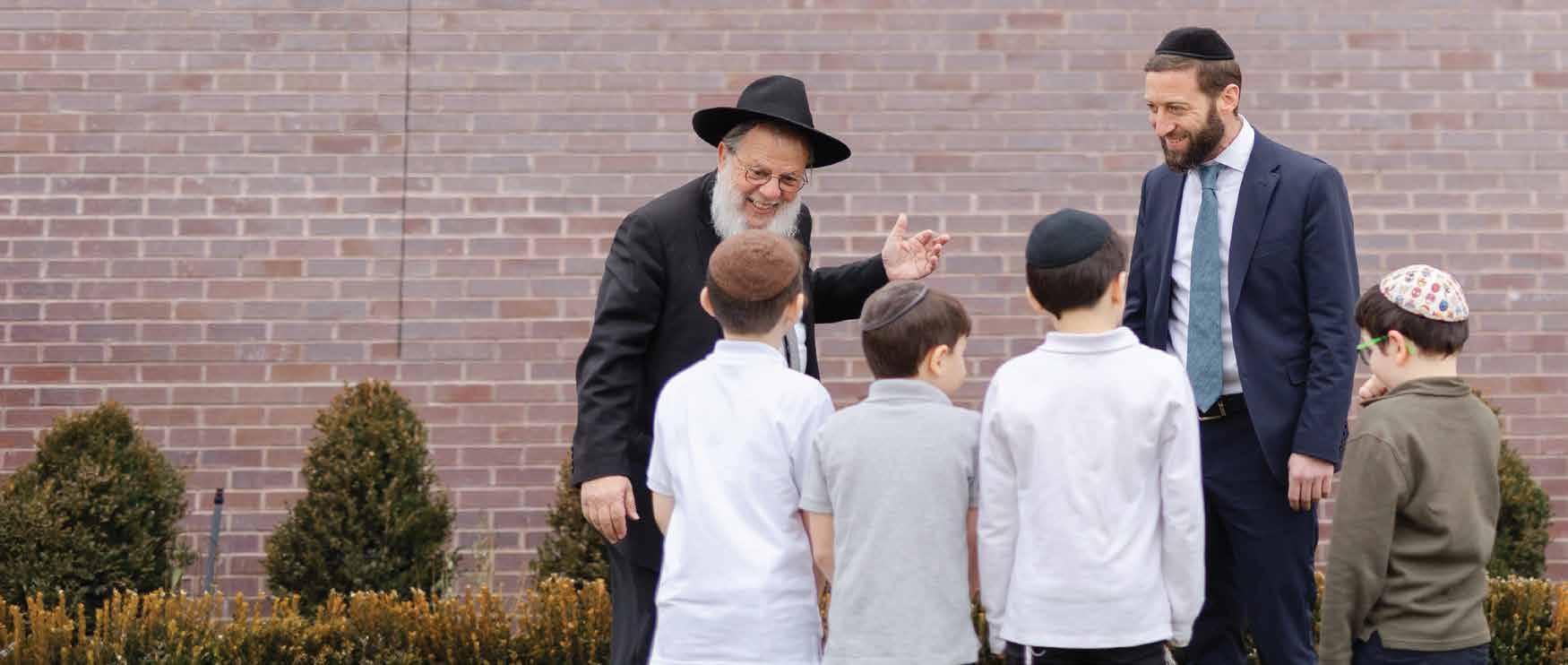



That’s how we maximize each talmid’s growth as a student and an oved Hashem. We know each child’s strengths and weaknesses, and we connect with each boy personally to lift him up. We see the whole picture when making educational decisions, ensuring the bonds between our talmidim and their Rabbeim last long past graduation.
For more information about how we reach every student, contact our admissions coordinator at apply@yoss.org.
Applications are now open for 2025-26! For nearly 70 years, the Yeshiva of South Shore has provided the Five Towns community and beyond with a warm, growth-oriented space where a stellar Torah education fuses with a high-level academic program. YESHIVA OF SOUTH SHORE -
LOUIS AND GERTRUDE FEIL TORAH CENTER P: 516.374.7363 E: contact@yoss.org W: yoss.org 1170 William St. Hewlett, NY 11557
